University of Richmond Bulletin
Vol. XXXIII APRIL, 1931
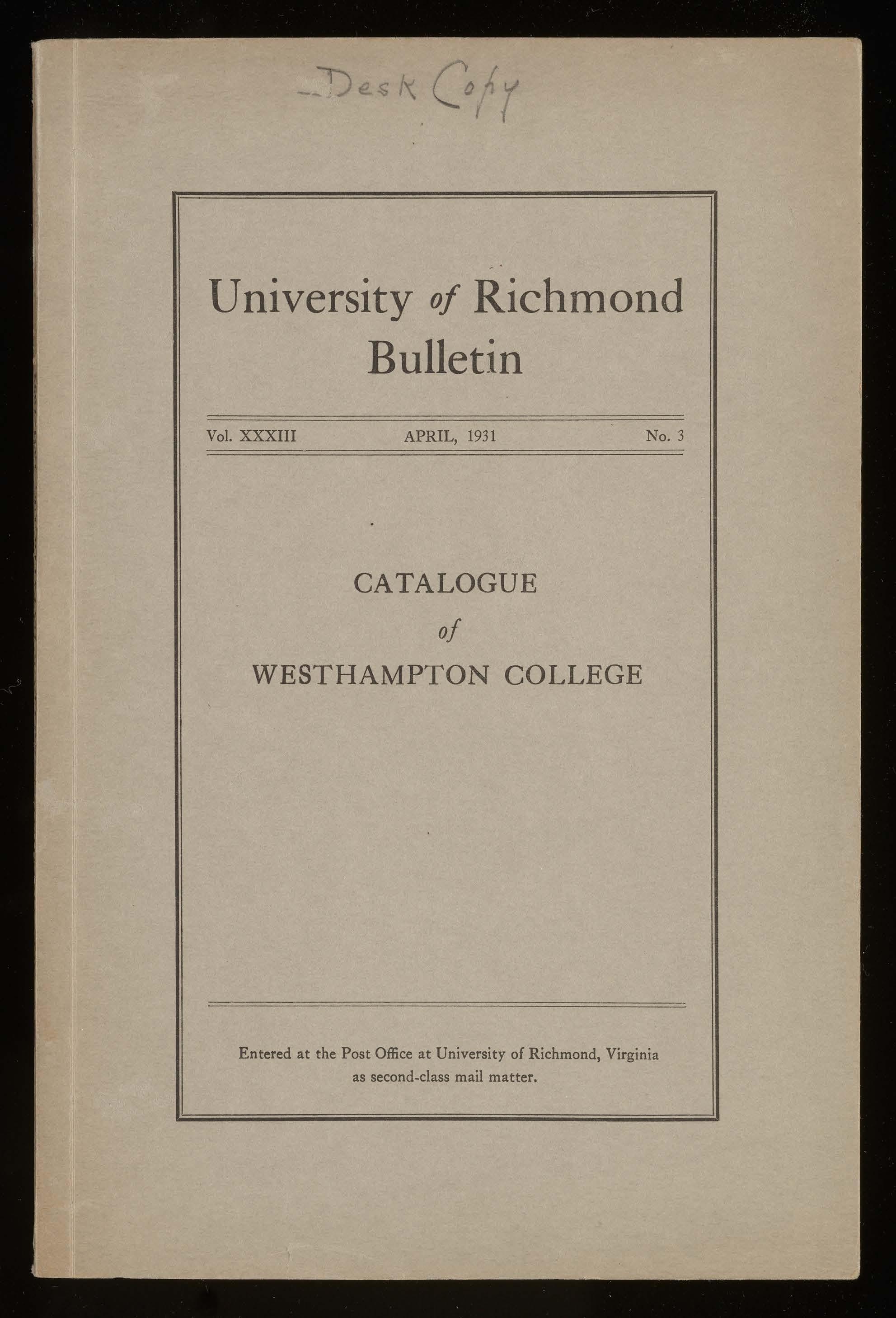
CATALOGUE of WESTHAMPTON COLLEGE
No. 3
Entered at the Post Office at University of Richmond, Virginia as second-class mail matter.

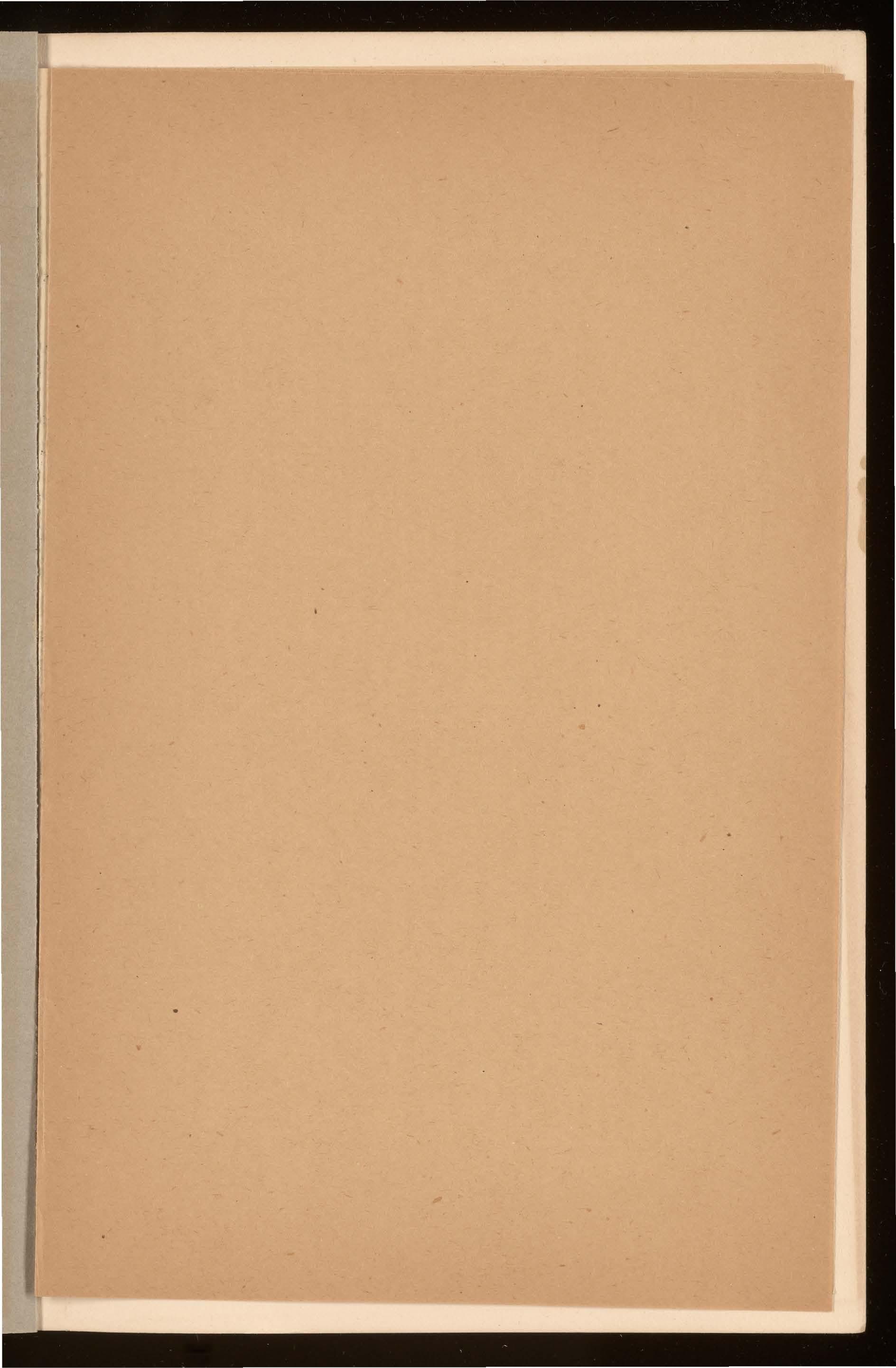
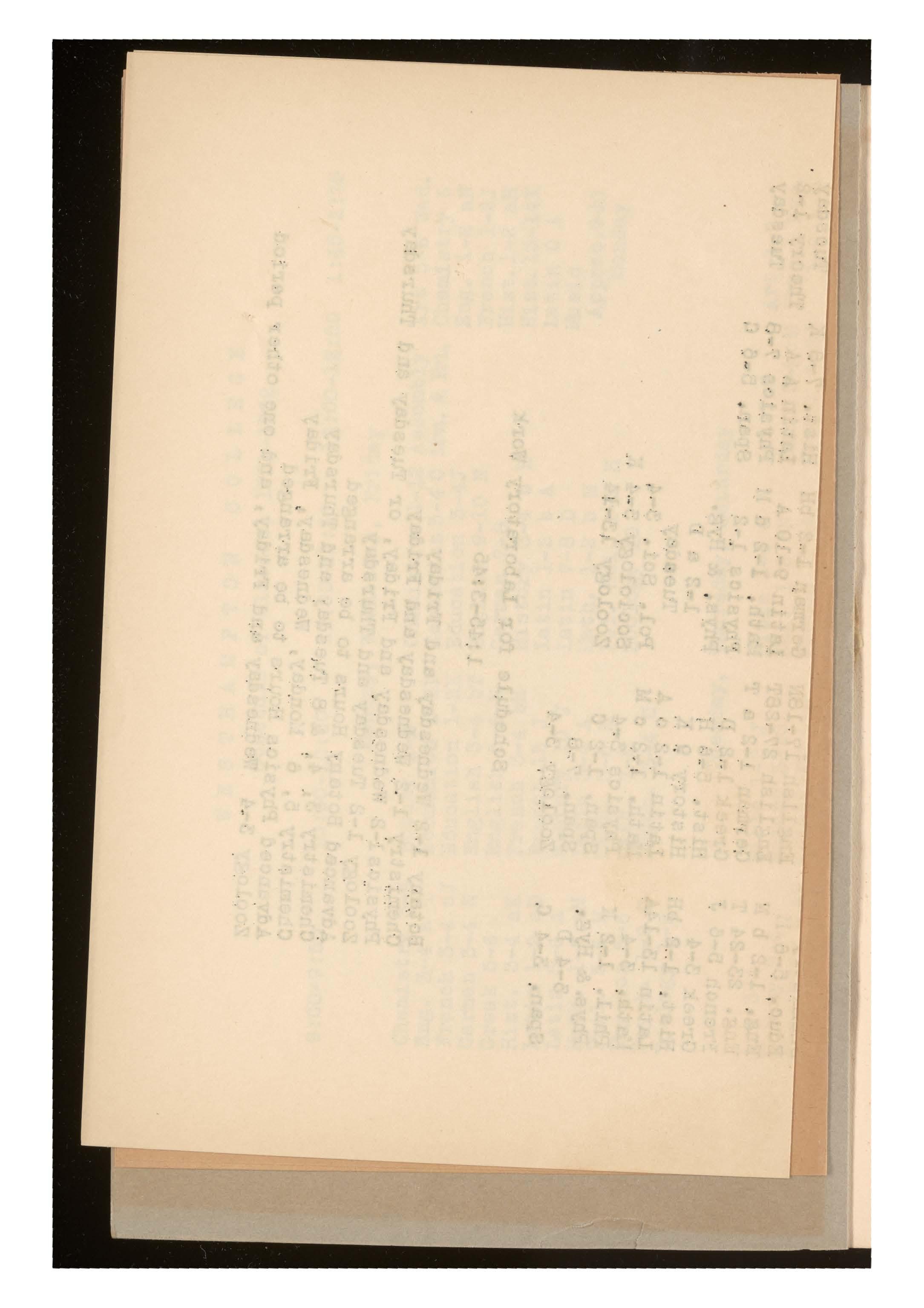

Vol. XXXIII APRIL, 1931

No. 3
Entered at the Post Office at University of Richmond, Virginia as second-class mail matter.




Westhampton College for Women and Richmond College for Men Are Ca-ordinate
With Announcements for the Session 1931-1932
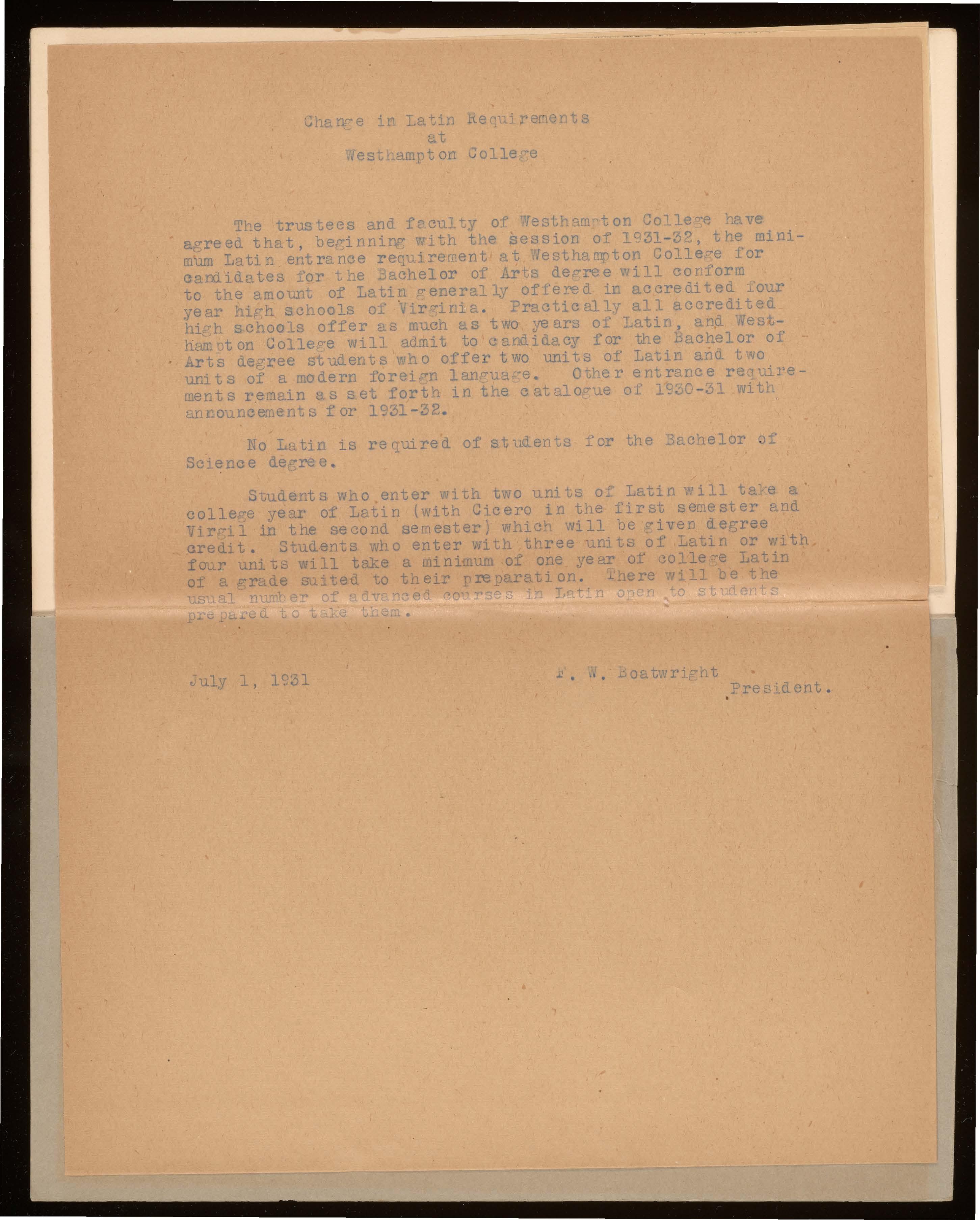
C nn- r; ...ie l. r re ts at e""t.. am t or: v o le e
Tr.e trustees an f cu ty of res th 'Ii ton Co,_le ,.e have a.,.reed tr&t, bep-i:ririr.o- wit1' the ses sion of 1 31-3~, the minimum Lc-.ti n entr&nce rer1 irerrent ...., t v'esthanmton volle<-e or ccno.i.d.,;teB for the achelor o~ Ar~ deP-ree, il., cor.form to tre u.mot.nt of La,.,ir. rrenerally offered in ac-Jredi:.ed ...our year hi h cl cols of · Lr,,.ir · a Practically all accredit d hi h schools offer as much as two year oi Latin, nc. ,estham'lton Golle,.,.e will 8.u.mit to canu.idacy for the .1.achelor of rts de ree stuct.er.t::i .o offe" two units o.t' Latin anc two u.n.:ts of & odern fore: ,,.n lan •ur e. Other ertr"'nce re,,,i;ireents reria1n !"-1S s_et fort. ir: the cat"'lo~ue of lSbG-31 witH arii our.cements for l S31-32.
No :.r.tin is req_uired of st cuients f'or the J&chelor Sc;er.ce de..,.ree.
t1...dents wno enter i i two t n; ts O.J.. Lat n ill. t e colle..,.e year of Latin :ith icero in the fir&t semester a.no. v·r£"'il in the secord semester, v hie!') will be "iven dep,ree credit. utuden"us bo erter vith tnree uni"'us of :.&tin or •ith fo a ir:i. um of one yea:r ot· co~ l e L' t..:n t rep rr ion. .1. ere i _l e tl-ie r· Jre ldent
9:00-9:50
Chemistry 3-4
Eng. 3-4 a T
French 3-4 aJ
German 3-4 N
Greek 5-6
Hist. 3-4 aK
Latin 1-2 aD
Latin 5-6 .A
Math. 1-2 aM
Phil. 5-6 H
Physics 5-6
Psych. 1-2 C
Zoology 1-2
Art 3-4
Botany 5-6
Chemj_ s try 5 &8
Educ. 5-6 H
Eng. 1-2 b N
E.ag. 23-24 T
:S't'eneh 5-6 J
Greek 3-4
Hist. 1-2 bH
Latin 13-14.A
Hath. 3-4
Phil. 1-2 K
Phys.& Hyg. 3-4 D
Span. 3-4 C
Schedule of Classes, 1931-1932
10:00-10:50 11:00-11:50 12:00-12:50 1:45-2:35
Monday, Wednesday, Friday
Botany 1-2
Economics l-2D
Education 1-21<:
English 3-4 bT
English 5-6 N
French 3-4 bH
French 15 J
History 10 J
Latin 3-4 A
I::Iath. 5-6 M
:Math. 7-8
Psych. 3-4 C
Chemistry 11-12 .Assembly
Economics 3-4 C Mon. & Fri.
Education 3-4J
English 9-10 N
German 7-8
History 5-4 b K
Latin 1-2 b .A La.tin 7-8 D 11'.:ath. 1-2 b H
Pol. Sci. 1-2 H zoology 10
Tuesday, Thursday, Saturday
Bible 1-2 J
Botany 3-10
Chemistry 1-2
English 17-18N
English 27-28T
German 1-2 a T
Greek 1-2 D
Hist. 5-6 H
History 9 K
Latin 1-2 C .A
Math. 1-2 c M
Physics 3-4
Span" 1-2 C
Span. 7-8
Zoology 3-4
Bible 5-4 C
Eng. 1-2 cN
French 13-14 J"
German 1-2 bH
Latin 9-10 A
Math. 1-2 d H
Physics 1-2
Phys. & Hyg. 1-2 a D
Tuesday
Pol. Sci. 3-4
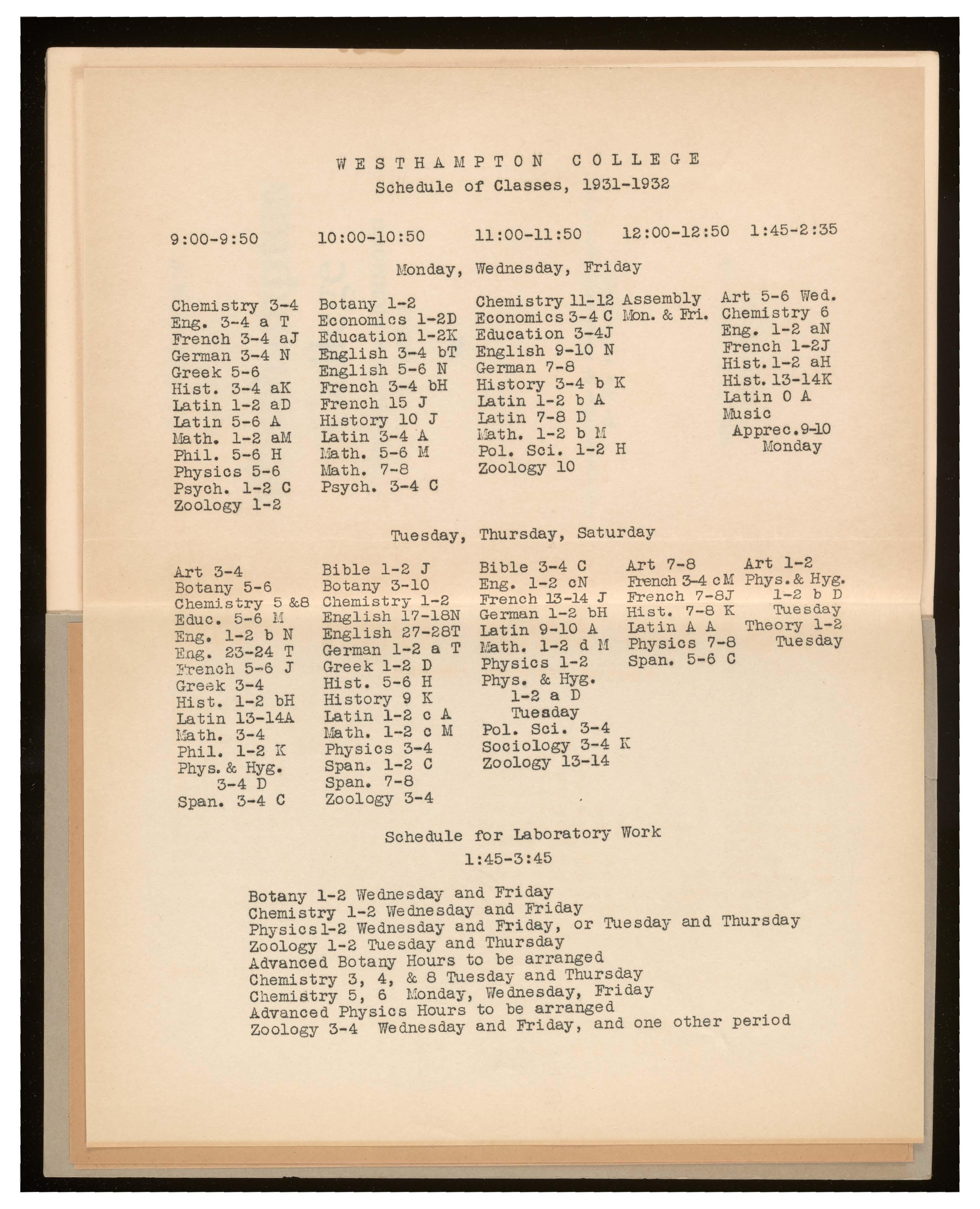
Art 5-6
Wed.
Chemistry 6
Eng. 1-2 aN
French l-2J
Hist.1-2 aH
Hist.13-14K
Latin O A
Music
Apprec. 9-J.O
Monday
.Art 7-8 Art 1-2
French 3-4 c M Phys. & Hyg.
French 7-8j 1-2 b D
Hist. ?-8 K
Latin A A
Physics ?-8
Span. 5-6 C
Tuesday
Theory 1-2
Tuesday
Sociology 3-4 K Zoology 13-14
Schedule for Laboratory Work 1:45-3:45
Botany 1-2 Wednesday and Friday
Chemistry 1-2 Wednesday and Friday
Physics 1-2 Wednesday and Friday, or Tuesday and Thursday
Zoology 1-2 Tuesday and Thursday
Advanced Botany Hours to be arranged
Chemistry 3, 4, & 8 Tuesday and Thursday
Chemistry 5, 6 Monday, Wednesday, Friday
Advanced Physics Hours to be arranged
Zoology 3-4 Wednesday and Friday, and one other period
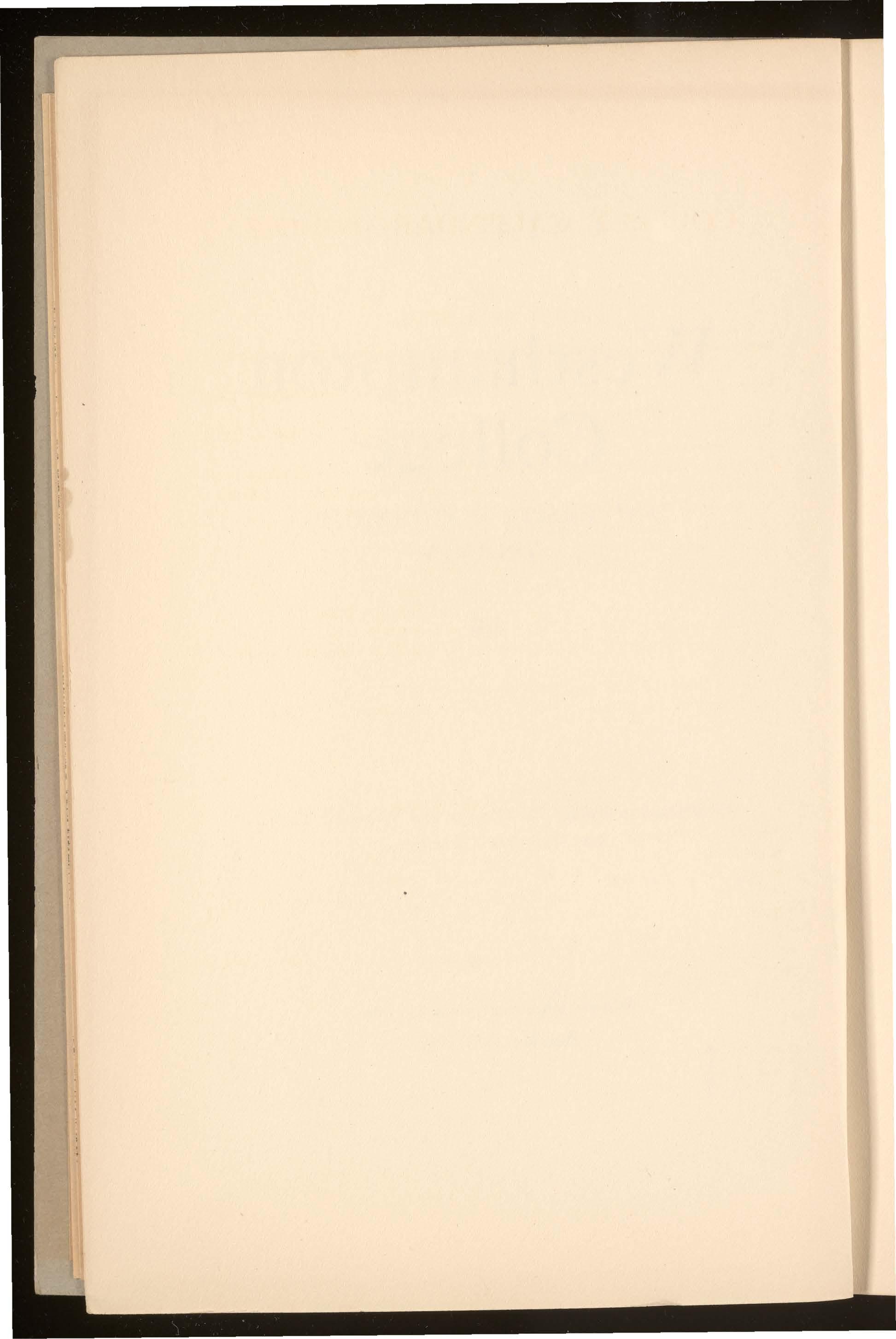

SEPTEMBER15TH AND 16TH, TUESDAY AND WEDNESDAY-Entrance Examinations.
SEPTEMBER15TH AND 16TH, TUESDAY AND WEDNESDAY-Registration of New Students.
SEPTEMBER15TH AND 16TH, TUESDAYANDWEDNESDAY,2 P. M.-Special Examinations.
SEPTEMBE!R17TH, THURSDAY-Session begins; Registration of Students.
SEPTEMBER18TH AND 19TH, FRIDAYAND SATURDAY-Organization of Classes.
SEPTEMBER21sT, MoNDAY, 12 NooN-First Chapel Assembly.
OCTOBERlsT, THURSDAY-Application for Degrees Filed.
OCTOBER13TH, 14TH AND 15TH_:"University Week."
NovEMBER 10TH, TUESDAY-Mid-semester Reports.
NOVEMBER26TH, THURSDAY-Thanksgiving Holiday.
DECEMBER22ND, TUESDAY, 1 P. M.-Christmas Holidays begin.
JANUARY 4TH, MONDAY,10 A. M.-Class work resumed.
JANUARY 8TH AND 9TH, FRIDAY AND SATURDAY,2 P. M.-Special Examinations.
JANUARY 21ST, THURSDAY-Examinations begin.
JANUARY 30TH, SATURDAY-Close of the First Semester.
FEBRUARYlsT, MONDAY-Second Semester begins.
MARCH 23RD, WEDNESDAY,12 NooN-Spring Vacation begins.
MARCH 31ST, THURSDAY, 10 A. M.-Class work resumed.
APRIL lsT AND 2ND, FRIDAY AND SATURDAY,2 P. M.-Special Examinations.
MAY 27TH, WEDNESDAY-Examinations begin.
JuNE 5TH, SUNDAY-Baccalaureate Sermon.
JUNE 6TH, MONDAY-Annual Meeting of Trustees; Alumnae Reunions; Clasa Day Exercises.
JUNE 7TH, TUESDAY-Commencement Day
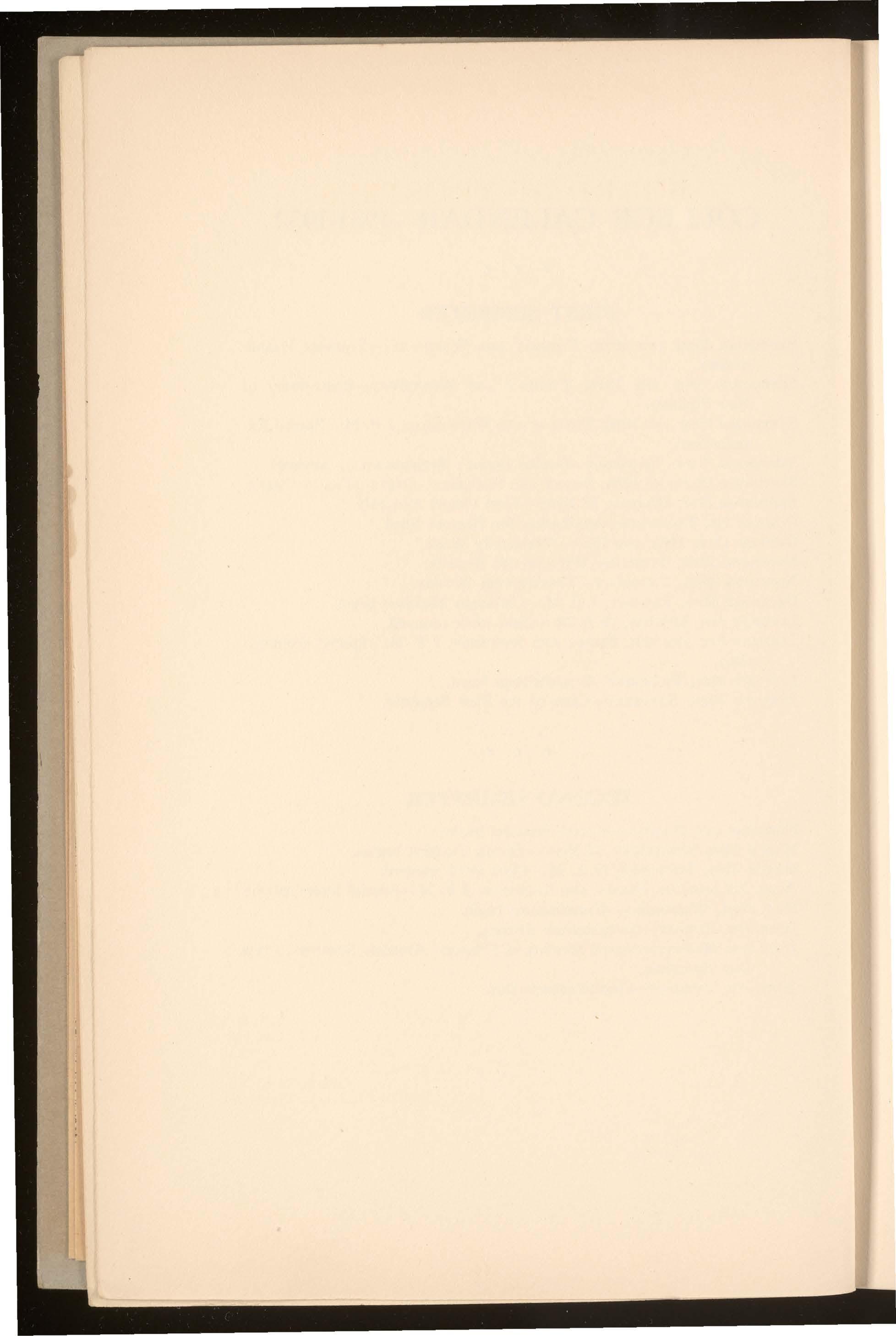
., ., .,
A. W. PATTERSON President
GEORGE BRAXTON TAYLOR Vice- President
B. WEST TABB Secretary
CLASS ONE
Term expires lune, 1931
J. HuNT HARGRAVE ..·-·········Oiatham
R. H. PITT, D.D., LL.D Richmond
H. W. STRALEY Princeton, W Va.
W. E BARRETT Newport News
CARTERN. WILLIAMS, }R.,. .Richmond
CLASS TWO
Term expir es lune , 1932
J. J. MoNTAGUE Richmond
L. HOWARD}ENKINS Richmond
GEORGESWANN Trenholm
H . LEE BoATWRIGHT.............. Danville
J. E HICKS, D.D Baltimore
CLASS THREE
Term expires June, 1933
E. C. MATHEWS Norfolk
STUART McGuIRE , M.D., LL.D., Richmond
Miss LULA WrnsTON Richmond
SPARKS W. MELTON, D D Norfolk
}OHN STEWARTBRYAN , LL.D., Richmond
CLASS FOUR
Term expires lune, 1934
A. J. MONTAGUE,LL.D Richmond
R. C. WILLIAMS....................Richmond
B. T. GuNTER. Accomac
A. R. LoNG Lynchburg
R. H. ANGELL.. Roanoke
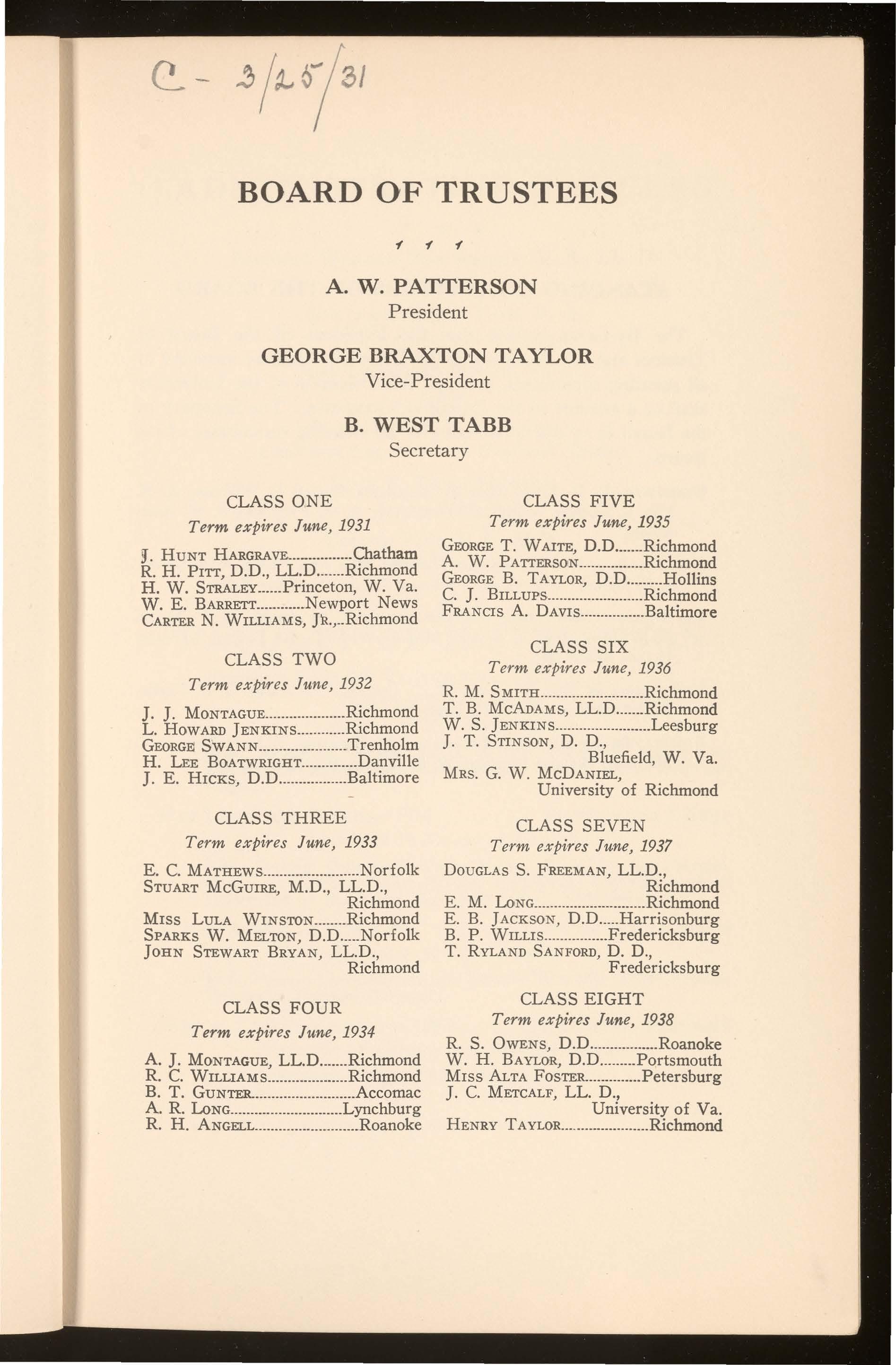
CLASS FIVE
Term expires lune, 1935
GEORGET WAITE, D.D Richmond
A. W. PATTERSON................Richmond
GEORGEB TAYLOR,D D Hollins
C. J B1LLUPS Richmond
FRANCIS A. DAv1s Baltimore
CLASS SIX
T erm expi r es lune , 1936
R. M. SMITH Richmond
T. B. McADAMS, LL.D Richmond
W S. }ENKINS Leesburg
J T STINSON, D. D. , Bluefield, W. Va.
MRs G. W. McDANIEL, University of Richmond
CLASS SEVEN
Term expires lune, 1937
DOUGLASs. FREEMAN,LL.D., Richmond
E. M. Lo NG............................Richmond
E. B. JACKSON, D.D Harrisonburg
B. P. WILLIS................Fredericksburg
T. RYLANDSANFORD,D. D., Fredericksburg
CLASS EIGHT
Term expires lune, 1938
R. S. OwENs, D.D .................Roanoke
W. H. BAYLOR,D.D Portsmouth
Miss ALTA FosTER Petersburg
J C. METCALF,LL. D., University of Va.
HENRY TA YLOR Richmond
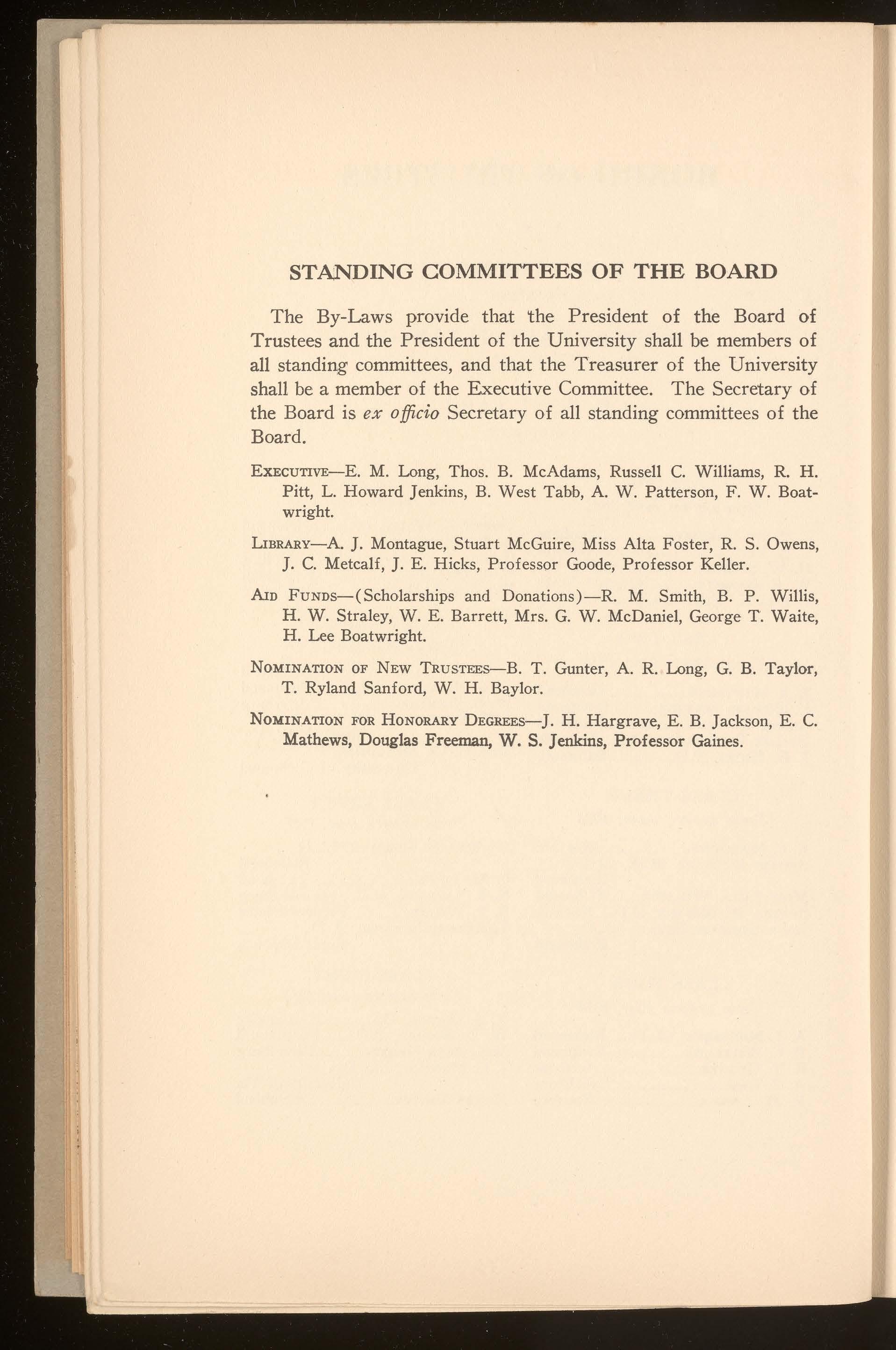
The By-Laws provide that the President of the Board of Trustees and the President of the University shall be members of all standing committees, and that the Treasurer of the University shall be a member of the Executive Committee. The Secretary of the Board is ex officio Secretary of all standing committees of the Board.
EXECUTIVE-E. M. Long, Thos. B. McAdams, Russell C. Williams, R. H. Pitt, L. Howard Jenkins, B. West Tabb, A. W. Patterson, F. W. Boatwright.
LIBRARY-A. J. Montague, Stuart McGuire, Miss Alta Foster, R. S. Owens, J. C. Metcalf, J. E. Hicks, Professor Goode, Professor Keller.
Am FuNDs-(Scholarships and Donations)-R. M. Smith, B. P. Willis, H. W. Straley, W. E. Barrett, Mrs. G. W. McDaniel, George T. Waite, H. Lee Boatwright.
NOMINATIONOF NEW TRUSTEEs-B. T. Gunter, A. R. Long, G. B. Taylor, T. Ryland Sanford, W. H. Baylor.
NOMINATION FORHONORARYDEGREES-}. H. Hargrave, E. B. Jackson, E. C. Mathews, Douglas Freeman, W. S. Jenkins, Professor Gaines.
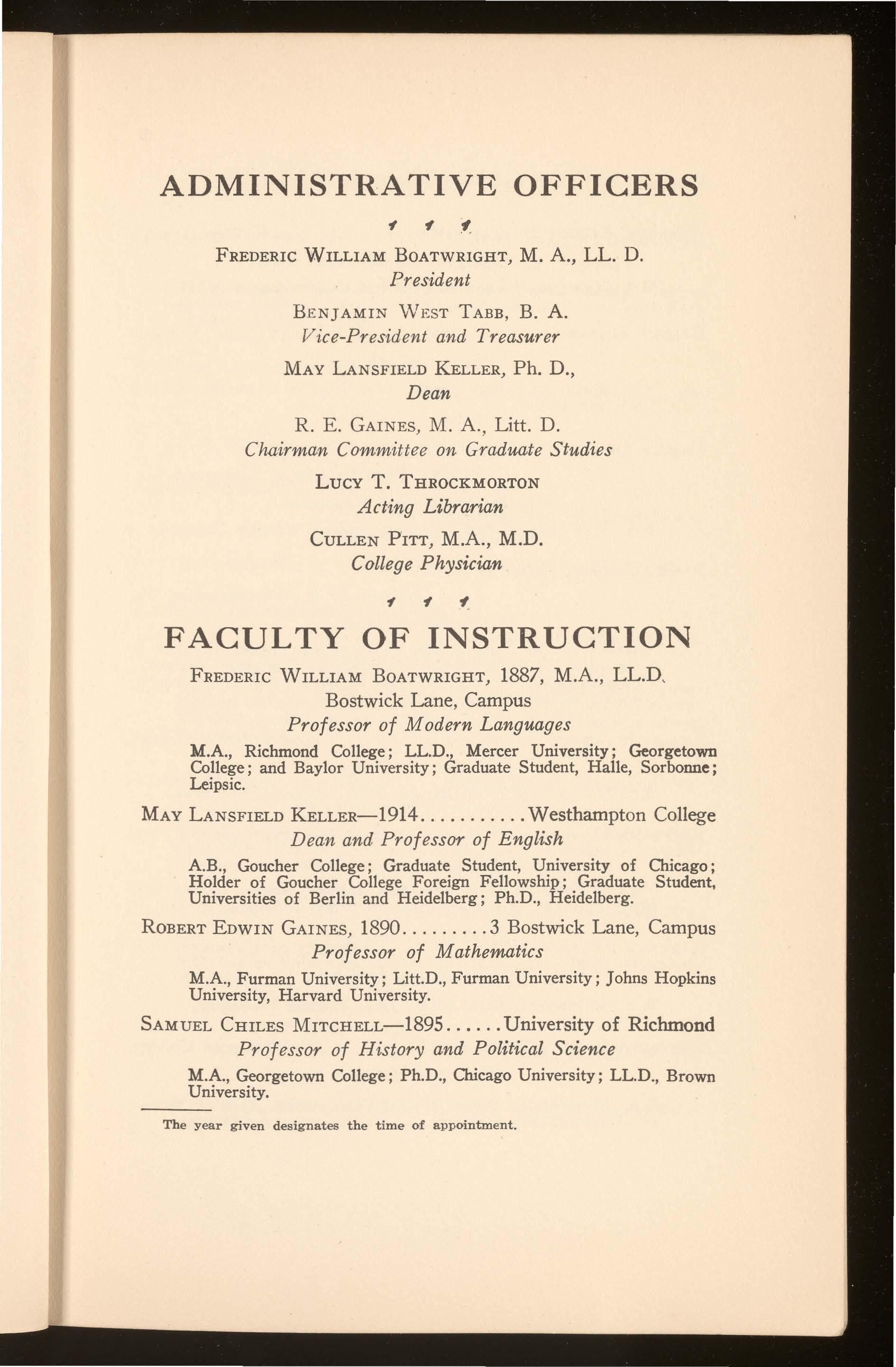
f f :,,_
FREDERICWILLIAM BOATWRIGHT,M. A., LL. D. President
BENJAMIN WEST TABB, B. A. Vice-President and Treasurer
MAY LANSFIELD KELLER, Ph.D., Dean
R. E. GAINES, M. A., Litt. D. Chairman Committee on Graduate Studies
Lucy T. THROCKMORTON Acting Librarian
CULLEN PITT, M.A., M.D. College Physician
f f .,_
FREDERICWILLIAM BOATWRIGHT,1887, M.A., LL.D , Bostwick Lane, Campus Professor of Modern Languages
M.A., Richmond College; LL.D., Mercer University; Georgetown College; and Baylor University; Graduate Student, Halle, Sorbonne; Leipsic.
MAY LANSFIELDKELLER-1914 Westhampton College Dean and Professor of English
A.B., Goucher College; Graduate Student, University of Chicago; Holder of Goucher College Foreign Fellowship; Graduate Student, Universities of Berlin and Heidelberg; Ph.D., Heidelberg.
ROBERTEDWIN GAINES, 1890 . ... .... . 3 Bostwick Lane, Campus Professor of Mathematics
M.A., Furman University; Litt D., Furman University; Johns Hopkins University, Harvard University.
SAMUEL CHILES MITCHELL-1895 ...... University of Richmond Professor of History and Political Science
M.A., Georgetown College; Ph.D., Chicago University; LL.D., Brown University.
The year given designates the time of appointment
WILLIAM ASBURY HARRrs-1901. .. . ......... 2 College Avenue
Professor of Greek
M.A., Richmond College; Ph.D., Johns Hopkins University.
ROBERTEDWARDLovING-1908 2 Bostwick Lane, Campus
Prof ess o r of Physics
M.A., Richmond College; Ph .D., Johns Hopkins University; Cornell U niv e r s ity, 1919-'20.
FANNY GRAVESCRENSHAW-1914
919 W. Franklin Street, Richmond, Va.
Director of Physical Education
B.A. , Bryn Mawr Colleg e ; Graduate Student, Columbia University.
F. FLAXINGTON HARKER-1915
Chatham Hills , Westhampton, Va. Professor of Music
Associate of the Royal College of Organists, London; Student in Composition, T. Tertius Noble (University of Cambridge, England); Piano , Madame Hel en H opekirk (well known Leschetizky exponent); Associate of the American Guild of Organists.
SusAN MADELINE LouGH-1 9 15 Westhampton College
Professor of History
B.A., M.A., Univ ersity of Chicago; Ph.D. , University of Chicago.
EDITH M HARKER-1916
Chatham Hills, Westhampton, Va.
Professor of Vocal Music
Pupil of Frederick Zuchtmann, Max Spicker; summer courses with Frank La Forge, George Ferguson and Sergei Klibansky
GARNETTRYLAND-1917
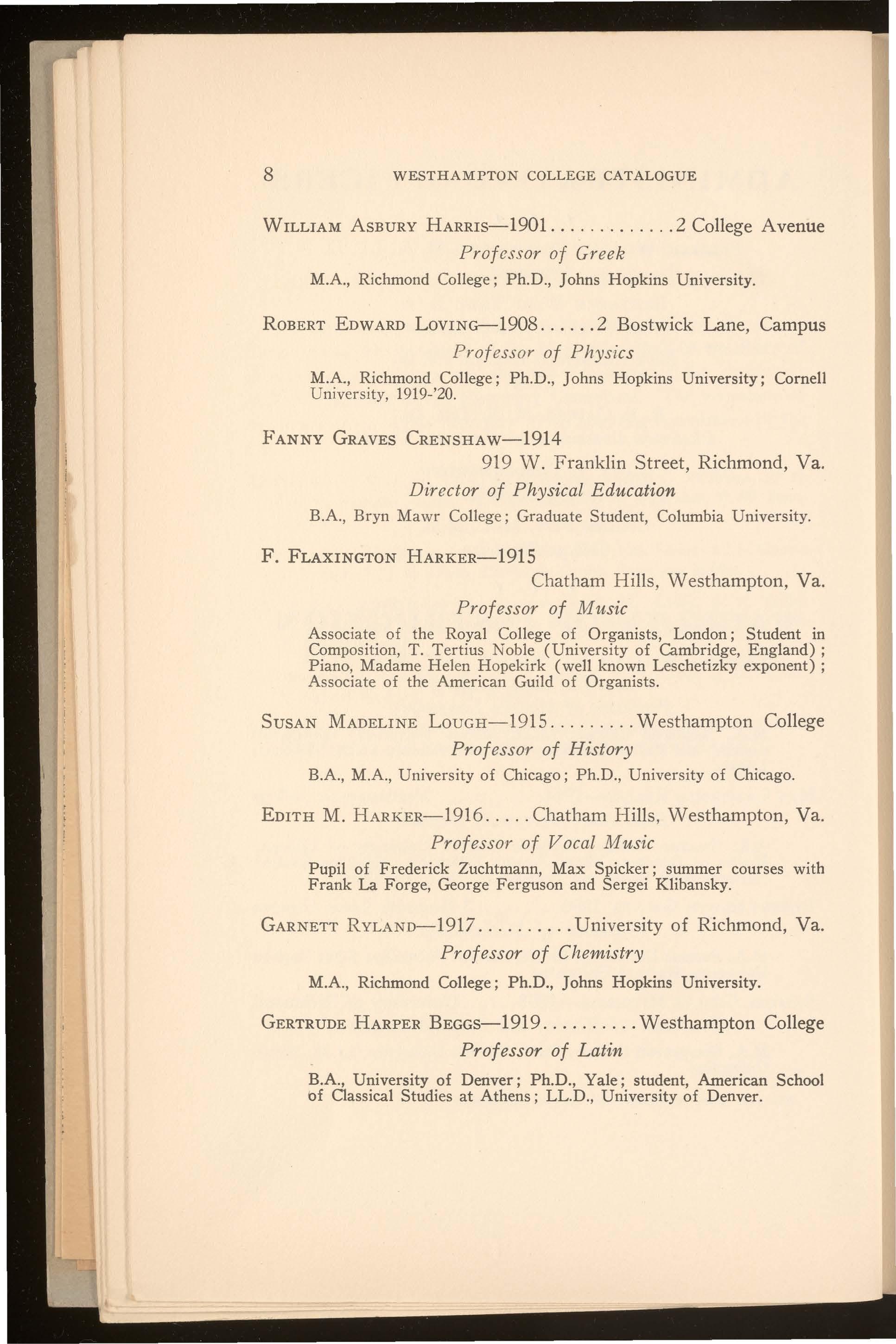
University of Richmond, Va.
Professor of Chemistry
M.A., Richmond College ; Ph.D., Johns Hopkins University
GERTRUDEHARPER BEGGs-1919
Professor of Latin
Westhampton College
B.A., University of Denver; Ph.D., Yale; student, American School bf Oassical Studies at Athens; LL.D., University of Denver.
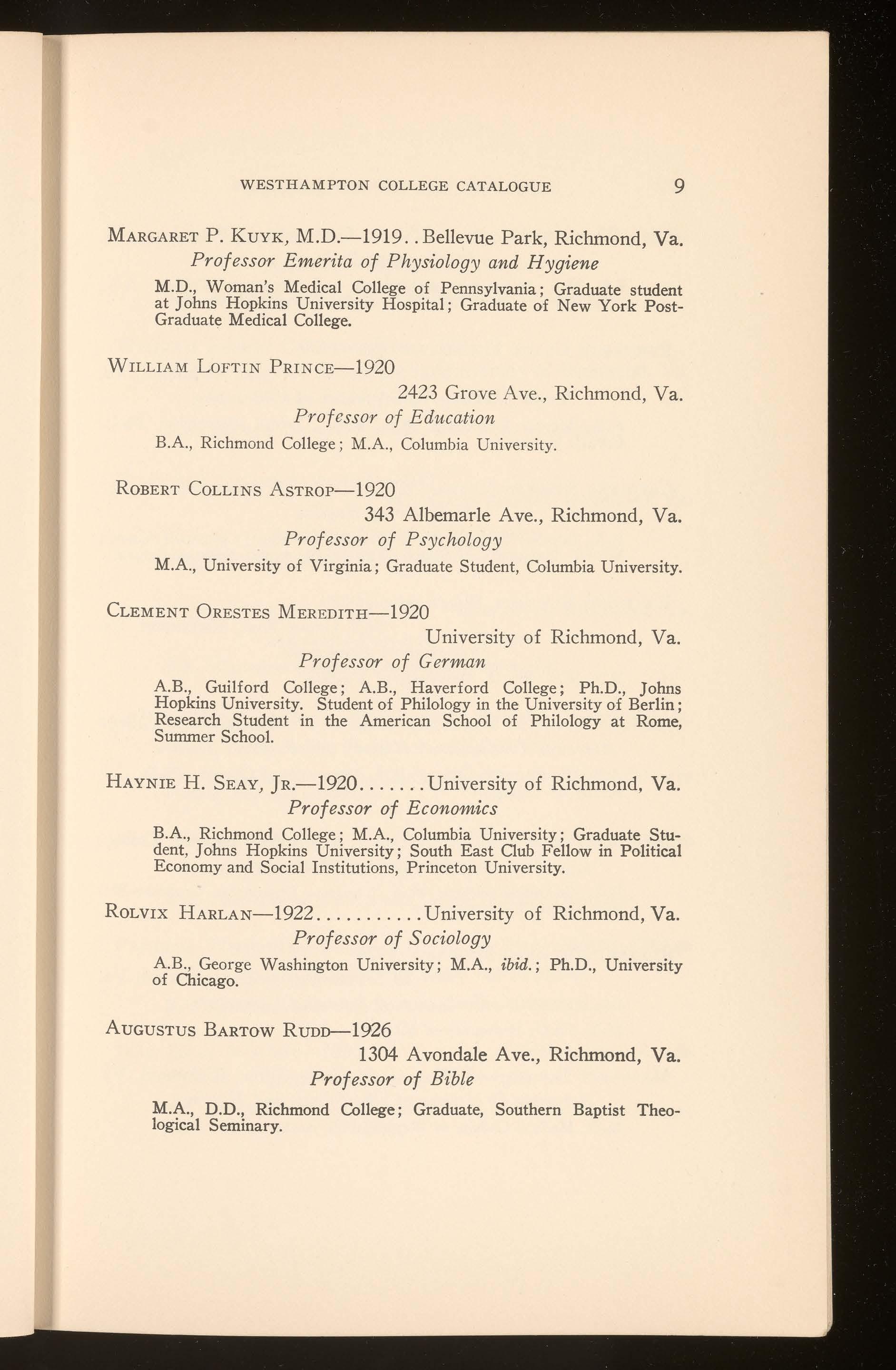
MARGARETP. KuYK, M.D.-1919 .. Bellevue Park, Richmond, Va.
Professor Emerita of Physiology and Hygiene
M.D., Woman's Medical College of Pennsylvania; Graduate student at Johns Hopkins University Hospital; Graduate of New York PostGraduate Medical College.
WILLIAM LOFTIN PRINCE-1920
2423 Grove Ave., Richmond, Va. Professor of Education
B.A., Richmond College; M.A., Columbia University.
ROBERTCOLLINS ASTROP-1920
343 Albemarle Ave., Richmond, Va. Professor of Psychology
M.A., University of Virginia; Graduate Student, Columbia University.
CLEMENTORESTESMEREDITH-1920
University of Richmond, Va. Professor of German
A.B., Guilford College; A.B., Haverford College; Ph.D., Johns Hopkins University. Student of Philology in the University of Berlin; Research Student in the American School of Philology at Rome, Summer School.
HAYNIE H. SEAY, JR.-1920 ....... University of Richmond, Va. Professor of Economics
B.A., Richmond College; M.A., Columbia University; Graduate Student, Johns Hopkins University; South East Oub Fellow in Political Economy and Social Institutions, Princeton University.
RoLVIX HARLAN-1922
University of Richmond, Va. Professor of Sociology
A.B , George Washington University; M.A., ibid.; Ph.D , University of Chicago.
AuGusTus BARTOWRuDo---1926
1304 Avondale Ave., Richmond, Va. Professor of Bible
M.A., D.D., Richmond College; Graduate, Southern Baptist Theological Seminary.
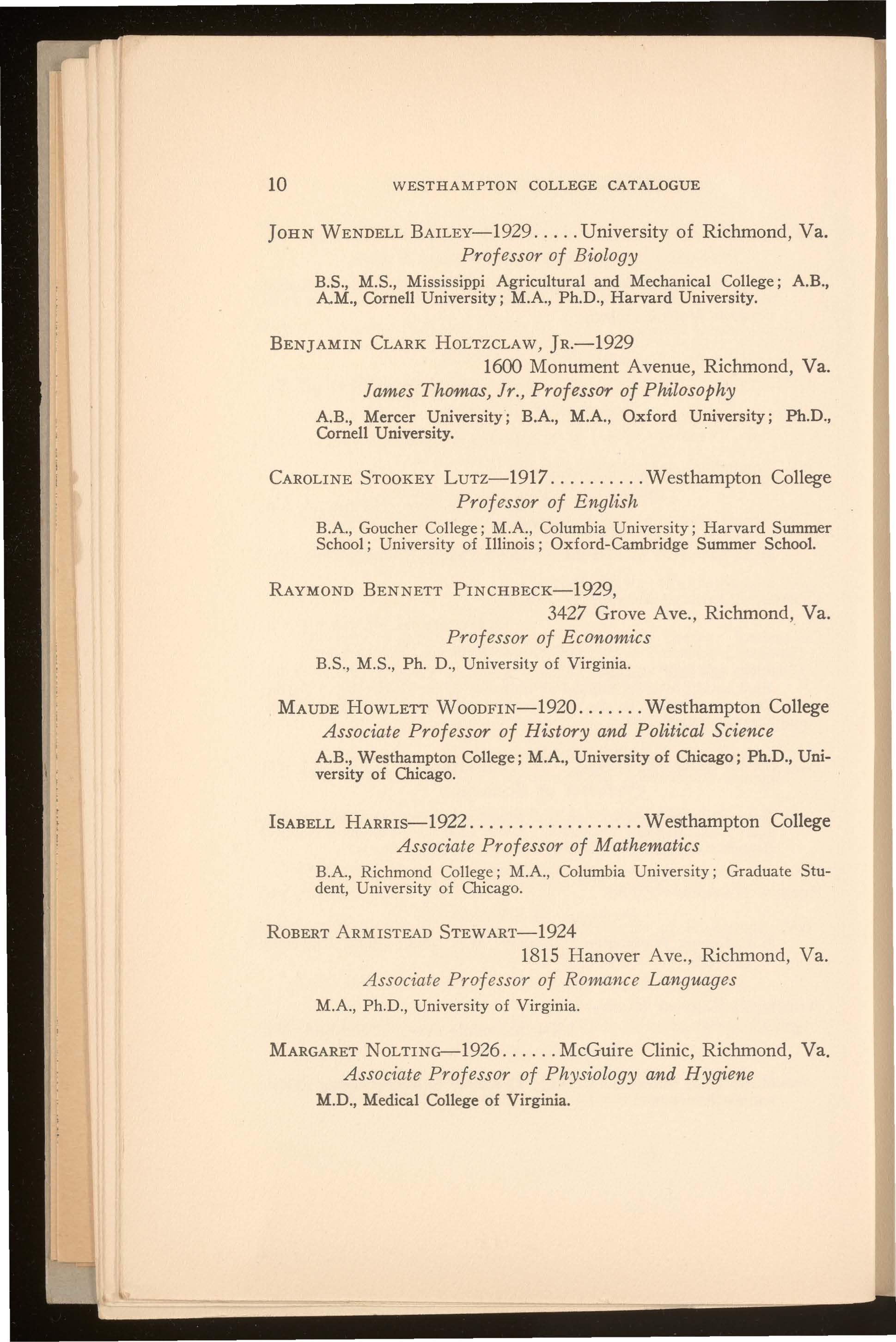
JOHN WENDELL BAILEY-1929 ..... University of Richmond, Va. Professor of Biology
B.S., M.S., Mississippi Agricultural and Mechanical College; A.B., A.M., Cornell University; M.A., Ph.D., Harvard University.
BENJAMIN CLARK HOLTZCLAW,JR.-1929
1600 Monument Avenue, Richmond, Va.
James Thomas, Jr., Professor of Philosophy
A.B., Mercer University; B.A., M.A., Oxford University; Ph.D., Cornell University.
CAROLINESTOOKEYLuTz-1917 Westhampton College Professor of English
B.A., Goucher College; M.A., Columbia University; Harvard Summer School; University of Illinois; Oxford-Cambridge Summer School.
RAYMONDBENNETT PINCHBECK-1929, 3427 Grove Ave., Richmond, Va. Professor of Economics
B.S., M.S., Ph. D., University of Virginia.
MAUDE HOWLETT WooDFIN-1920 Westhampton College Associate Professor of History and Political Science
A.B., Westhampton College; M.A., University of Chicago; Ph.D., University of Chicago.
ISABELL HARRis-1922 .................. Westhampton College Associate Professor of Mathematics
B.A., Richmond College; M.A., Columbia University; Graduate Student, University of Chicago.
ROBERTARMISTEADSTEWART-1924
1815 Hanover Ave., Richmond, Va.
Associate Professor of Romance Languages
M.A., Ph.D., University of Virginia.
MARGARETNoLTING-1926 McGuire Clinic, Richmond, Va.
Associate Professor of Physiology and Hygiene
M.D., Medical College of Virginia.
MARGARETRoss-1926 .................. Westhampton College
Associate Professor of English
B.A., Allegheny College; M.A., University of Pennsylvania.
°WILLIAMROBERT CORNTHWAITE-1927
University of Richmond, Va.
Associate Professor of Chemistry
A.B., DePauw University; Ph.D., Ohio State University.
CHARLESLEONARDALBRIGHT-1929
4412 Grove Avenue, Richmond, Va.
Associate Professor of Physi,cs
B.S., M.S., Coe College; Ph.D., University of Iowa.
ROBERTFORTE SMART-1929

University of Richmond, Va.
Associate Professor of Botany
B.A., Mississippi College; M.A., Harvard University.
J. PAUL GLICK-193O ... .4719 Leonard Parkway, Richmond, Va.
Associate Professor of Education
B.A., Bridgewater College; M.A., University of Virginia; Graduate Student, Harvard University.
RUTH FRANCESLACKMAN-193O .......... Westhampton College
Associate Professor of French and Spanish
B.A., University of Pennsylvania; M.A., Columbia University.
PAULINE TuRNBULL-1916 Westhampton College
Associate Professor of Latin and Registrar
B.A., Syracuse University; M.A., University of Pennsylvania.
JEAN GRAY WRIGHT-193O Westhampton College
Associate Professor of French
B.A., Bryn Mawr College; M.A. University of Pennsylvania; Graduate Student, Bryn Mawr College.
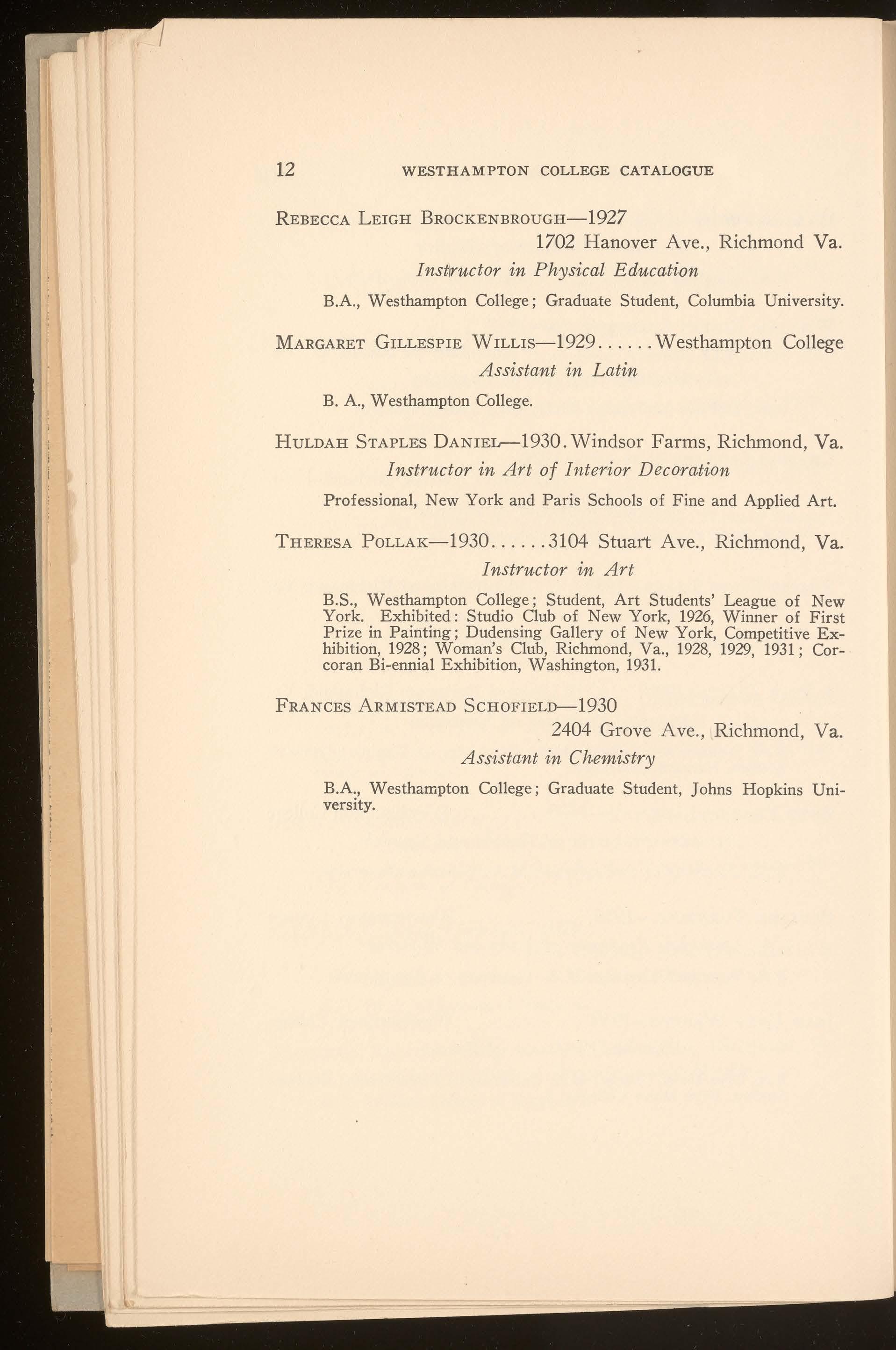
REBECCALEIGH BROCKENBROUGH-1927
1702 Hanover Ave., Richmond Va.
Inst'iructor in Physical Education
B.A., Westhampton College; Graduate Student, Columbia University.
MARGARETGILLESPIE WILLis-1929 Westhampton College
Assistant in Latin
B. A., Westhampton College.
HuLDAH STAPLES DANIEir-1930 Windsor Farms, Richmond, Va .
Instructor in Art of Interior Decoration
Professional, New York and Paris Schools of Fine and Applied Art.
THERESA PoLLAK-1930 3104 Stuart Ave., Richmond, Va.
Instructor in Art
B.S., Westhampton College; Student, Art Students' League of New York. Exhibited: Studio Club of New York, 1926, Winner of First Prize in Painting; Dudensing Gallery of New York, Competitive Exhibition, 1928; Woman's Club, Richmond, Va., 1928, 1929, 1931; Corcoran Bi-ennial Exhibition, Washington, 1931.
FRANCES ARMISTEAD ScHOFIELD--1930
2404 Grove Ave , Richmond, Va.
Assistant in Chemistry
B.A., Westhampton College; Graduate Student, Johns Hopkins University.
WESTHAMPTON
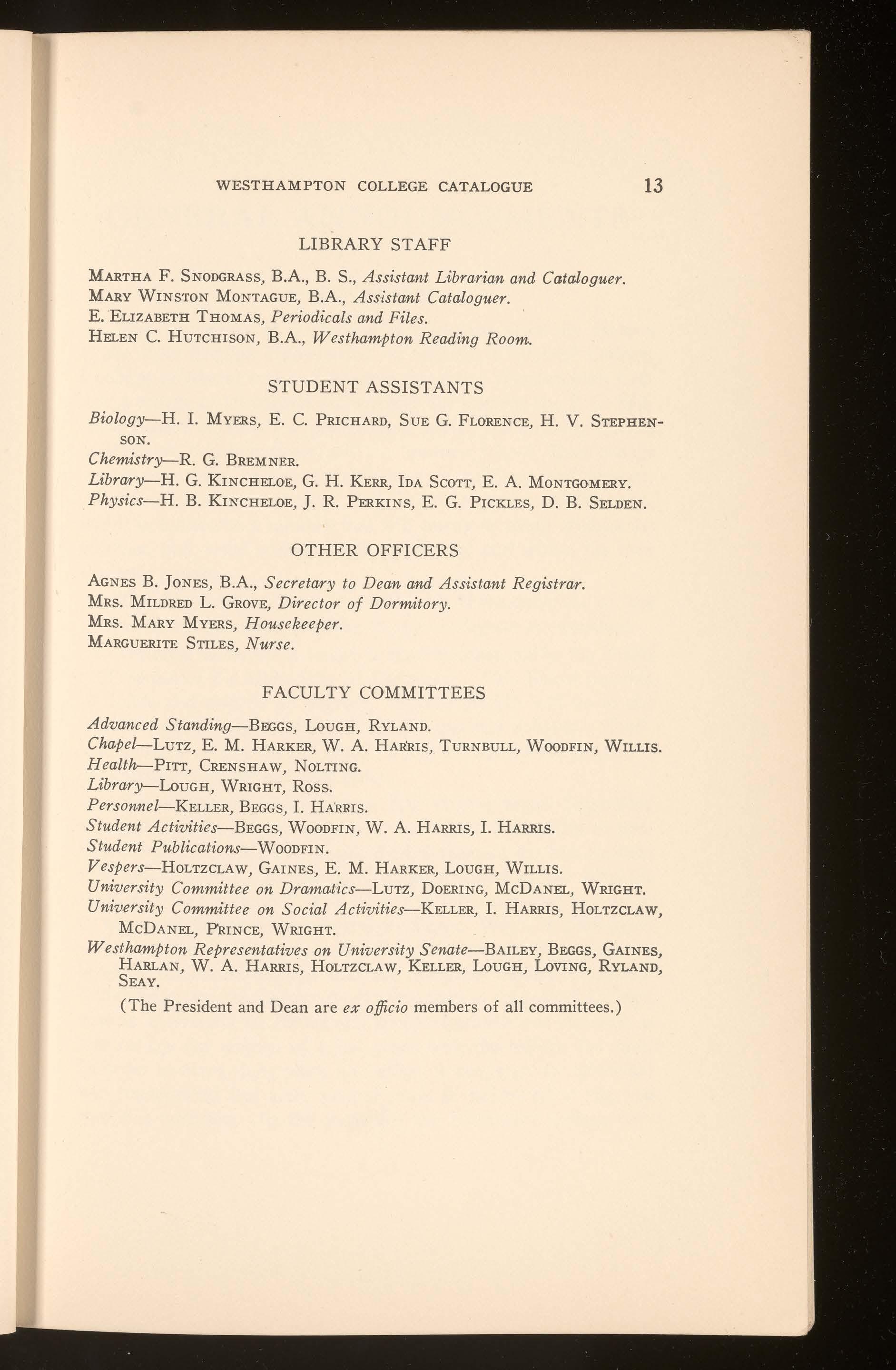
COLLEGE CATALOGUE
LIBRARY STAFF
MARTHA F. SNODGRASS, B.A., B. S , Assistant Librarian and Cataloguer.
MARY WINSTON MONTAGUE, B.A., Assistant Cataloguer. E. ELIZABETH THOMAS, Periodicals and Files.
HELEN C. HUTCHISON, B.A., Westhampton Reading Room.
Biology-H. I. MYERS, E . C. PRICHARD, SuE G. FLORENCE, H. V. STEPHENSON.
Chemistry-R. G. BREMNER.
Library-H. G. KINCHELOE, G. H. KERR, IDA ScoTT, E. A. MONTGOMERY.
Physics-H . B. KINCHELOE , J. R. PERKINS, E. G. PICKLES , D. B. SELDEN.
AGNES B. }ONES , B.A., Secretary to Dean and Assistant Registrar.
MRs. MILDRED L. GROVE, Director of Dormitory.
MRs. MARY MYERS, Housekeeper . MARGUERITE STILES, Nurse.
FACULTY COMMITTEES
Advanced Standing-BE£Gs, LouGH, RYLAND.
Chapel-LuTZ, E. M. HARKER, W. A. HARRIS , TURNBULL, WOODFIN, WILLIS. Healthr-PITT, CRENSHAW, NOLTING.
Library-LouGH, WRIGHT, Ross. Personnel-KELLER, BEGGS, I. HA 'RRIS.
Student Activities-BEGGS, WOODFIN, W. A. HARRIS, I. HARRIS. Student Publications-WOODFIN.
Vespers-HOLTZCLAW, GAINES, E. M. HARKER, LOUGH, WILLIS
University Committee on Dramatics-LUTZ, DOERING, MCDANEL, WRIGHT. University Committee on Social Activities-KELLER, I. HARRIS, HOLTZCLAW, McDANEL, PRINCE, WRIGHT.
Westhampton Representatives on University Senate-BAILEY, BEGGS, GAINES, HARLAN, W A. HARRIS, HOLTZCLAW, KELLER, LouGH, LoVING, RYLAND, SEAY.
(The President and Dean are ex officio members of all committees.)
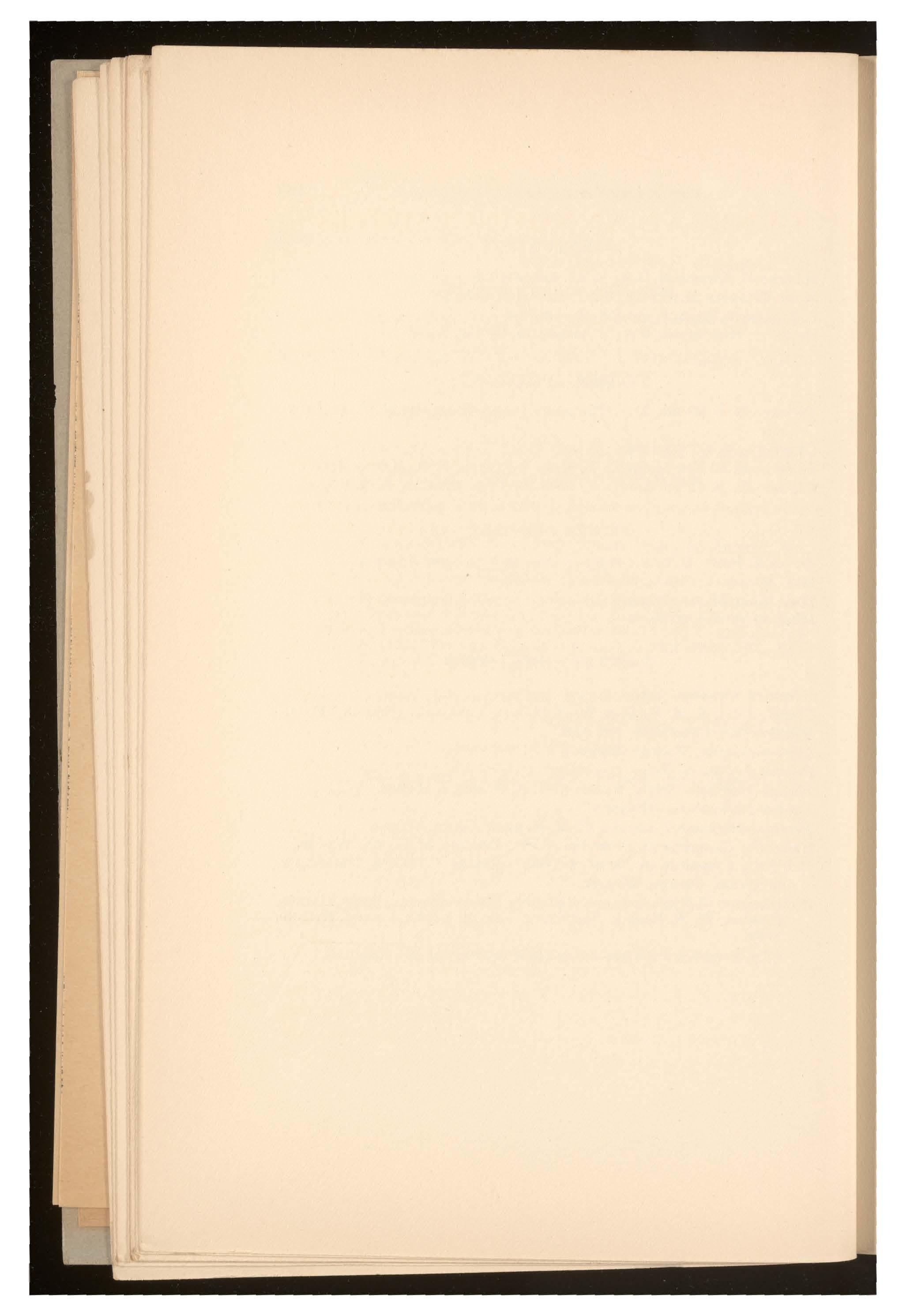
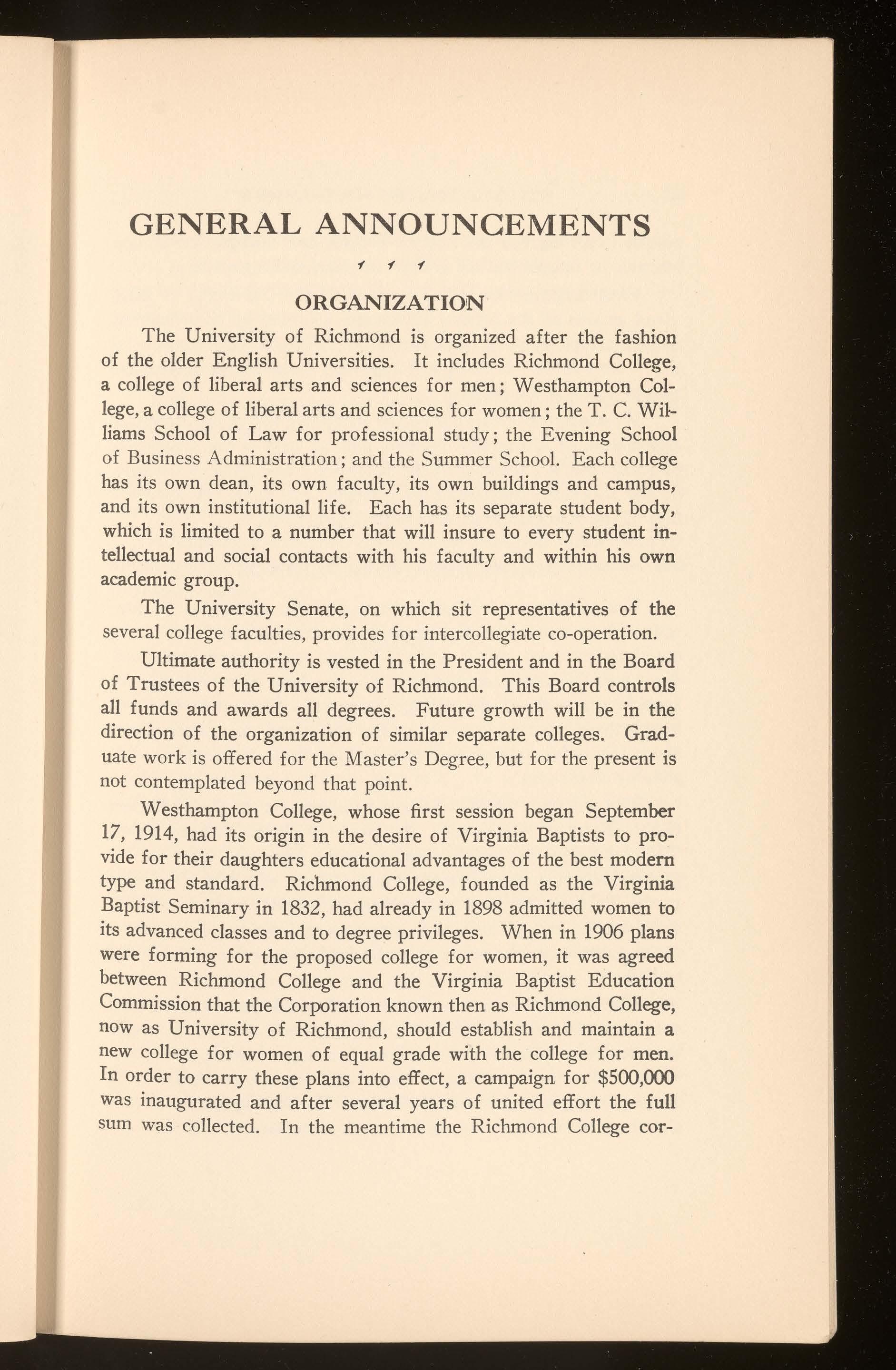
The University of Richmond is organized after the fashion of the older English Universities. It includes Richmond College, a college of liberal arts and sciences for men; Westhampton College, a college of liberal arts and sciences for women; the T. C. Williams School of Law for professional study; the Evening School of Business Administration; and the Summer School. Each college has its own dean, its own faculty, its own buildings and campus, and its own institutional life. Each has its separate student body, which is limited to a number that will insure to every student intellectual and social contacts with his faculty and within his own academic group.
The University Senate, on which sit representatives of the several college faculties, provides for intercollegiate co-operation.
Ultimate authority is vested in the President and in the Board of Trustees of the University of Richmond. This Board controls all funds and awards all degrees. Future growth will be in the direction of the organization of similar separate colleges. Graduate work is offered for the Master's Deg,ree, but for the present is not contemplated beyond that point.
Westhampton College, whose first session began September 17, 1914, had its origin in the desire of Virginia Baptists to provide for their daughters educational advantages of the best modern type and standard. Richmond College, founded as the Virginia Baptist Seminary in 1832, had already in 1898 admitted women to its advanced classes and to degree privileges. When in 1906 plans were forming for the proposed college for women, it was agreed between Richmond College and the Virginia Baptist Education Commission that the Corporation known then as Richmond College, now as University of Richmond, should establish and maintain a new college for women of equal grade with the college for men. In order to carry these plans into effect, a campaign for $500,000 was inaugurated and after several years of united effort the full sum was collected. In the meantime the Richmond College cor-
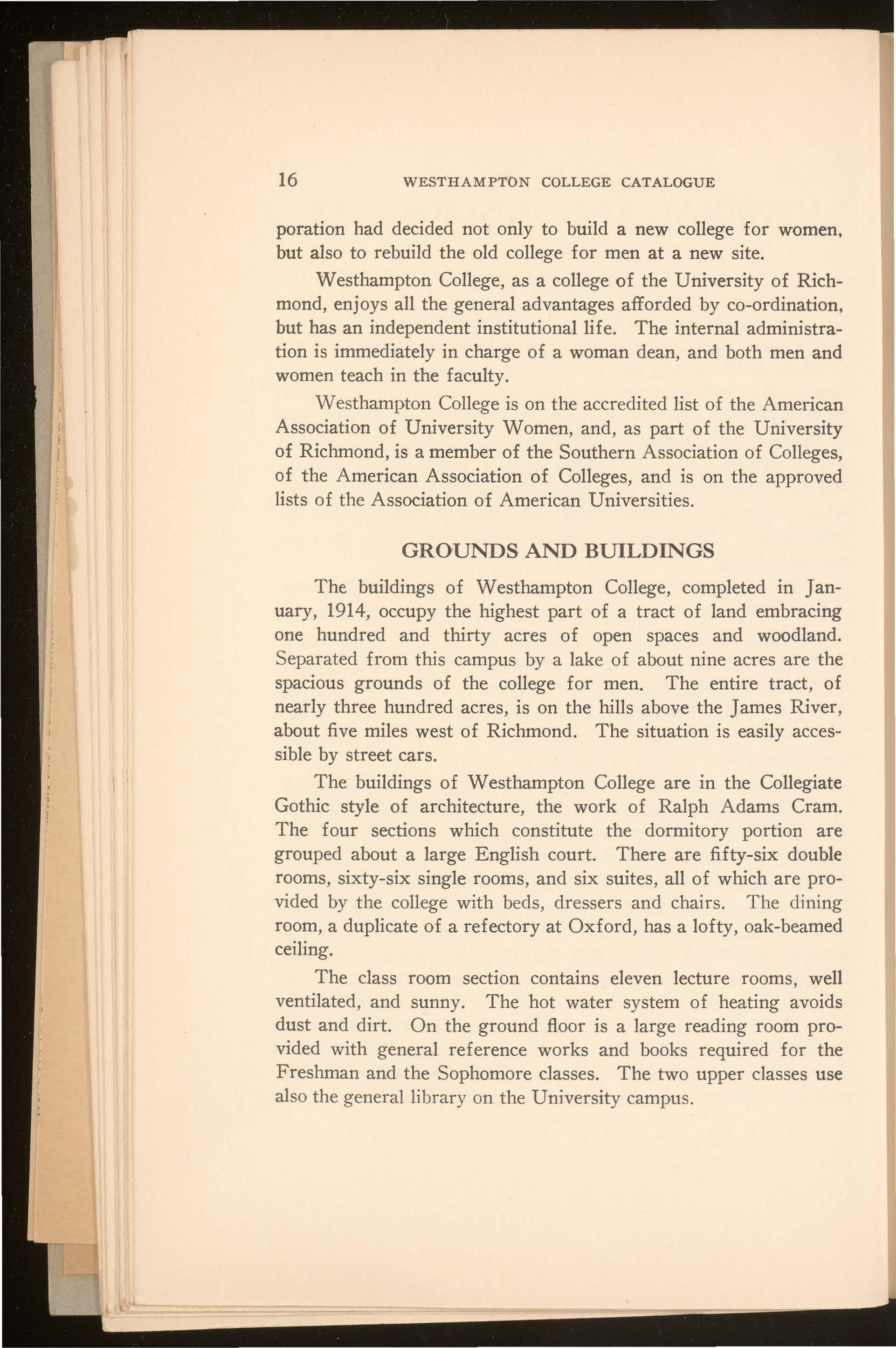
poration had decided not only to build a new college for women, but also to rebuild the old college for men at a new site.
Westhampton College, as a college of the University of Richmond, enjoys all the general advantages afforded by co-ordination, but has an independent institutional life. The internal administration is immediately in charge of a woman dean, and both men and women teach in the faculty.
Westhampton College is on the accredited list of the American Association of University Women, and, as part of the University of Richmond, is a member of the Southern Association of Colleges, of the American Association of Colleges, and is on the approved lists of the Association of American Universities.
The buildings of Westhampton College, completed in January, 1914, occupy the highest part of a tract of land embracing one hundred and thirty acres of open spaces and woodland. Separated from this campus by a lake of about nine acres are the spacious grounds of the college for men. The entire tract, of nearly three hundred acres, is on the hills above the James River, about five miles west of Richmond. The situation is easily accessible by street cars.
The buildings of Westhampton College are in the Collegiate Gothic style of architecture, the work of Ralph Adams Cram. The four sections which constitute the dormitory portion are grouped about a large English court. There are fifty-six double rooms, sixty-six single rooms, and six suites, all of which are provided by the college with beds, dressers and chairs. The dining room, a duplicate of a refectory at Oxford, has a lofty, oak-beamed ceiling.
The class room section contains eleven lecture rooms, well ventilated, and sunny. The hot water system of heating avoids dust and dirt. On the ground floor is a large reading room provided with general reference works and books required for the Freshman and the Sophomore classes. The two upper classes use also the general library on the University campus.
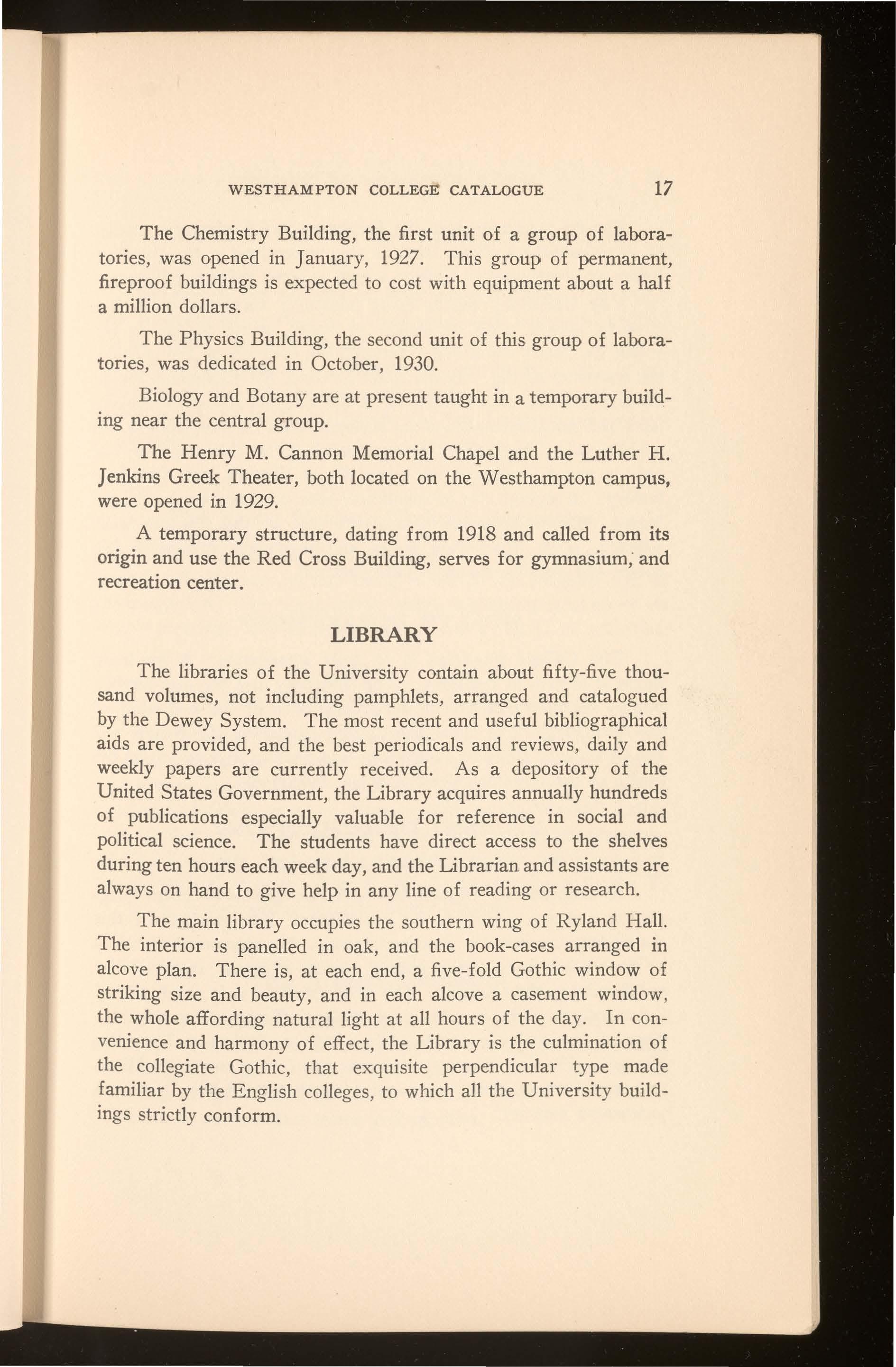
The Chemistry Building, the first unit of a group of laboratories, was opened in January, 1927. This group of permanent, fireproof buildings is expected to cost with equipment about a half a million dollars.
The Physics Building, the second unit of this group of laboratories, was dedicated in October, 1930.
Biology and Botany are at present taught in a temporary building near the central group.
The Henry M. Cannon Memorial Chapel and the Luther H. Jenkins Greek Theater, both located on the Westhampton campus, were opened in 1929.
A temporary structure, dating from 1918 and called from its origin and use the Red Cross Building, serves for gymnasium; and recreation center.
The libraries of the University contain about fifty-five thousand volumes, not including pamphlets, arranged and catalogued by the Dewey System. The most recent and useful bibliographical aids are provided, and the best periodicals and reviews, daily and weekly papers are currently received. As a depository of the United States Government, the Library acquires annually hundreds of publications especially valuable for reference in social and political science. The students have direct access to the shelves during ten hours each week day, and the Librarian and assistants are always on hand to give help in any line of reading or research.
The main library occupies the southern wing of Ryland Hall. The interior is panelled in oak, and the book-cases arranged in alcove plan. There is, at each end, a five-fold Gothic window of striking size and beauty, and in each alcove a casement window , the whole affording natural light at all hours of the day. In convenience and harmony of effect, the Library is the culmination of the collegiate Gothic, that exquisite perpendicular type made familiar by the English colleges , to which all the University buildings strictly conform.

For the convenience of the Freshman and Sophomore classes of Westhampton College, there is also maintained in the Reading Room at Westhampton College a well selected reference library. The University counts itself peculiarly fortunate in having close by several great collections of books, which materially increase its library resources. Through the courtesy of the officials, the resources of the Virginia State Library, the Richmond Public Library and the unique collection of the Virginia Historical Society have been made accessible to our students, both for consultation and withdrawal. These afford exceptional facilities for research, not only in general subjects, but especially in Virginia and American history. It should also be mentioned that our nearness to Washington enables us to make constant use of the Congressional Library, from which rare books and pamphlets invaluable for theses and debates can be quickly obtained.
The College physician is in daily attendance. A graduate nurse is always in residence. The infirmary and the diet kitchen occupy secluded quarters on the ground floor of the east wing of the dormitory. The Dean, the College Physician, the Nurse, and the Director of Physical Education co-operate in supervision of the health of the students individually and collectively.
The College Government Association
All students become members of the College Government Association and are subject to its jurisdiction. The purpose of this Association, as stated in its constitution, is "to promote the welfare of the student body and to uphold a spirit of honor, responsibility and loyalty to the College." The administration is in the hands of five members of the faculty, seven student officers, and representatives of class and other organizations, who constitute an Executive Council. The Council elects each year two faculty members, Westhampton Faculty elects two faculty members, and the Dean is a permanent member.
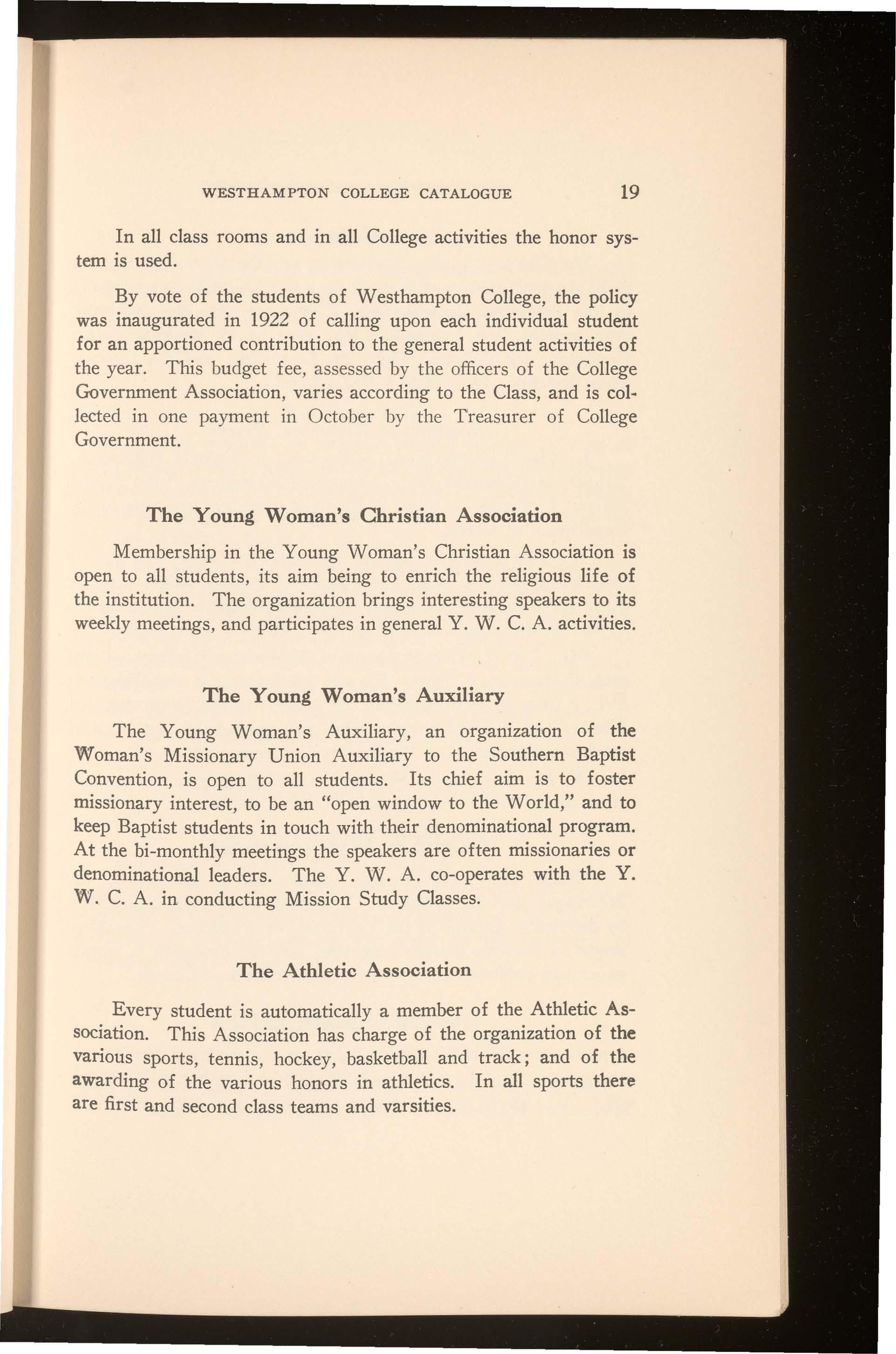
In all class rooms and in all College activities the honor system is used.
By vote of the students of Westhampton College, the policy was inaugurated in 1922 of calling upon each individual student for an apportioned contribution to the general student activities of the year. This budget fee, assessed by the officers of the College Government Association, varies according to the Class, and is collected in one payment in October by the Treasurer of College Government.
Membership in the Young Woman's Christian Association is open to all students, its aim being to enrich the religious life of the institution. The organization brings interesting speakers to its weekly meetings, and participates in general Y. W. C. A. activities.
The Young Woman's Auxiliary, an organization of the Woman's Missionary Union Auxiliary to the Southern Baptist Convention, is open to all students. Its chief aim is to foster missionary interest, to be an "open window to the World," and to keep Baptist students in touch with their denominational program. At the bi-monthly meetings the speakers are often missionaries or denominational leaders. The Y. W. A. co-operates with the Y. W. C. A. in conducting Mission Study Classes.
Every student is automatically a member of the Athletic Association. This Association has charge of the organization of the various sports, tennis, hockey, basketball and track; and of the awarding of the various honors in athletics. In all sports there are first and second class teams and varsities.

The Classical Studies Association, and the other departmental clubs are conducted by students in co-operation with the professors of the respective departments. There are also the following organizations : the Dramatic Club, open to all students except Freshmen; the Debating Club; the Glee Club, and the International Relations Club.
I. THE TANNER MEDAL.-Founded by Colonel William E. Tanner, of Richmond, Va., in honor of his parents, John F. and Harriet L. Tanner, is given to the most proficient graduate in the Department of Greek.
II. THE ]AMES D. CRUMP PRIZE.-Founded by the gentleman whose name it bears-is a prize of twenty dollars in gold, given for excellence in Courses 5-6 in Mathematics. It is awarded in part on the regular class work and in part on extra work.
III. THE J. TAYLORELLYSONMEDAL IN HrsTORY.-Lieutenant-Governor J. Taylor Ellyson, of Richmond, established in 1912 a prize to be awarded to the student in the Department of History and Political Science, who shall present the best piece of original investigation in Virginia or Southern History. N. B.-Students of Westhampton College may compete for these prizes.
There are three student publications : the Web, the Messenger, and the Collegian. The Web, an annual, is published by the Senior Classes of the University of Richmond. The Messenger, a monthly literary magazine, and the Collegian, a weekly paper, are published co-ordinately with Richmond College.
Phi Beta Kappa
Each year elections to Phi Beta Kappa are made from the honor students of Westhampton College and Richmond College.

Election to the Honorary Senior Society, Mortar Board, is based on direct contribution to college life along the line of student activities, and a record of good scholarship.
The College conducts on Sunday evening Vesper Services at which the students are addressed by men and women of distinction interested in various forms of religious work. No Sunday morning services are held at the College, but students are expected to attend churches of their choice in the city.
Two meetings of faculty and student s , called respectively "Assembly" and "Convocation," are held every week, 12 Noon to 12 :SO P. M. in the Henry Mansfield Cannon Memorial Chapel. Assembly is for Westhampton College alone. Convocation is for the University, including Westhampton College. Each meeting is introduced by a brief religious service. Attendance is regulated by Student Government. Th e choir is directed by the Professor of Vocal Music in Westhampton College.
The Ann Florence Frazer Fund
This fund of $3,000, given by Robert Frazer, LL. D., of Washington, D. C., in memory of his wife, provides for a course of lectures in Westhampton College on "Duties and Obligations of Motherhood ." These lectures are given by the professor of Physiology and Hygiene.
These Lectures are provided for by "The Thomas Museum Lecture Endowment" of $11,000 donated by his family in memory of the late president of the corporation , James Thomas , Jr. They
are delivered annually by eminent men of our own and foreign countries on Science, Philosophy, Art or Literature, and by special provision are open to the public without charge.
These public lectures in the field of the social sciences are provided by an alumnus of the University of Richmond, Jacob Billikopf, LL.D., of Philadelphia. The first course was given in May, 1930, by Dr. John H. Finley, of the New York Times.
University Week was organized in 1927 and has become an annual event. The object of the University Week is to bring to the campus friends of the University, particularly alumnae, and to offer them intellectual stimulus and entertainment. The dates for University Week in 1931 are October 13th, 14th and 15th.
The Alumnae of Westhampton College are organized for the purpose of maintaining a close connection with the College. Whereever the number of alumnae is sufficient to justify the formation of a chapter in a given city or town, this group is organized at once and affiliated with the main Association. The annual meeting and dinner is held at Westhampton College in June on Monday of Commencement Week. The Officers of the Association are:
President MARY LOWNDES PEPLE
Vice-President
Recording Secretairy
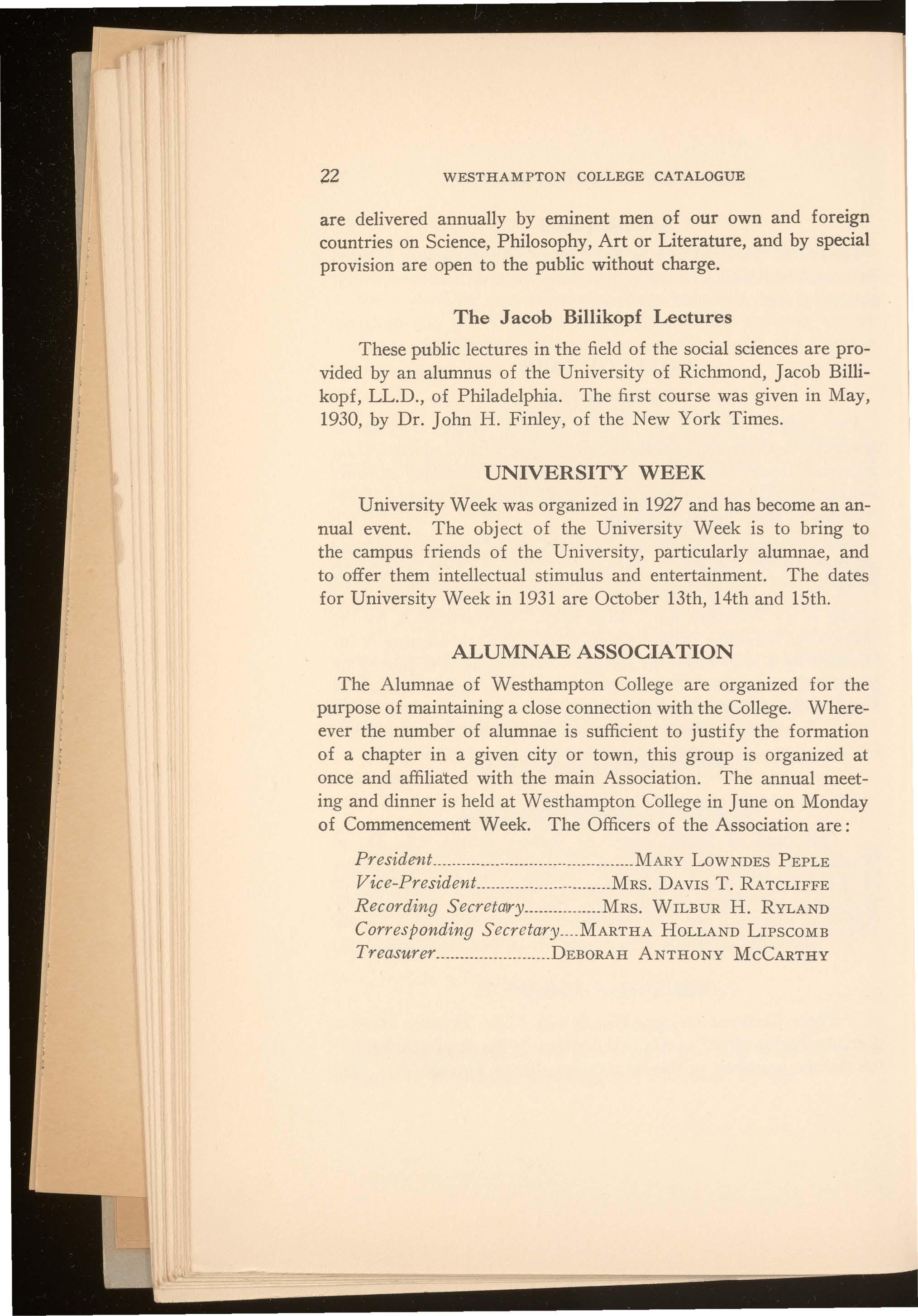
MRs. DAVIS T. RATCLIFFE
MRs. WILBUR H. RYLAND
Corresponding Secretary MARTHA HOLLAND LIPSCOMB
Treasurer ........................DEBORAH ANTHONY McCARTHY
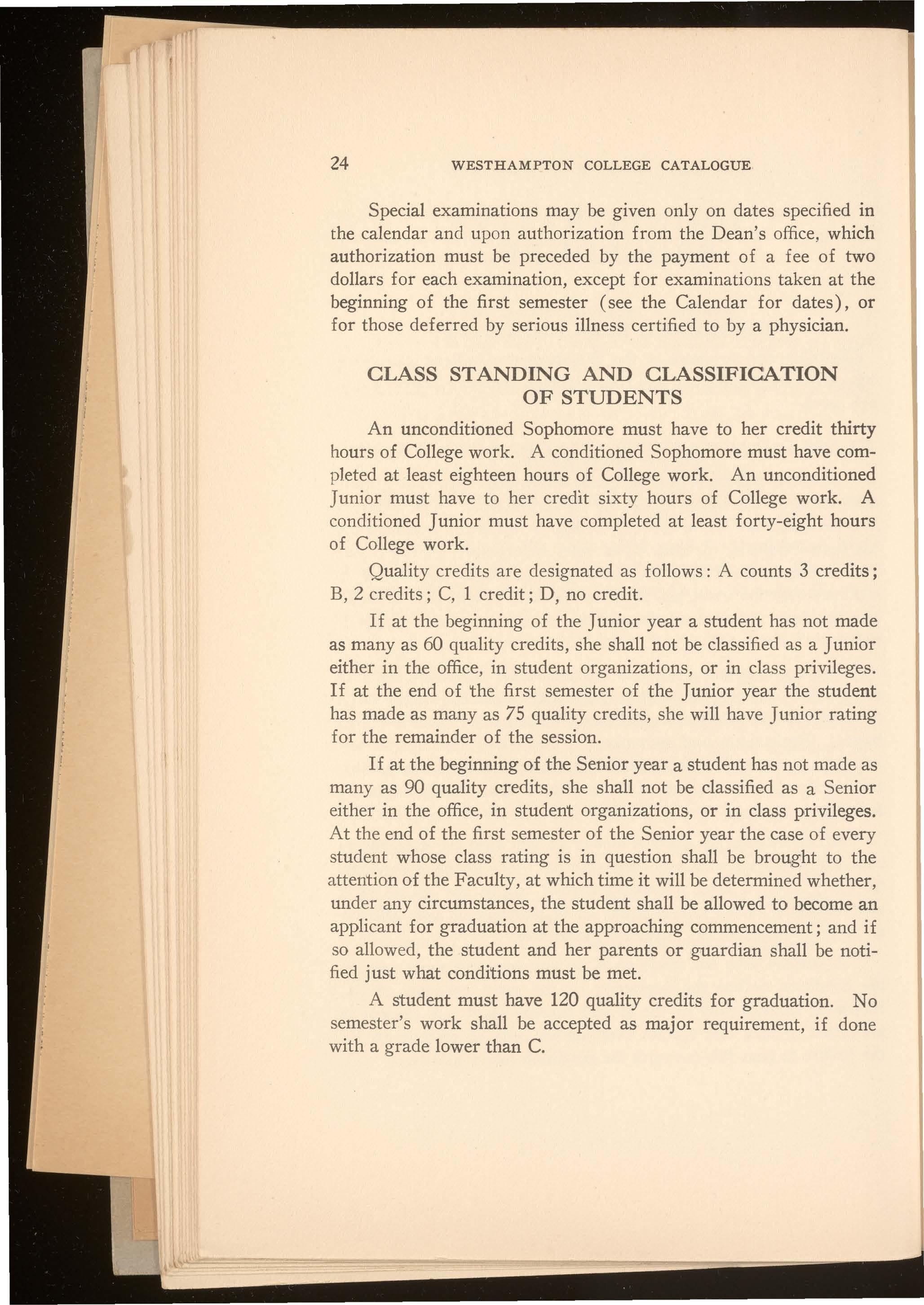
Special examinations may be given only on dates specified in the calendar and upon authorization from the Dean's office, which authorization must be preceded by the payment of a fee of two dollars for each examination, except for examinations taken at the beginning of the first semester ( see the Calendar for dates), or for those deferred by serious illness certified to by a physician.
An unconditioned Sophomore must have to her credit thirty hours of College work. A conditioned Sophomore must have completed at least eighteen hours of College work. An unconditioned Junior must have to her credit sixty hours of College work. A conditioned Junior must have completed at least forty-eight hours of College work.
Quality credits are designated as follows : A counts 3 credits; B, 2 credits; C, 1 credit; D, no credit.
If at the beginning of the Junior year a student has not made as many as 60 quality credits, she shall not be classified as a Junior either in the office, in student organizations, or in class privileges. If at the end of 'the first semester of the Junior year the student has made as many as 75 quality credits, she will have Junior rating for the remainder of the session.
If at the beginning of the Senior year a student has not made as many as 90 quality credits, she shall not be classified as a Senior either in the office, in student organizations, or in class privileges. At the end of the first semester of the Senior year the case of every student whose class rating is in question shall be brought to the attention of the Faculty, at which time it will be determined whether, under any circumstances, the student shall be allowed to become an applicant for graduation at the approaching commencement; and if so allowed, the student and her parents or guardian shall be notified just what conditions must be met.
A student must have 120 quality credits for graduation. No semester's work shall be accepted as major requirement, if done with a grade lower than C.

In the case of students transferring from other colleges, the following requirements shall be prerequisite for admission to the Senior Class :
(a) If admitted as a Junior, the transfer shall achieve 30 quality credits during her Junior year, and must have 60 quality credits for graduation.
(b) If admitted as a Sophomore, the transfer shall achieve 60 quality credits during her Sophomore and Junior years, and must have 90 quality credits for graduation.
(
c) No transfer applying for admission to the Sophomore or Junior Classes will be accepted if her grades are not distinctly creditable.
All Seniors who become regular members of the Senior Class must make up by February 10th all conditions of previous sessions which may be removed by examination.
A Senior who, at the end of the first semester, is conditioned in the work of that semester in any class shall be deprived of all senior privileges until such condition shall be removed.
If at the end of either semester a Senior has been conditioned on as many as two subjects, she cannot remain a member of the Senior Class without special action of the Faculty.
A Senior may not make up by an examination a deficiency on more than one subject taken in the Senior year, and this examination may not be given until the end of the second semester.
Reports are sent to parent or guardian in the middle of the first semester, in February, and in June. This includes a record of the student's class and examination standing, together with such other information as may be deemed important. Whenever it may seem desirable more frequent reports are sent.
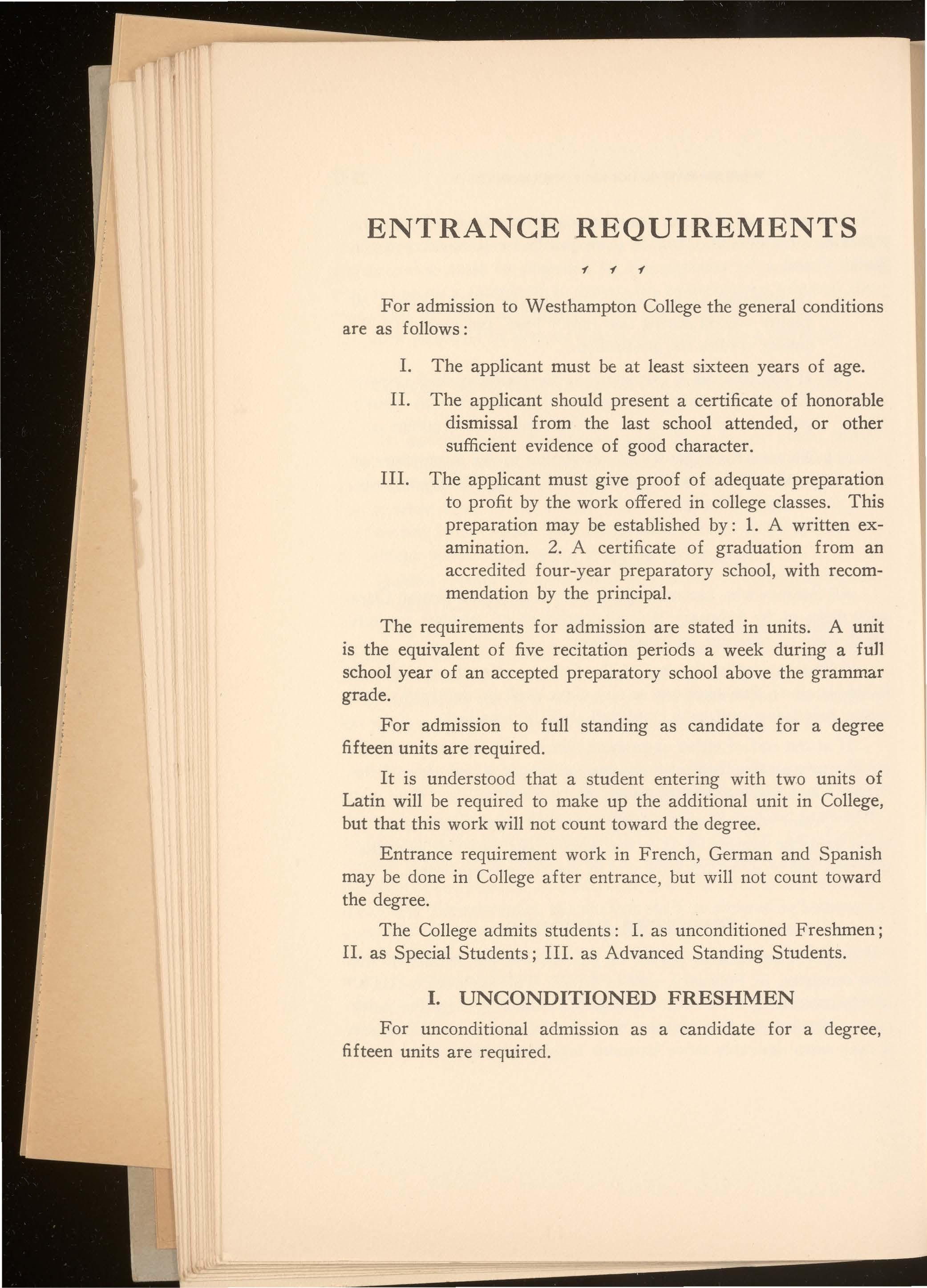
For admission to Westhampton College the general conditions are as follows :
I. The applicant must be at least sixteen years of age.
II. The applicant should present a certificate of honorable dismissal from the last school attended, or other sufficient evidence of good character.
III. The applicant must give proof of adequate preparation to profit by the work offered in college classes. This preparation may be established by: 1. A written examination. 2. A certificate of graduation from an accredited four-year preparatory school, with recommendation by the principal.
The requirements for admission are stated in units. A unit is the equivalent of five recitation periods a week during a full school year of an accepted preparatory school above the grammar grade.
For admission to full standing as candidate for a degree fifteen units are required.
It is understood that a student entering with two units of Latin will be required to make up the additional unit in College, but that this work will not count toward the degree.
Entrance requirement work in French, German and Spanish may be done in College after entrance, but will not count toward the degree.
The College admits students : I. as unconditioned Freshmen; II. as Special Students; III. as Advanced Standing Students.
For unconditional admission as a candidate for a degree, fifteen units are required.
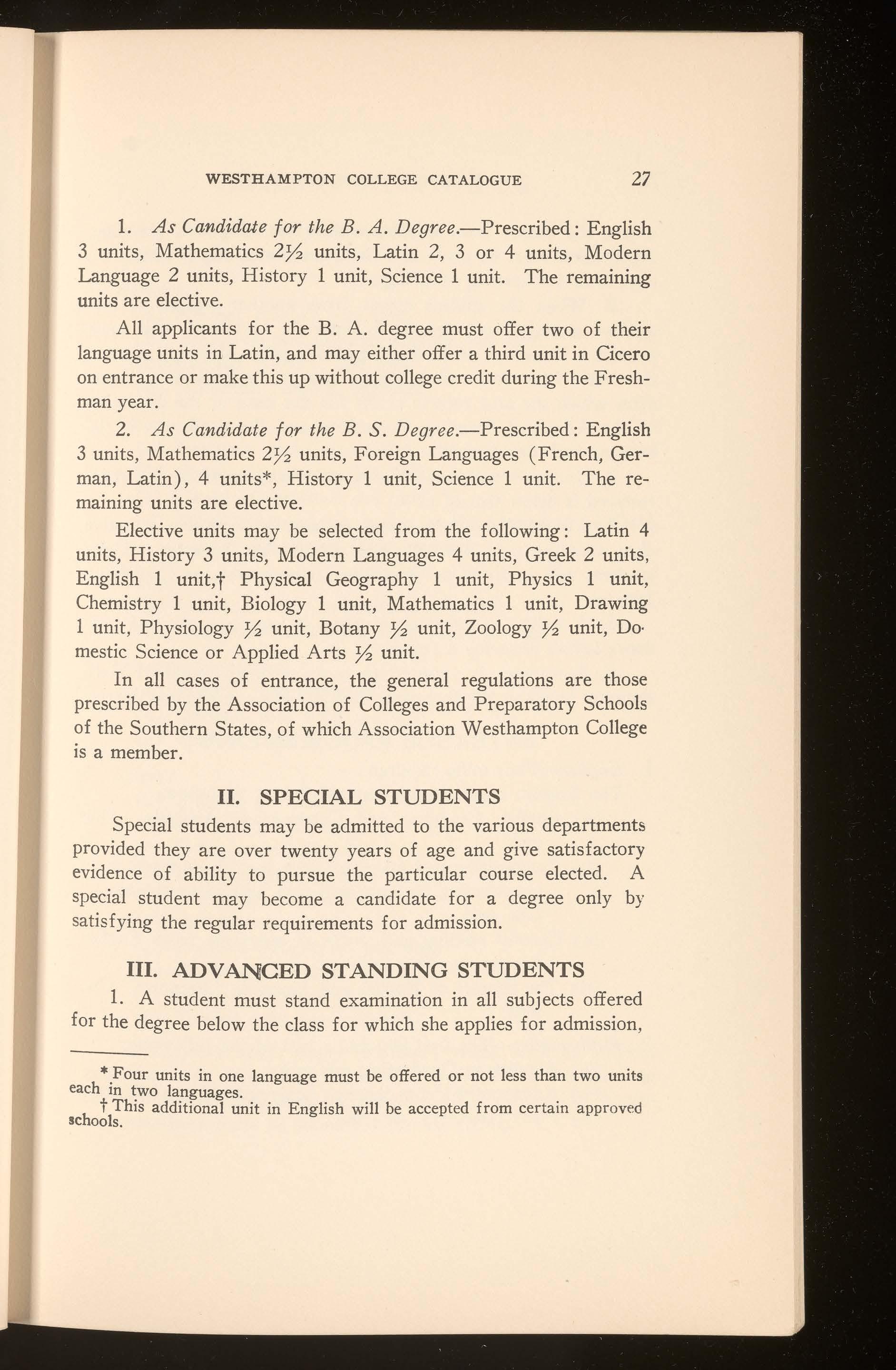
I. As Candidate for the B. A. Degree.-Prescribed: English 3 units, Mathematics 2,½ units, Latin 2, 3 or 4 units, Modern Language 2 units, History 1 unit, Science 1 unit. The remaining units are elective
All applicants for the B. A. degree must offer two of their language units in Latin, and may either offer a third unit in Cicero on entrance or make this up without college credit during the Freshman year
2. As Candidate for the B. S. Degree.-Prescribed: English 3 units, Mathematics 2,½ units, Foreign Languages (French, German, Latin), 4 units*, History 1 unit, Science 1 unit The remaining units are elective.
Elective units may be selected from the following: Latin 4 units, History 3 units, Modern Languages 4 units, Greek 2 units, English 1 unit,t Physical Geography 1 unit, Physics 1 unit, Chemistry 1 unit, Biology 1 unit, Mathematics 1 unit, Drawing 1 unit, Physiology ,½ unit, Botany ,½ unit, Zoology .½ unit, Domestic Science or Applied Arts ,½ unit.
In all cases of entrance, the general regulations are those prescribed by the Association of Colleges and Preparatory Schools of the Southern States, of which Association Westhampton College is a member.
Special students may be admitted to the various departments provided they are over twenty years of age and give satisfactory evidence of ability to pursue the particular course elected. A special student may become a candidate for a degree only by satisfying the regular requirements for admission.
I. A student must stand examination in all subjects offered for the degree below the class for which she applies for admission,
*.Four units in one language must be offered or not less than two units each 1n two languages.
t This additional unit in English will be accepted from certain approved schools.
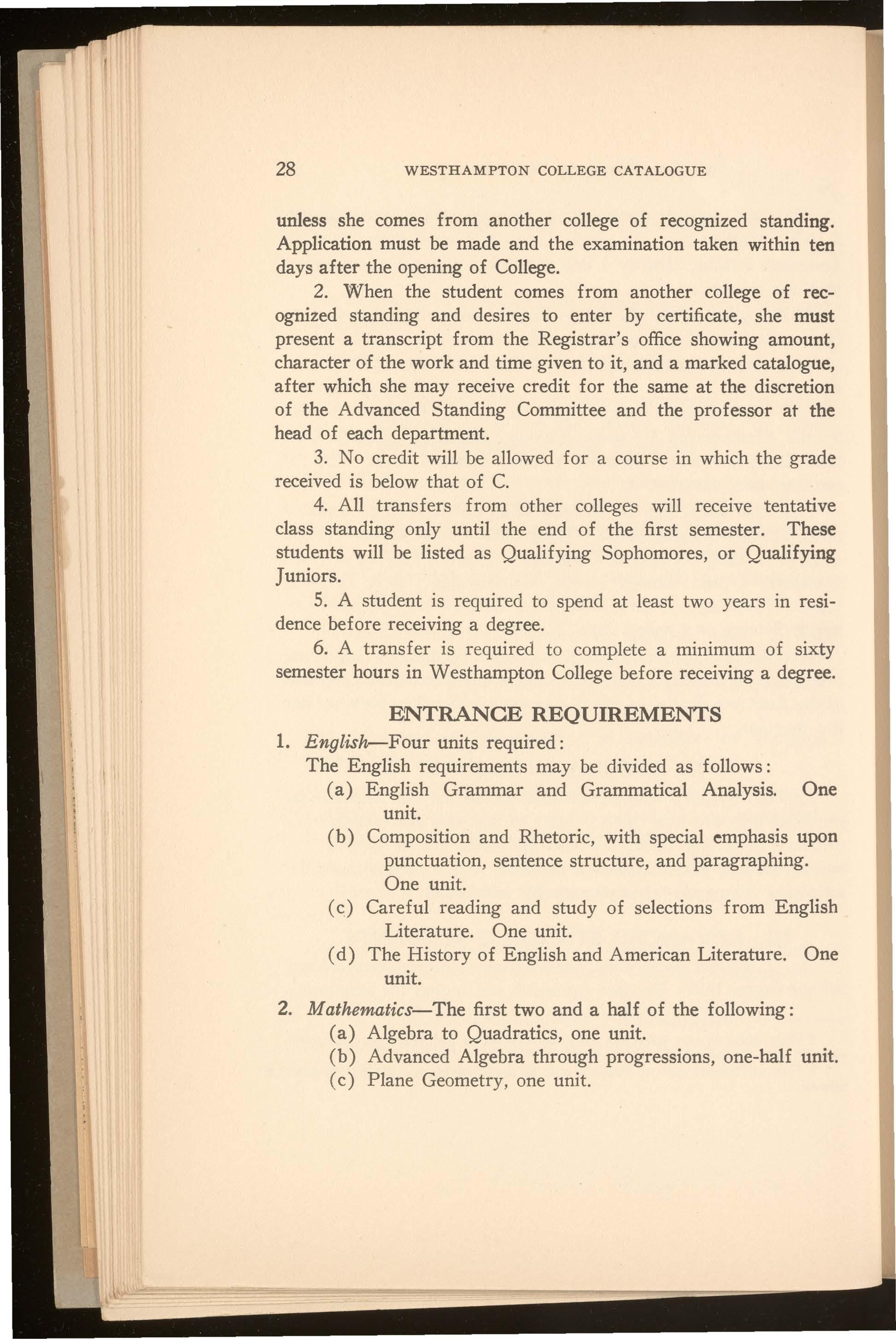
unless she comes from another college of recognized standing. Application must be made and the examination taken within ten days after the opening of College.
2. When the student comes from another college of recognized standing and desires to enter by certificate, she must present a transcript from the Registrar's office showing amount, character of the work and time given to it, and a marked catalogue, after which she may receive credit for the same at the discretion of the Advanced Standing Committee and the professor at the head of each department.
3. No credit will be allowed for a course in which the grade received is below that of C.
4. All transfers from other colleges will receive tentative class standing only until the end of the first semester. These students will be listed as Qualifying Sophomores, or Qualifying Juniors.
5. A student is required to spend at least two years in residence before receiving a degree.
6. A transfer is required to complete a minimum of sixty semester hours in Westhampton College before receiving a degree.
1. English,-Four units required:
The English requirements may be divided as follows:
(a) English Grammar and Grammatical Analysis. One unit.
(b) Composition and Rhetoric, with special emphasis upon punctuation, sentence structure, and paragraphing. One unit.
( c) Careful reading and study of selections from English Literature. One unit.
( d) The History of English and American Literature. One unit.
2. Mathematics-The first two and a half of the following :
(a) Algebra to Quadratics, one unit.
(b) Advanced Algebra through progressions, one-half unit.
( c) Plane Geometry, one unit.
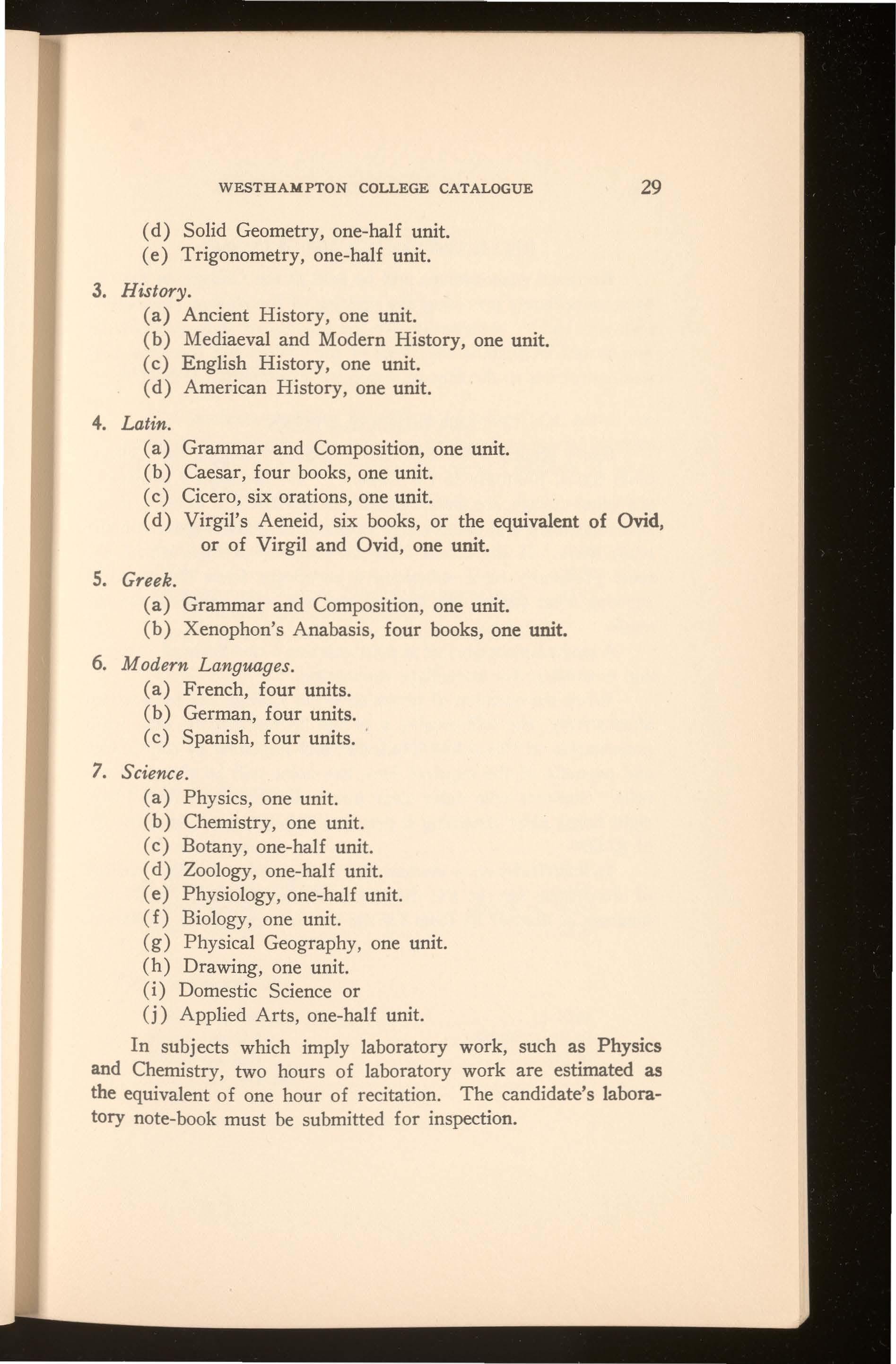
( d) Solid Geometry, one-half unit.
( e) Trigonometry, one-half unit.
3. History.
(a) Ancient History, one unit.
(b) Mediaeval and Modern History, one unit.
( c) English History, one unit.
(d) American History, one unit.
4. Latin.
(a) Grammar and Composition, one unit.
(b) Caesar, four books, one unit.
( c) Cicero, six orations, one unit.
( d) Virgil's Aeneid, six books, or the equivalent of Ovid, or of Virgil and Ovid, one unit.
5. Greek.
(a) Grammar and Composition, one unit.
(b) Xenophon's Anabasis, four books, one unit.
6 Modern Languages.
(a) French, four units.
(b) German, four units.
( c) Spanish, four units.
7. Science.
(a) Physics, one unit.
(b) Chemistry, one unit.
( c) Botany, one-half unit.
( d) Zoology, one-half unit.
( e) Physiology, one-half unit.
( £) Biology, one unit.
(g) Physical Geography, one unit.
(h) Drawing, one unit.
( i) Domestic Science or
(j) Applied Arts, one-half unit.
In subjects which imply laboratory work, such as Physics and Chemistry, two hours of laboratory work are estimated as the equivalent of one hour of recitation. The candidate's laboratory note-book must be submitted for inspection.
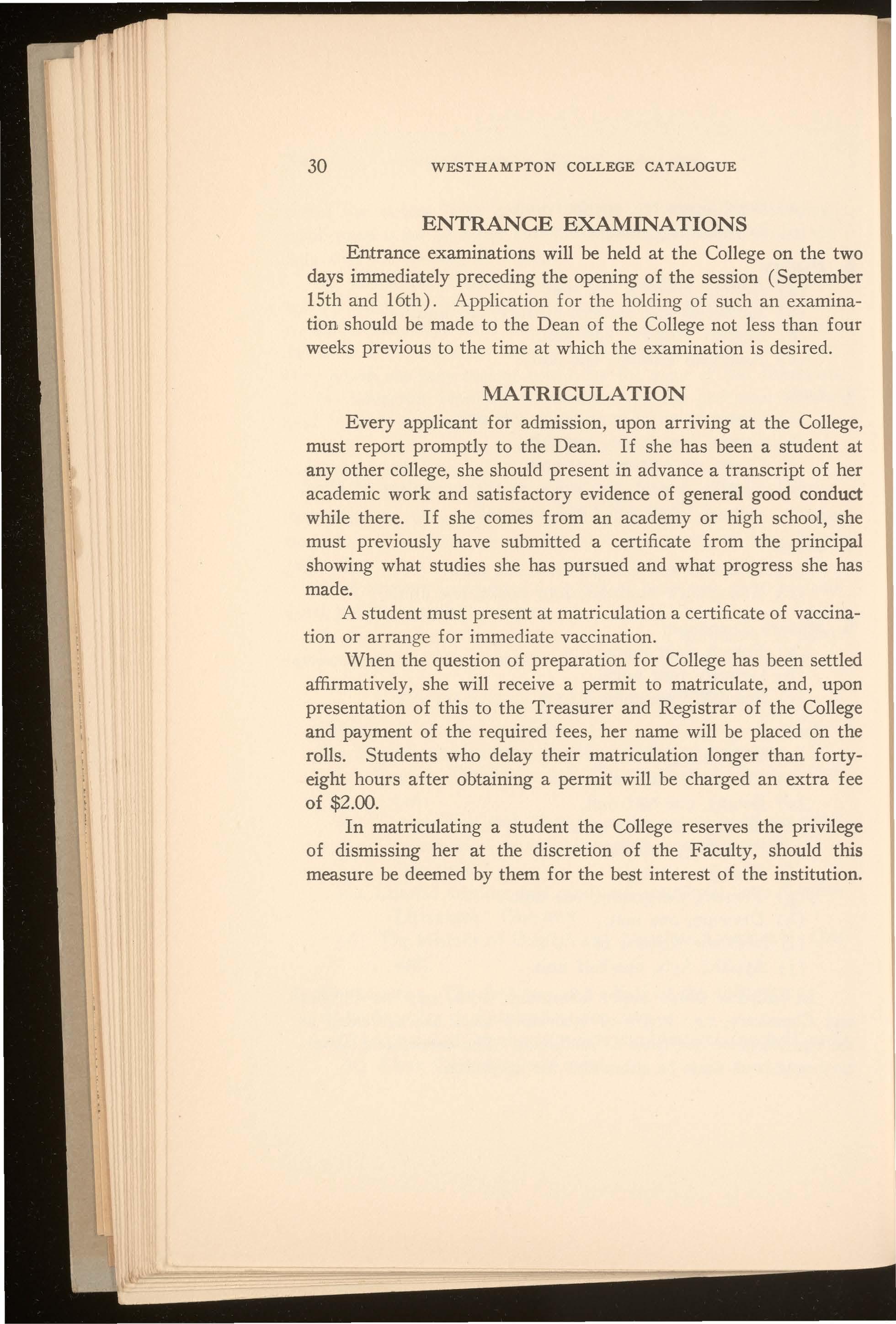
Entrance examinations will be held at the College on the two days immediately preceding the opening of the session ( September 15th and 16th). Application for the holding of such an examination should be made to the Dean of the College not less than four weeks previous to the time at which the examination is desired.
Every applicant for admission, upon arriving at the College , must report promptly to the Dean. If she has been a student at any other college, she should present in advance a transcript of her academic work and satisfactory evidence of general good conduct while there. If she comes from an academy or high school, she must previously have submitted a certificate from the principal showing what studies she has pursued and what progress she has made.
A student must present at matriculation a certificate of vaccination or arran g e for immediate vaccination .
When the question of preparation for College has been settled affirmatively, she will receive a permit to matriculate, and, upon presentation of this to the Treasurer and Registrar of the College and payment of the required fees, her name will be placed on the rolls. Students who delay their matriculation longer than fortyeight hours after obtaining a permit will be charged an extra fee of $2.00.
In matriculating a student the College reserves the privilege of dismissing her at the discretion of the Faculty, should this measure be deemed by them for the best interest of the institution.
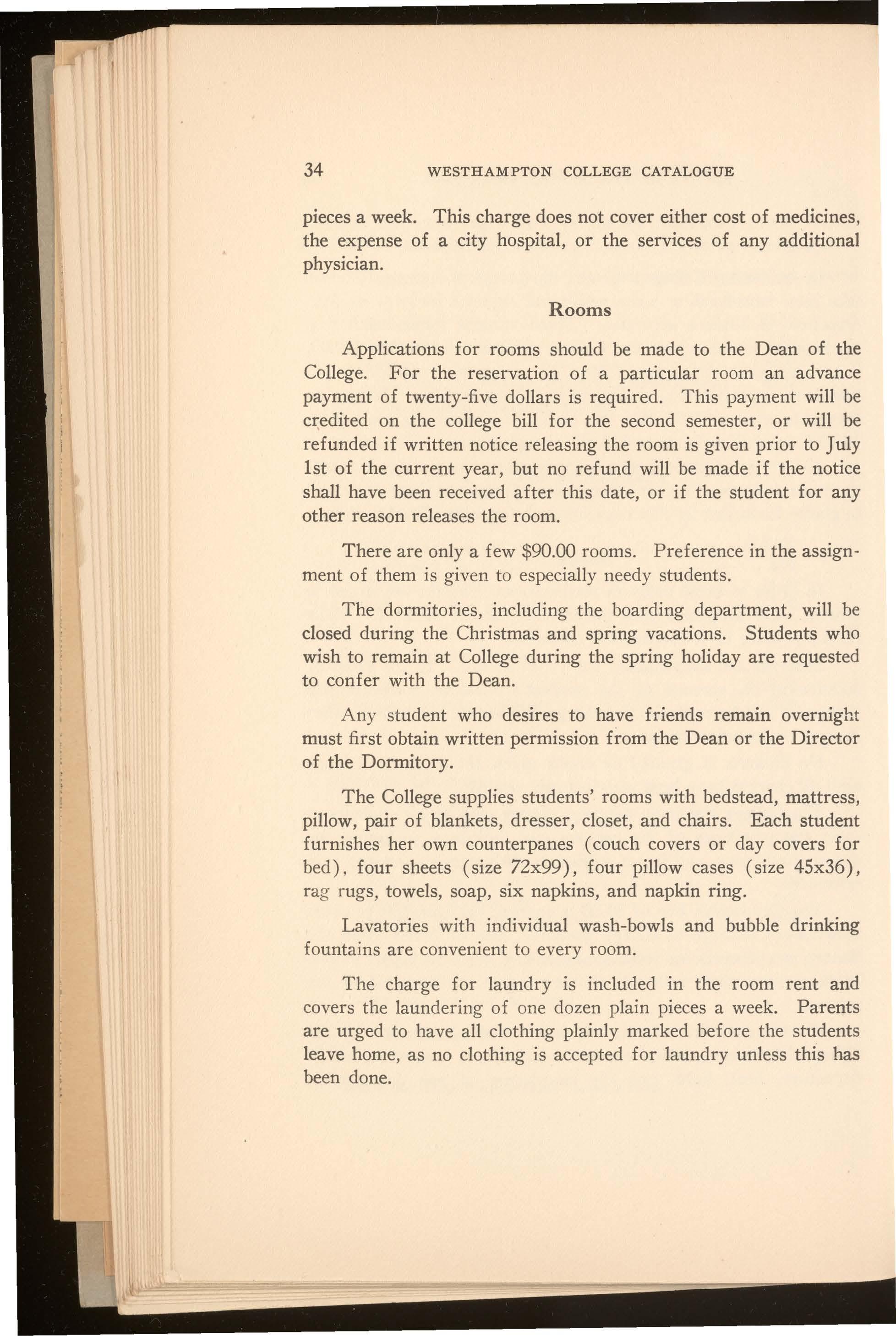
pieces a week. This charge does not cover either cost of medicines, the expense of a city hospital, or the services of any additional physician.
Applications for rooms should be made to the Dean of the College. For the reservation of a particular room an advance payment of twenty-five dollars is required. This payment will be cr:edited on the college bill for the second semester, or will be refunded if written notice releasing the room is given prior to July 1st of the current year, but no refund will be made if the notice shall have been received after this date, or if the student for any other reason releases the room.
There are only a few $90.00 rooms. Preference in the assignment of them is given to especially needy students.
The dormitories, including the boarding department, will be closed during the Christmas and spring vacations. Students who wish to remain at College during the spring holiday are requested to confer with the Dean.
Any student who desires to have friends remain overnight must first obtain written permission from the Dean or the Director of the Dormitory.
The College supplies students' rooms with bedstead, mattress, pillow, pair of blankets, dresser, closet, and chairs. Each student furnishes her own counterpanes ( couch covers or day covers for bed) , four sheets ( size 72x99), four pillow cases ( size 4Sx36), ra g rugs, towels, soap, six napkins, and napkin ring.
Lavatories with individual wash-bowls and bubble drinking fountains are convenient to every room.
The charge for laundry is included in the room rent and covers the laundering of one dozen plain pieces a week. Parents are urged to have all clothing plainly marked before the students leave home, as no clothing is accepted for laundry unless this has been done.

The candidate for a bachelor's degree is required to attain 124 semester hours, an hour being the value of one class hour of work per week through the semester. Four hours of the 124 are required in the Department of Physical Education. Fifteen hours per week are regarded as the standard amount of work, twelve hours the minimum and eighteen hours the maximum. The 124 semester hours required are distributed as follows :
I. Courses required of all candidates for the degree:
Latin A or 1-2, six semester hours, taken in the Freshman year.
Mathematics 1-2, six semester hours, taken in the Freshman year.
English 1-2 and 3-4, twelve semester hours, taken in the Freshman and Sophomore years.
History, six semester hours, taken in the Freshman or the Sophomore year.
Botany 1-2 or Zoology 1-2, Chemistry 1-2, or Physics 1-2, ten semester hours in each of two departments, taken in the Freshman, the Sophomore, or the Junior year.
French 3-4, German 3-4, or Spanish 3-4, six semester hours, a continuation of the Modern Language offered for entrance, taken in the Freshman or the Sophomore year.
French 1-2, German 1-2, or Spanish 1-2, six semester hours, a Modern Language not offered for entrance, taken in the Sophomore or the Junior year.
Physical Education, four semester hours.
(This required work makes a total of sixty-six semester hours.)
II. The student must, before the end of the Sophomore year, choose a major subject and a related minor, the choice to be approved by the Dean and the Head of the Department concerned.

.
Majors and suggested minors may be chosen from the following list :
( 1) Thirty semester hours in Biology.
Twenty semester hours in Chemistry.
Eighteen semester hours in Mathematics.
Twenty semester hours in Physics.
Eighteen semester hours in Psychology
( 2) Thirty semester hours in Chemistry.
Twenty semester hours in Biology
Eighteen semester hours in Mathematics.
Twenty semester hours in Physics.
(3) Twenty-four semester hours in English.
Eighteen semester hours in French
Eighteen semester hours m German .
Eighteen semester hours in Greek.
Eighteen semester hours in History.
Eighteen semester hours in Latin.
Eighteen semester hours in Spanish.
( 4) Twenty-four semester hours in French.
Eighteen semester hours in English.
Eighteen semester hours in German
Eighteen semester hours in History
Eighteen semester hours in Latin.
Eighteen semester hours in Spanish
( 5) Twenty-four semester hours in German.
Eighteen semester hours in English.
Eighteen semester hours in French.
Eighteen semester hours in Greek.
Eighteen semester hours in History .
Eighteen semester hours in Latin.
Eighteen semester hours in Spanish.
(6) Twenty-four semester hours in Greek.
Eighteen semester hours in English
Eighteen semester hours in French.
Eighteen semester hours in German.
Eighteen semester hours in Latin
Eighteen semester hours in Spanish.
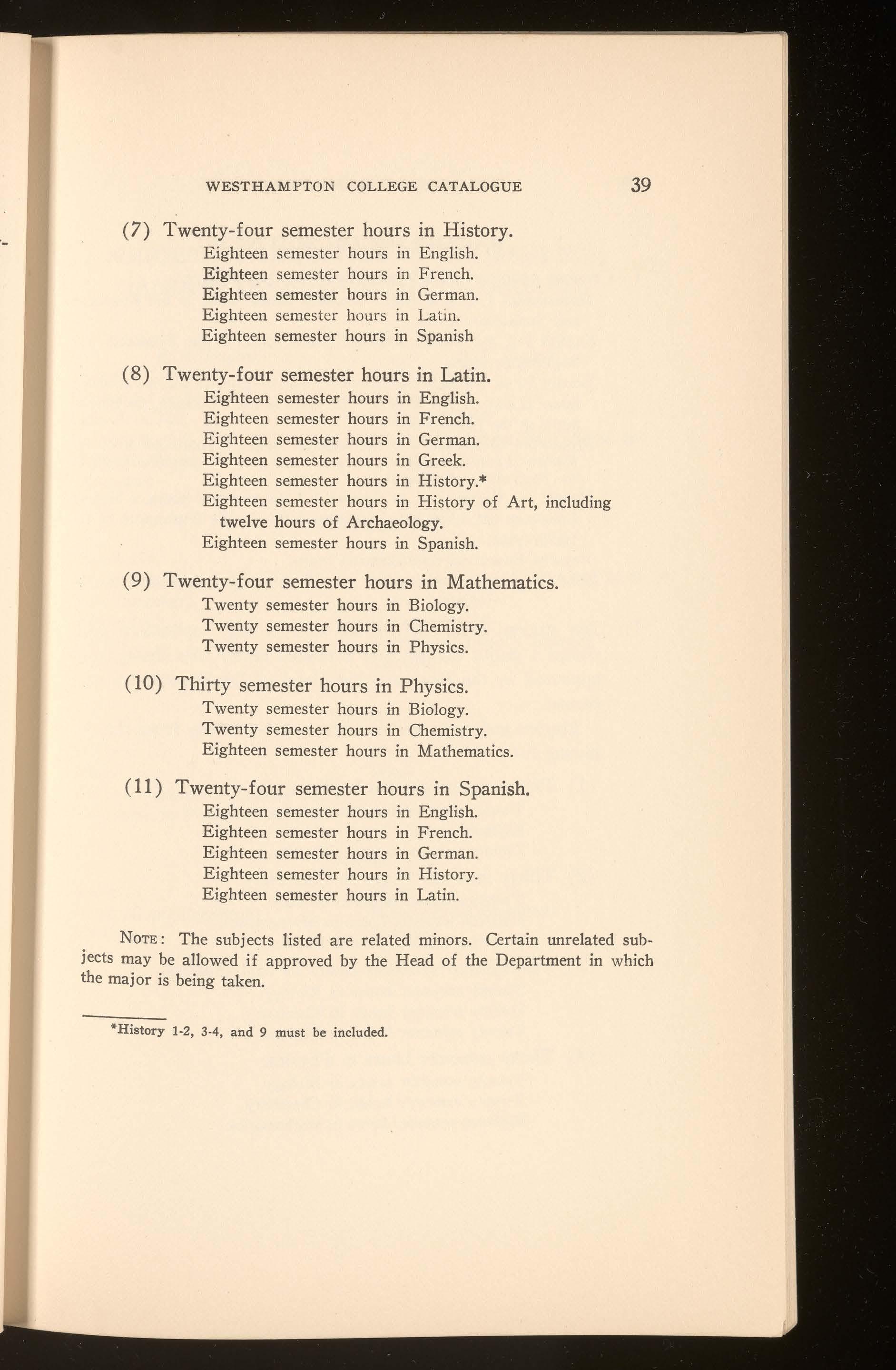
(7) Twenty-four semester hours in History.
Eighteen semester hours in English.
Eighteen semester hours in French .
Eighteen semester hours in German
Eighteen semest e r hours in La t in.
Eighteen semester hours in Spanish
(8) Twenty-four semester hours in Latin.
Eighteen semester hours in English
Eighteen semester hours in French.
Eighteen semester hours in German.
Eighteen semester hours m Greek.
Eighteen semester hours in History *
Eighteen semester hours in History of Art, including twelve hours of Archaeology.
Eighteen semester hours in Spanish.
(9) Twenty-four semester hours in Mathematics.
Twenty semester hours in Biology.
Twenty semester hours in Chemistry.
Twenty semester hours in Physics
(10) Thirty semester hours in Physics.
Twenty semester hours in Biology .
Twenty semester hours in Chemistry
Eighteen semester hours in Mathematics.
( 11) Twenty-four semester hours in Spanish.
Eighteen semester hours in English .
Eighteen semester hours in French .
Eighteen semester hours in German
Eighteen semester hours in History.
Eighteen semester hours in Latin
NoTE: The subjects listed are related minors Certain unrelated subjects may be allowed if approved by the Head of the Department in which the major is being taken.
*History 1-2, 3-4, and 9 must be included
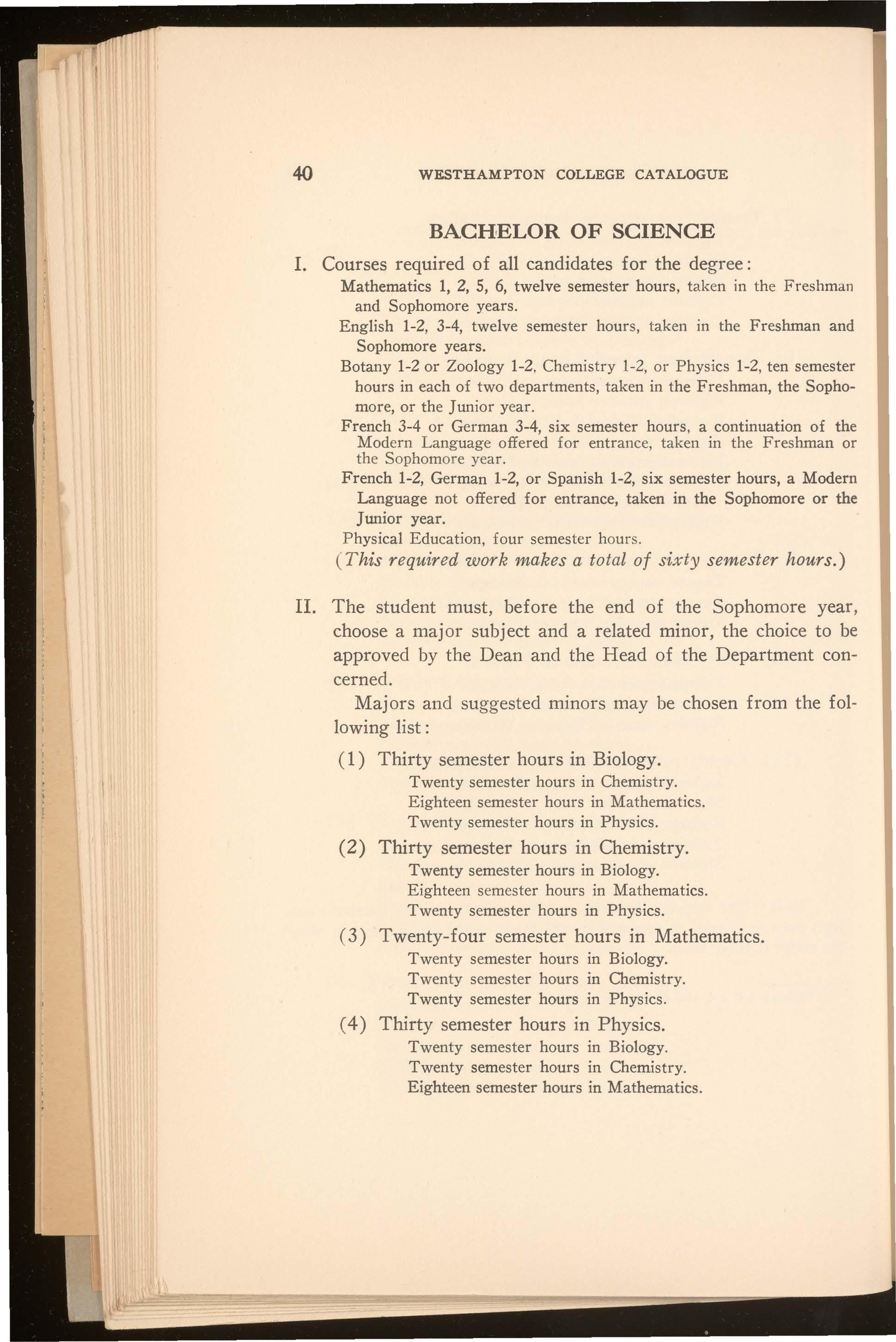
I. Courses required of all candidates for the degree : Mathematics 1, 2, 5, 6, twelve semester hours, tak en in th e Freshman and Sophomore years .
English 1-2, 3-4, twelve semester hour s, tak en in the Freshman and Sophomore years.
Botany 1-2 or Zoology 1-2, Ch emistry 1-2, or Physics 1-2, ten semester hours in each of two departments, taken in the Freshman, the Sophomore, or the Junior y ear
French 3-4 or German 3-4, six semester hours , a continuation of the Mod ern Languag e offered for entr a n ce, taken in the Fre shman or th e S ophom or e y ear.
French 1-2, German 1-2, or Spanish 1-2, six semester hours, a Modern Language not offered for entrance, taken in the Sophomore or the Junior year.
Physical Edu cation, four semester h ours.
( This required work makes a total of sixty semester hours.)
II. The student must, before the end of the Sophomore year , choose a major subject and a related minor, the choice to be approved by the Dean and the Head of the Department concerned.
Majors and suggested minors may be chosen from the following list :
( 1) Thirty semester hours in Biology.
Twenty semester hours in Chemistry
Eighteen semester hours in Mathematics
Twenty semester hours in Physics.
(2) Thirty semester hours in Chemistry.
Twenty semester hours in Biology.
Eighteen semester hours in Mathematics .
Twenty semester hours in Physics.
( 3) Twenty-four semester hours in Mathematics.
Twenty semester hours in Biology.
Twenty semester hours in Chemistry
Twenty semester hours in Physics.
( 4) Thirty semester hours in Physics.
Twenty semester hours in Biology
Twenty semester hours in Chemistry.
Eighteen semester hours in Mathematics.
FRESHMAN
B. A. Degree
English 1-2
History 1-2 or Science 1-2
Latin A or 1-2.
Mathematics 1-2
Modern Language 3-4 ( offered for entrance)
English 3-4

B. S. Degree
English 1-2
History 1-2
Mathematics 1-2
Modern Languages 3-4 (offered for entrance)
Science 1-2
SOPHOMORE
English 3-4
Modern Language 1-2 (second Mod- Modern Language 1-2 (second Modern Language)
Science 1-2
Elective
Elective
ern Language)
Mathematics 5-6
Science 1-2 (second Science)
Elective
JUNIOR
Major
Minor
Electives (including Science 1-2, if not taken in Freshman year)
Major
Minor ( if not completed) Electives
Major Minor Electives
SENIOR
Major
Minor (if not completed) Electives
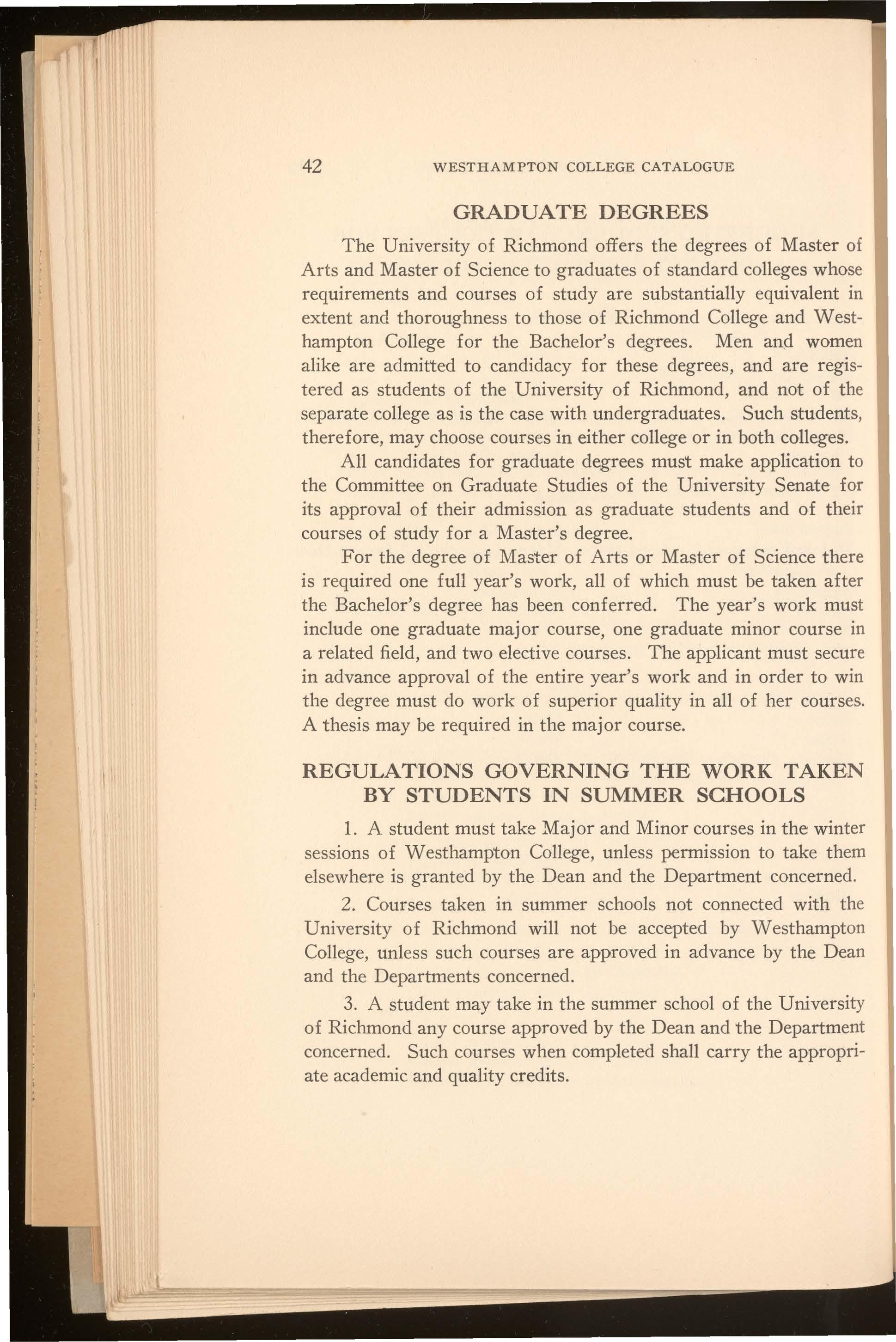
The University of Richmond offers the degrees of Master of Arts and Master of Science to graduates of standard colleges whose requirements and courses of study are substantially equivalent in extent and thoroughness to those of Richmond College and Westhampton College for the Bachelor's degrees. Men and women alike are admitted to candidacy for these degrees, and are registered as students of the University of Richmond, and not of the separate college as is the case with undergraduates. Such students, therefore, may choose courses in either college or in both colleges.
All candidates for graduate degrees must make application to the Committee on Graduate Studies of the University Senate for its approval of their admission as graduate students and of their courses of study for a Master's degree.
For the degree of Master of Arts or Master of Science there is required one full year's work, all of which must be taken after the Bachelor's degree has been conferred. The year's work must include one graduate major course, one graduate minor course in a related field, and two elective courses. The applicant must secure in advance approval of the entire year's work and in order to win the degree must do work of superior quality in all of her courses. A thesis may be required in the major course.
1. A student must take Major and Minor courses in the winter sessions of Westhampton College, unless permission to take them elsewhere is granted by the Dean and the Department concerned.
2. Courses taken in summer schools not connected with the University of Richmond will not be accepted by Westhampton College, unless such courses are approved in advance by the Dean and the Departments concerned.
3. A student may take in the summer school of the University of Richmond any course approved by the Dean and the Department concerned. Such courses when completed shall carry the appropriate academic and quality credits.

INSTRUCTORPOLLAK
INSTRUCTORDANIEL
1-2 ( 4) DRAWINGAND FIGURE SKETCHING.-Principles of composition and the underlying laws of perspective. Work is mainly from the living model with emphasis on a thorough understanding of the construction of the human figure through the study of the elements of anatomy, proportion, form and movement. Media: charcoal, pencil, ink, pastel, oil. First semester.
Pastel drawing is introduced and painting in oil is given to the individual student whenever the Instructor deems the student 'to be ready for this medium. Second semester. Four hours a week.
3-4 ( 4) ADVANCEDFIGURE SKETCHING.-More difficult composition assignments are given, and oil is mainly the medium. Four hours a week.
5-6 (2) INTERIORDECORATION.-This course deals with the historical periods of furniture and the principles of design underlying the tasteful arrangement of the home. One hour a week.
7 ( 3) INTRODUCTORYCouRSE IN THE HISTORYOF ART.-This course aims to lay foundations for further study of the history of art, being concerned primarily with classic art, its predecessors, and its part in later developments in the art of Europe. Three hours a week .
8 ( 3) PAINTING OF THE ITALIAN RENAISSANCE.-A study of the schools of Italian painting from the Tuscan beginnings through the High Renaissance in Venice, taking into account certain relations with the contemporary painting of the North. Three hours a week.
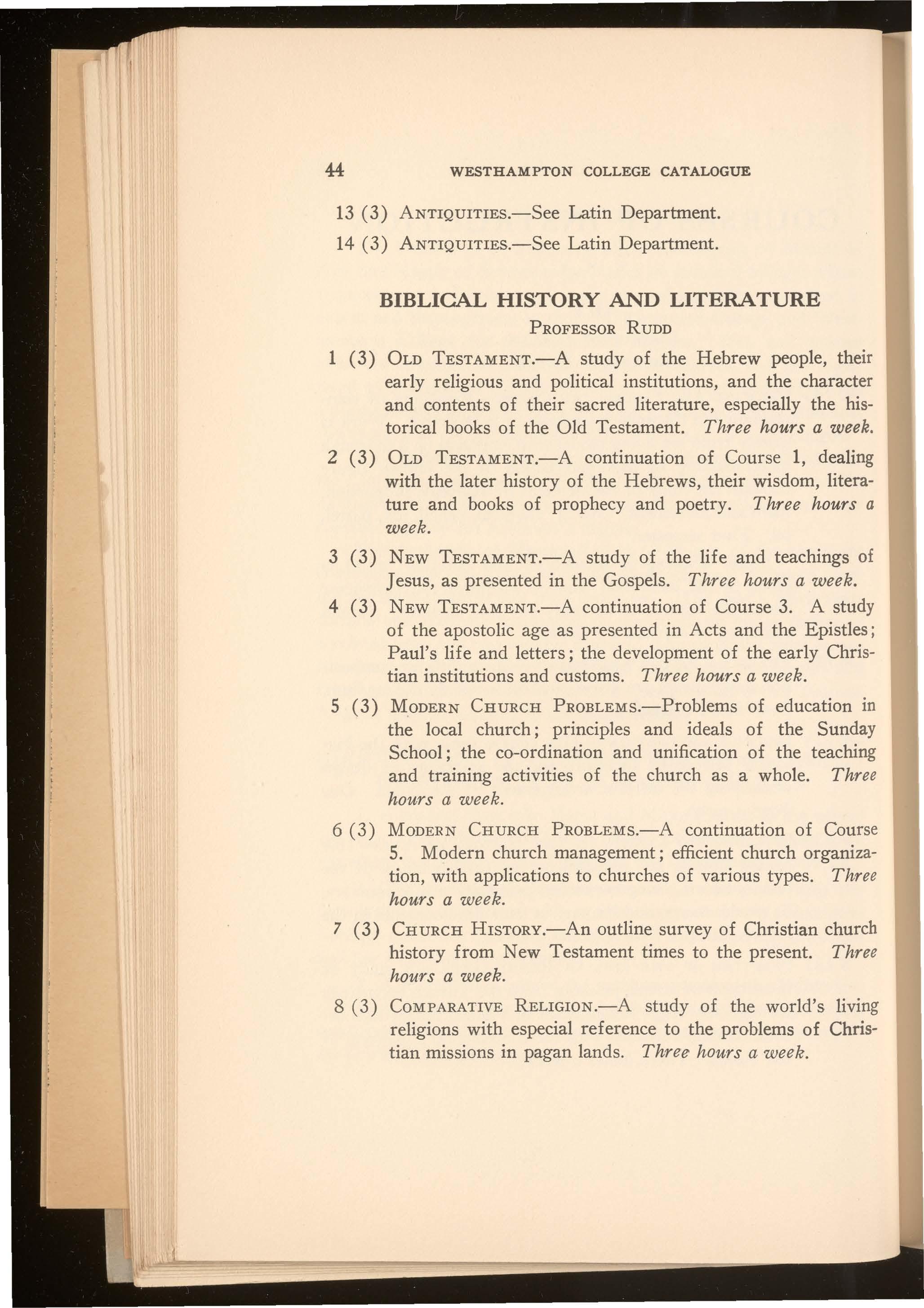
13 ( 3) ANTIQUITIEs.-See Latin Department.
14 (3) ANTIQUITIEs.-See Latin Department.
1 (3) Ow TESTAMENT.-A study of the Hebrew people, their early religious and political institutions, and the character and contents of their sacred literature, especially the historical books of the Old Testament. Three hours a week.
2 (3) Ow TESTAMENT.-A continuation of Course 1, dealing with the later history of the Hebrews, their wisdom, literature and books of prophecy and poetry. Three hours a week.
3 (3) NEW TESTAMENT.-A study of the life and teachings of Jesus, as presented in the Gospels. Three hours a week.
4 (3) NEW TESTAMENT.-A continuation of Course 3. A study of the apostolic age as presented in Acts and the Epistles; Paul's life and letters; the development of the early Christian institutions and customs. Three hours a week.
5 (3) MODERNCHURCH PROBLEMs.-Problems of education in the local church; principles and ideals of the Sunday School; the co-ordination and unification of the teaching and training activities of the church as a whole. Three hours a week
6 ( 3) MODERNCHURCH PROBLEMS.-A continuation of Course 5. Modern church management; efficient church organization, with applications to churches of various types. Three hours a week.
7 (3) CHURCH HrsTORY.-An outline survey of Christian church history from New Testament times to the present. Three hours a week.
8 (3) COMPARATIVERELIGION.-A study of the world's living religions with especial reference to the problems of Christian missions in pagan lands. Three hours a week.
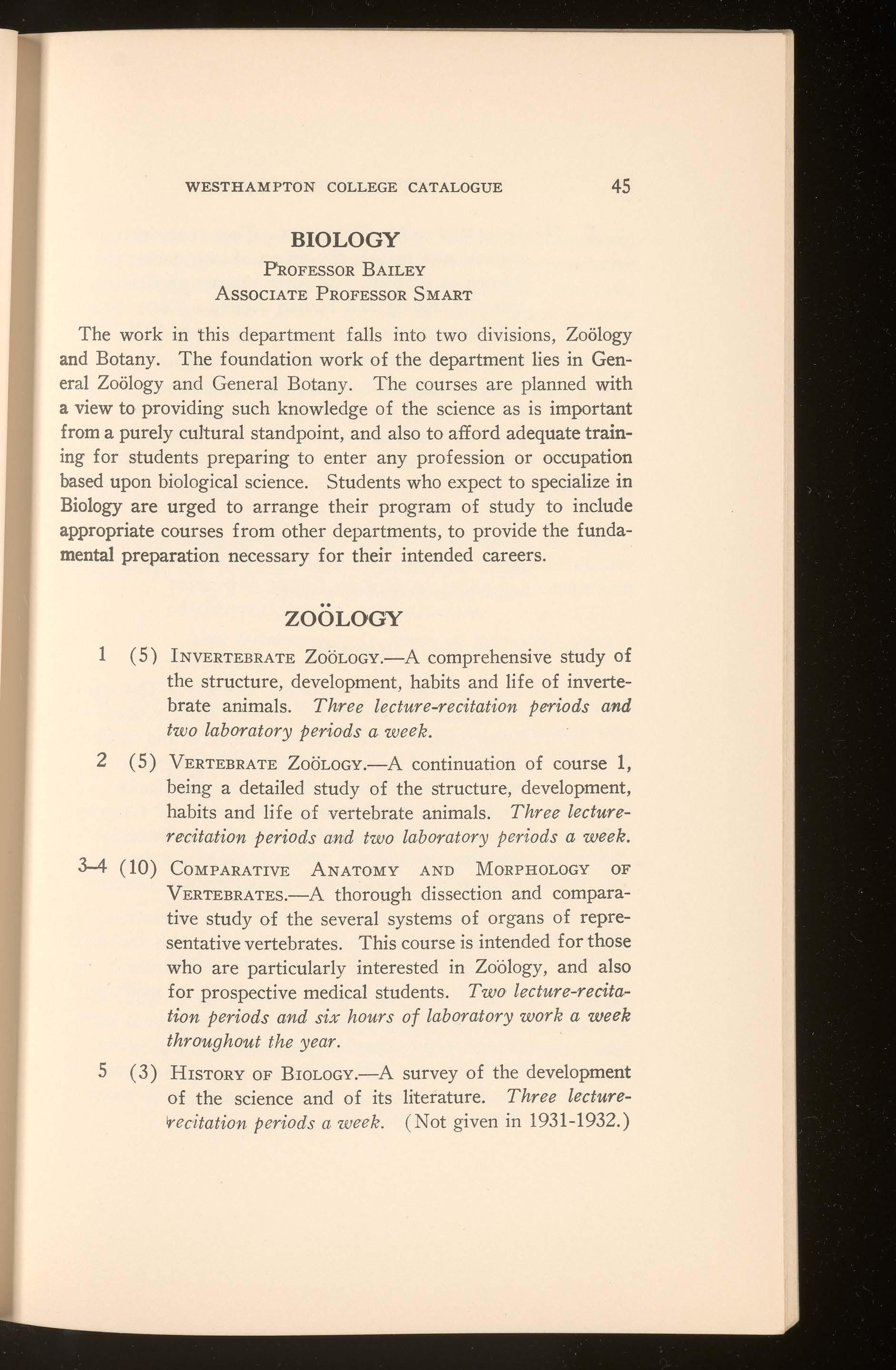
PROFESSORBAILEY ASSOCIATEPROFESSORSMART
The work in this department falls into two divisions, Zoology and Botany. The foundation work of the department lies in General Zoology and General Botany. The courses are planned with a view to providing such knowledge of the science as is important from a purely cultural standpoint, and also to afford adequate training for students preparing to enter any profession or occupation based upon biological science. Students who expect to specialize in Biology are urged to arrange their program of study to include appropriate courses from other departments, to provide the fundamental preparation necessary for their intended careers.
1 (5) INVERTEBRATEZo6LOGY.-A comprehensive study of the structure, development, habits and life of invertebrate animals. Three lecture-recitation periods and two laboratory periods a week.
2 (5) VERTEBRATEZociLOGY.-A continuation of course 1, being a detailed study of the structure, development, habits and life of vertebrate animals. Three lecturerecitation periods and two laboratory periods a week.
3-4 (10) COMPARATIVEANATOMY AND MORPHOLOGYOF VERTEBRATEs.-A thorough dissection and comparative study of the several systems of organs of representative vertebrates. This course is intended for those who are particularly interested in Zoology, and also for prospective medical students. Two lecture-recitation periods and six hours of laboratory work a week throughout the year.
5 (3) HISTORYOF BIOLOGY.-A survey of the development of the science and of its literature. Three lecture'lrecitationperiods a week. (Not given in 1931-1932.)
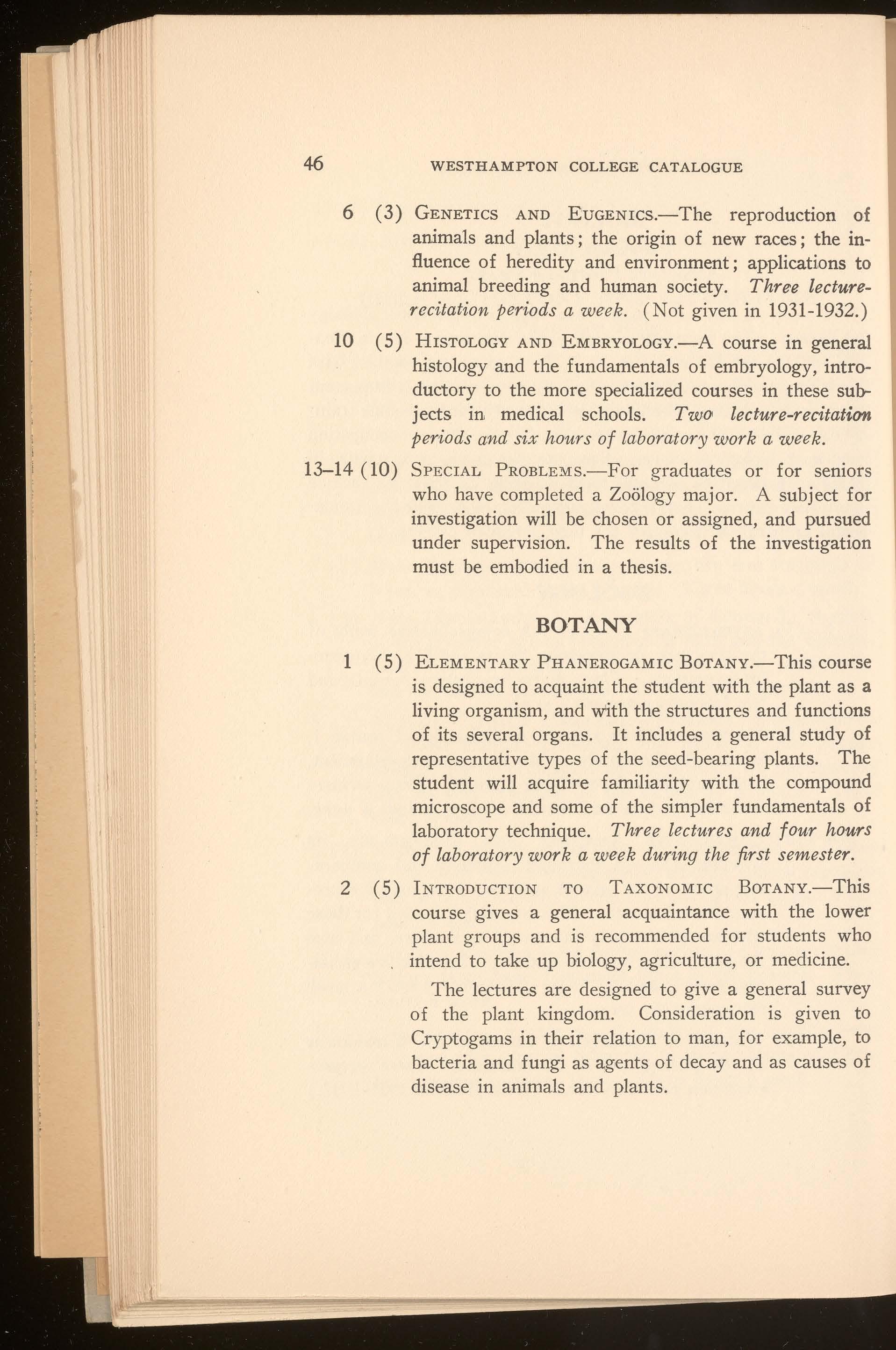
6 ( 3) GENETICS AND EuGENICS.-The reproduction of animals and plants; the origin of new races; the influence of heredity and environment; applications to animal breeding and human society. Three lecturerecitation periods a week. (Not given in 1931-1932.)
10 ( S) HISTOLOGYAND EMBRYOLOGY.-Acourse in general histology and the fundamentals of embryology, introductory to the more specialized courses in these subj ects in medical schools. Two lecture-recitation periods and six hours of laboratory work a week.
13-14 (10) SPECIAL PROBLE~s.-For graduates or for seniors who have completed a Zoolo,gy major. A subject for investigation will be chosen or assigned, and pursued under supervision. The results of the investigation must be embodied in a thesis.
1 (S) ELEMENTARYPHANEROGAMICBoTANY.-This course is designed to acquaint the student with the plant as a living organism, and w'ith the structures and functions of its several organs. It includes a general study of representative types of the seed-bearing plants. The student will acquire familiarity with the compound microscope and some of the simpler fundamentals of laboratory technique. Three lectures and four hours of laboratory work a week during the first semester.
2 (S) INTRODUCTION TO TAXONOMIC BoTANY.-This course ,gives a general acquaintance with the lower plant groups and is recommended for students who intend to take up biolo,gy, agriculture, or medicine. The lectures are designed to give a general survey of the plant kingdom. Consideration is given to Cryptogams in their relation to man, for example, to bacteria and fungi as a.gents of decay and as causes of disease in animals and plants.
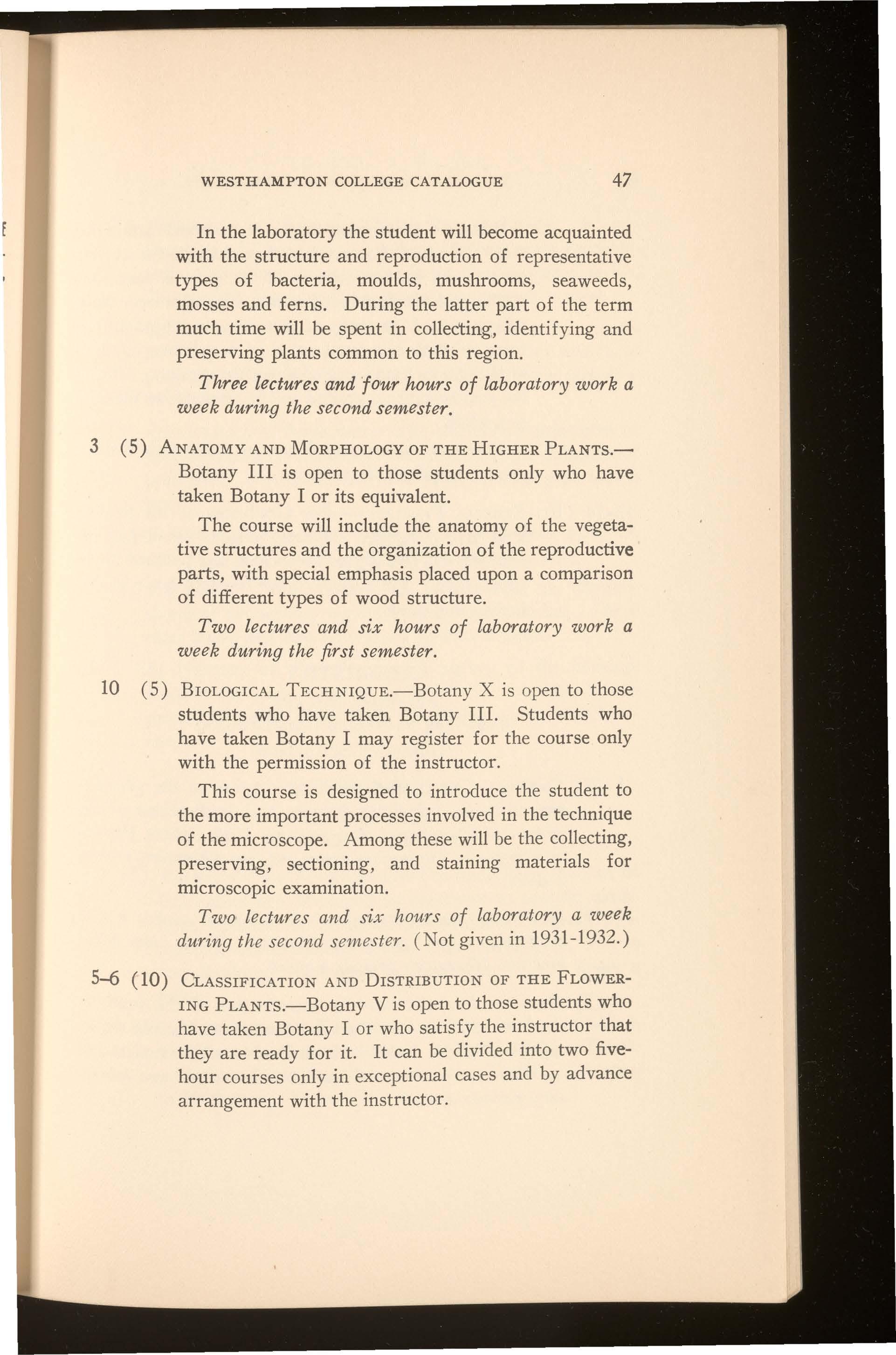
In the laboratory the student will become acquainted with the structure and reproduction of representative types of bacteria, moulds, mushrooms, seaweeds, mosses and ferns. During the latter part of the term much time will be spent in collecting, identifying and preserving plants common to this region.
Three lectures and four hours of laboratory work a week during the second semester.
3 ( 5) ANATOMYANDMORPHOLOGYOFTHE HIGHERPLANTS.-
Botany III is open to those students only who have taken Botany I or its equivalent.
The course will include the anatomy of the vegetative structures and the organization of the reproductive parts, with special emphasis placed upon a comparison of different types of wood structure.
Two lectures and six hours of laboratory work a week during the first semester.
10 (5) BIOLOGICALTECHNIQUE.-Botany Xis open to those students who have taken Botany III. Students who have taken Botany I may register for the course only with the permission of the instructor.
This course is designed to introduce the student to the more important processes involved in the technique of the microscope. Among these will be the collecting, preserving, sectioning, and staining materials for microscopic examination.
Two , lectures and six hours of laboratory a week during the second semester. (Not given in 1931-1932.)
5-6 ( 10) CLASSIFICATIONANDDISTRIBUTIONOF THE FLOWERING PLANTs.-Botany Vis open to those students who have taken Botany I or who satisfy the instructor that they are ready for it. It can be divided into two fivehour courses only in exceptional cases and by advance arrangement with the instructor.
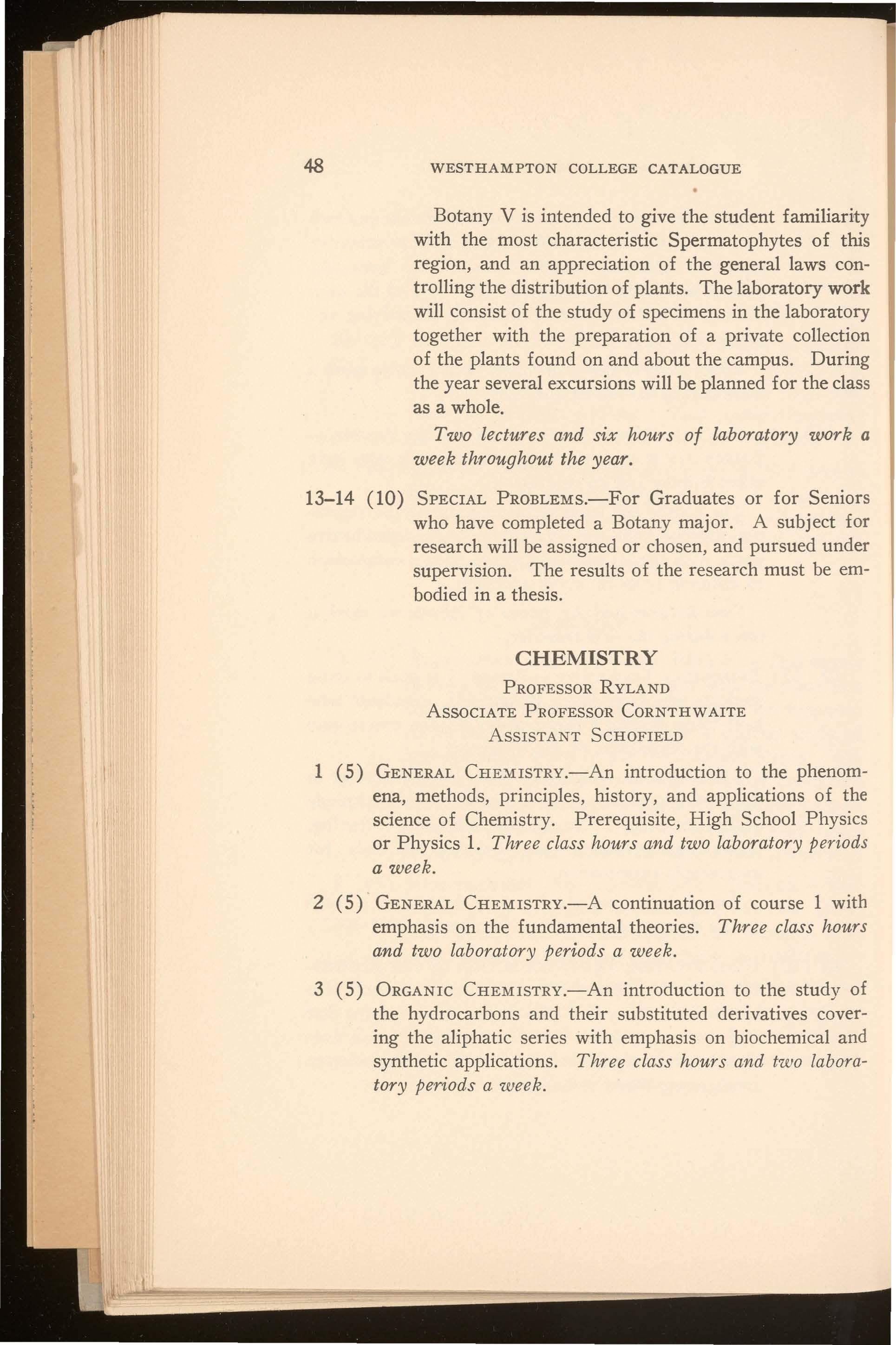
Botany V is intended to give the student familiarity with the most characteristic Spermatophytes of this region, and an appreciation of the general laws controlling the distribution of plants. The laboratory work will consist of the study of specimens in the laboratory together with the preparation of a private collection of the plants found on and about the campus. During the year several excursions will be planned for the class as a whole.
Two lectures and siz hours of laboratory work a week throughout the year.
13-14 (10) SPECIAL PROBLEMS.-For Graduates or for Seniors who have completed a Botany major. A subject for research will be assigned or chosen, and pursued under supervision. The results of the research must be embodied in a thesis.
PROFESSORRYLAND
AssocIATE PROFESSORCoRNTHWAITE
ASSISTANTSCHOFIELD
1 (5) GENERALCHEMISTRY.-An introduction to the phenomena, methods, principles, history, and applications of the science of Chemistry. Prerequisite, High School Physics or Physics 1. Three class hours and two laboratory periods a week.
2 ( 5) GENERALCHEMISTRY.-A continuation of course 1 with emphasis on the fundamental theories. Three class hours and two laboratory periods a week.
3 (5) ORGANICCHEMISTRY.-An introduction to the study of the hydrocarbons and their substituted derivatives covering the aliphatic series with emphasis on biochemical and synthetic applications. Three class hours and two laboratory periods a week.
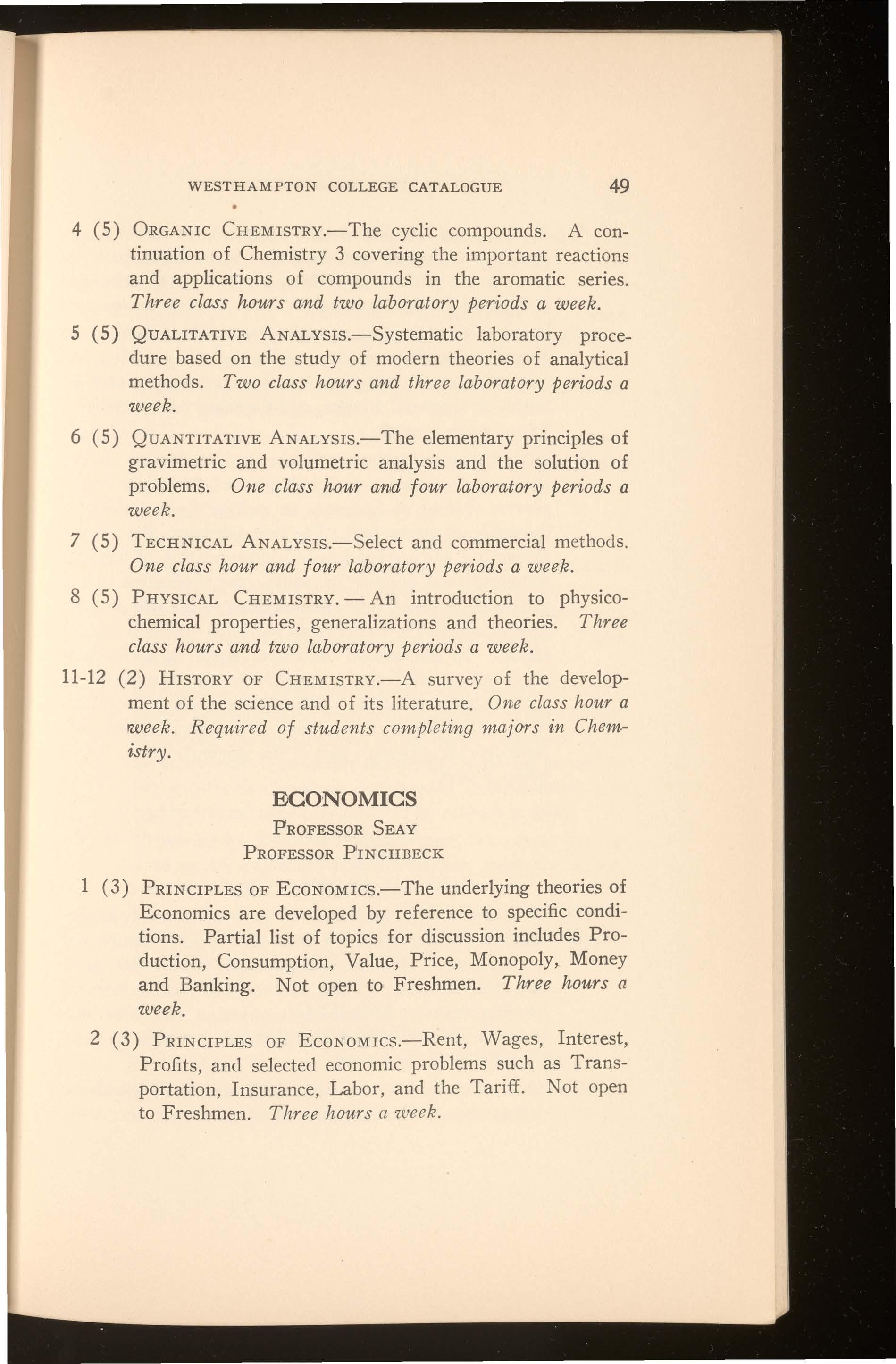
4 (5) ORGANIC CHEMISTRY.-The cyclic compounds. A continuation of Chemistry 3 covering the important reactions and applications of compounds in the aromatic series. Three class hours and two laboratory periods a week.
5 (5) QUALITATIVEANALYSis.-Systematic laboratory procedure based on the study of modern theories of analytical methods. Two class hours and three laboratory periods a week.
6 (5) QUANTITATIVEANALYSis.-The elementary principles of gravimetric and volumetric analysis and the solution of problems. One class hour and four laboratory periods a week.
7 (5) TECHNICAL ANALYSis.-Select and commercial methods. One class hour and four laboratory periods a week.
8 ( 5) PHYSICAL CHEMISTRY. - An introduction to physicochemical properties, generalizations and theories. Three class hours and two laboratory periods a week.
11-12 (2) HISTORY OF CHEMISTRY.-A survey of the development of the science and of its literature. One class hour a rweek. Required of students completing majors in Chemistry.
PROFESSORSEAy
PROFESSORPINCHBECK
1 (3) PRINCIPLESOF EcoNOMICs.-The underlying theories of Economics are developed by reference to specific conditions. Partial list of topics for discussion includes Production, Consumption, Value, Price, Monopoly, Money and Banking. Not open to Freshmen. Three hours a week.
2 (3) PRINCIPLES oF EcoNOMics.-Rent, Wages, Interest, Profits, and selected economic problems such as Transportation, Insurance, Labor, and the Tariff. Not open to Freshmen. Three hours a week.

3 ( 3) Mo NEY AND BANKING.-A study of the history and problems of money and banking. Especial attention is given to the philosophy of bank credit and the principles underlying foreign exchange. Three hours a week.
4 ( 3) FEDERALRESERVEBANKING SYSTEM.-Organization and Functions of Federal Reserve Banks. In addition, the main features of the Canadian banking system and the banks of England, France, and Germany are considered. Th'iree hours a week.
5-6 (6) PRINCIPLES OF AccouNTING.-An introduction to the study of accounting, designed to meet the needs of the general student of business, as well as those seeking to specialize in accounting. The first semester: the uses of accounting, the preparation and interpretation of financial statements and practice in making the application of th e principles of double entry bookkeeping to the sole proprietorship and to the partnership forms of business organization. In the second semester, work upon financial statements is continued in relation to the manufacturing type of business and to the corporate form of organization. Throughout these courses the practice set will constitute an important part of the student's work. Three hours a week.
PROFESSOR PRINCE ASSOCIATEPROFESSORGLICK
1 (3) EDUCATIONALPsYCHOLOGY.-A general course in Educational Psychology, dealing with the original nature and development of children, and the major factors that facilitate their learning. These factors will include laws of learning, transfer of training, motivation, individual differences, special abilities and disabilities , mental hygiene, etc. Three hours a w eek.
2 (3) EDUCATIONALMEASUREMENT.-A course dealing with the various t y pes of intelligence tests, school subjects tests,
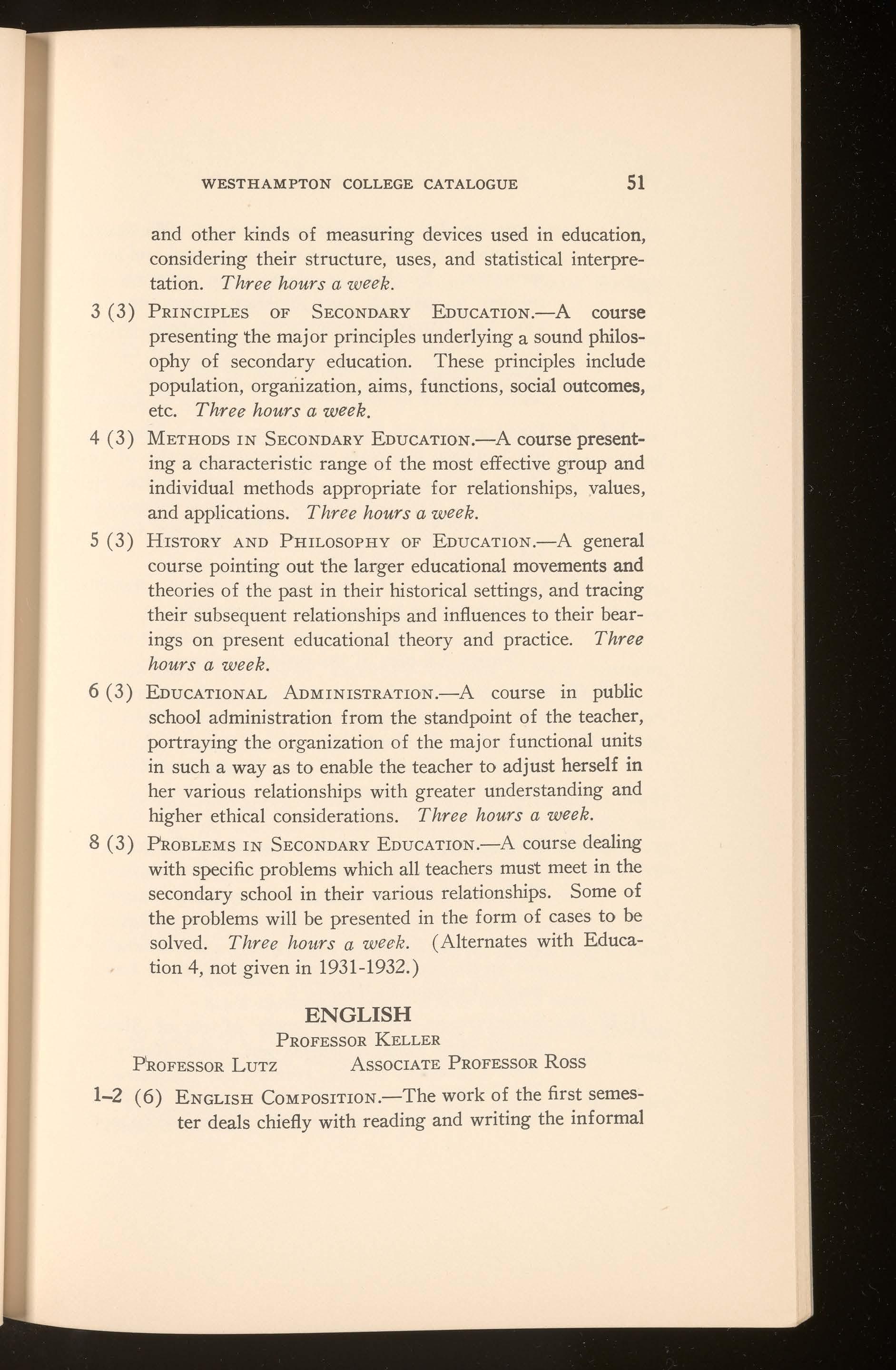
and other kinds of measuring devices used in education, considering their structure, uses, and statistical interpretation. Three hours a week.
3 (3) PRINCIPLES OF SECONDARY EDucATION.-A course presenting the major principles underlying a sound philosophy of secondary education. These principles include population, organization, aims, functions, social outcomes, etc. Three hours a week.
4 (3) METHODSIN SECONDARYEoucATION.-A course presenting a characteristic range of the most effective group and individual methods appropriate for relationships, values, and applications. Three hours a week.
5 (3) HISTORY AND PHILOSOPHY OF EoucATION.-A general course pointing out the larger educational movements and theories of the past in their historical settings, and tracing their subsequent relationships and influences to their bearings on present educational theory and practice. Three hours a week.
6 (3) EDucATIONAL ADMINISTRATION.-A course in public school administration from the standpoint of the teacher, portraying the organization of the major functional units in such a way as to enable the teacher to adjust herself in her various relationships with greater understanding and higher ethical considerations. Three hours a week.
8 (3) PROBLEMSIN SECONDARYEDUCATION.-A course dealing with specific problems which all teachers must meet in the secondary school in their various relationships. Some of the problems will be presented in the form of cases to be solved. Three hours a week. (Alternates with Education 4, not given in 1931-1932.)
ENGLISH PROFESSORKELLER
PROFESSORLuTZ AssocIATE PROFESSORRoss
1-2 (6) ENGLISH CoMPOSITION.-The work of the first semester deals chiefly with reading and writing the informal
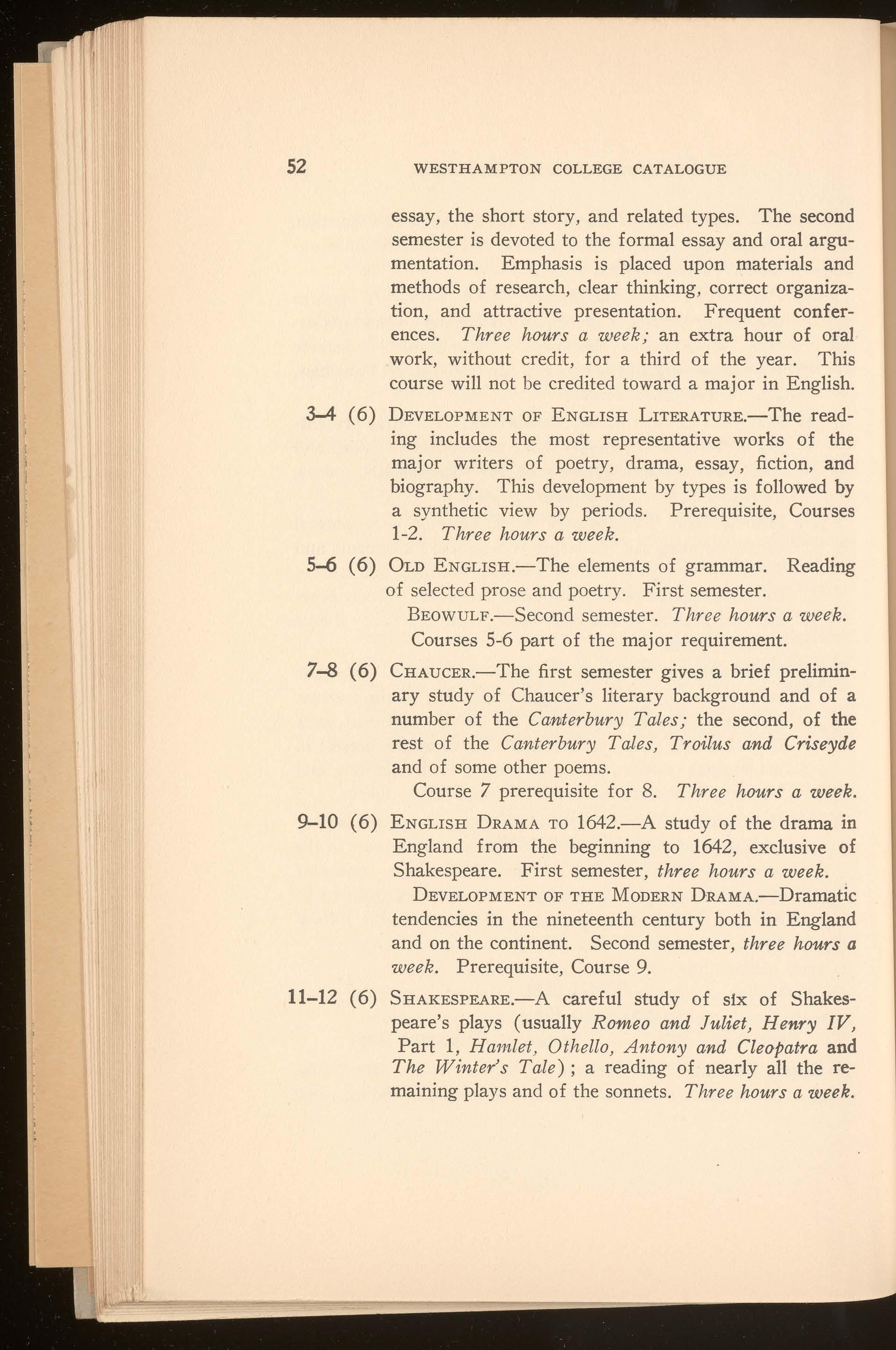
essay, the short story, and related types. The second semester is devoted to the formal essay and oral argumentation. Emphasis is placed upon materials and methods of research, clear thinking, correct organization, and attractive presentation. Frequent conferences. Three hours a week; an extra hour of oral work, without credit, for a third of the year. This course will not be credited toward a major in English.
3-4 (6) DEVELOPMENTOF ENGLISH LITERATURE.-The reading includes the most representative works of the major writers of poetry, drama, essay, fiction, and biography. This development by types is followed by a synthetic view by periods. Prerequisite, Courses 1-2. Three hours a week.
5-6 (6) OLD ENGLISH.-The elements of grammar. Reading of selected prose and poetry. First semester.
BEOWULF.-Second semester. Three hours a week.
Courses 5-6 part of the major requirement.
7-8 (6) CHAUCER.-The first semester gives a brief preliminary study of Chaucer's literary background and of a number of the Canterbury Tales; the second, of the rest of the Canterbury Tales, Troilus and Criseyde and of some other poems.
Course 7 prerequisite for 8. Three hours a week.
9-10 (6) ENGLISH DRAMATO 1642.-A study of the drama in England from the beginning to 1642, exclusive of Shakespeare. First semester, three hours a week.
DEVELOPMENTOF THE MODERNDRAMA.-Dramatic tendencies in the nineteenth century both in England and on the continent. Second semester, three hours a week. Prerequisite, Course 9.
11-12 (6) SHAKESPEARE.-A careful study of six of Shakespeare's plays (usually Romeo and Juliet, Henry IV, Part 1, Hamlet, Othello, Antony and Cleopatra and The Winter's Tale) ; a reading of nearly all the remaining plays and of the sonnets. Three hours a week.
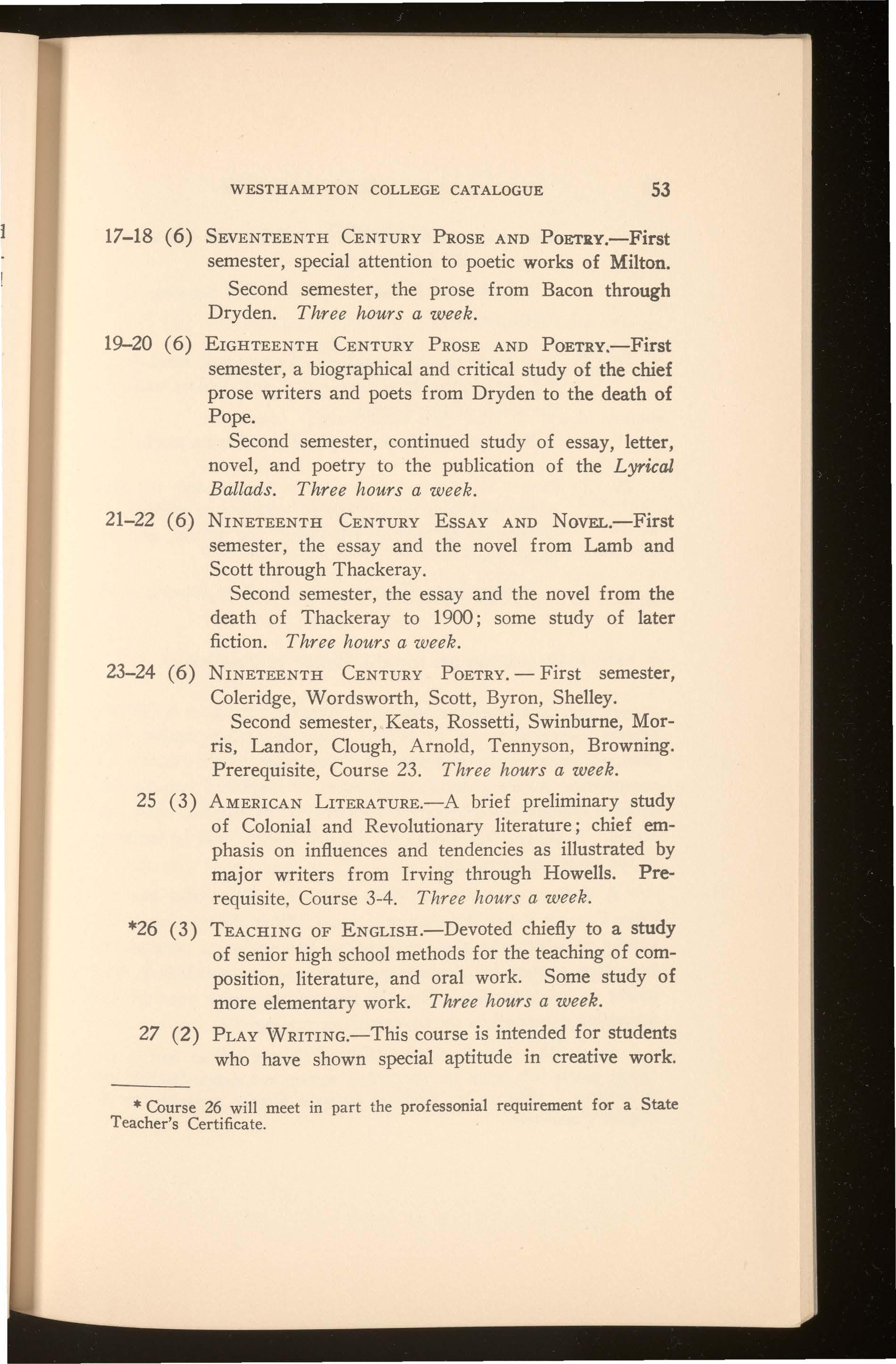
17-18 (6) SEVENTEENTHCENTURYPRosE AND PoETRY.-First semester, special attention to poetic works of Milton. Second semester, the prose from Bacon through Dryden. Three hours a week.
19-20 (6) EIGHTEENTH CENTURY PROSE AND PoETRY.-First semester, a biographical and critical study of the chief prose writers and poets from Dryden to the death of Pope.
Second semester, continued study of essay, letter, novel, and poetry to the publication of the Lyrical Ballads. Three hours a week.
21-22 (6) NINETEENTH CENTURY EssAY AND NovEL.-First semester, the essay and the novel from Lamb and Scott through Thackeray.
Second semester, the essay and the novel from the death of Thackeray to 1900; some study of later fiction. Three hours a week.
23-24 (6) NINETEENTH CENTURY PoETRY.- First semester, Coleridge, Wordsworth, Scott, Byron, Shelley. Second semester, Keats, Rossetti, Swinburne, Morris, Landor, Clough, Arnold, Tennyson, Browning. Prerequisite, Course 23. Three hours a week.
25 (3) AMERICAN LITERATURE.-A brief preliminary study of Colonial and Revolutionary literature; chief emphasis on influences and tendencies as illustrated by major writers from Irving through Howells. Prerequisite, Course 3-4. Three hours a week.
*26 (3) TEACHING OF ENGLISH.-Devoted chiefly to a study of senior high school methods for the teaching of composition, literature, and oral work. Some study of more elementary work. Three hours a week.
27 (2) PLAY WRITING.-This course is intended for students who have shown special aptitude in creative work.
* Course 26 will meet in part the professonial requirement for a State Teacher's Certificate.

The course gives practice in building the one act play on paper and on the stage.
This course is open to Juniors and Seniors. Two hours a week.
28 (2) ARGUMENTATION.-Analysis of questions, brief-drawing, oral and written discussions, and debates make up the work of this course.
Prerequisite, Courses 1-2. Two hours a week.
29 (2) PROSE WRITING.-This course is intended for students who have shown special aptitude in writing. It is devoted to writing the essay, the article, and the short story.
Prerequisites, Courses 1-2, 3-4. Two hours a week
A student approved to major in English must pass a comprehensive examination on or before May 1st of her senior year. Such an examination will test her knowledge of the practice of composition, of the general development of English literature, and of such specific material as the Department of English shall prescribe. A general knowledge of English history will be included in the major requirement.
A student transferring from another college who has not taken Courses 3-4 at Westhampton must take at the opening of the session in which she elects English as her major , a general examination to test her knowledge of form, her vocabulary, and power of interpretation. She will take in her senior year the examination described in the paragraph preceding.
Note: Any student who has completed Courses 1-2 but later in any college course falls below the standard in written and spoken English, will be required to make up her deficiency by some practice prescribed by the English Department.
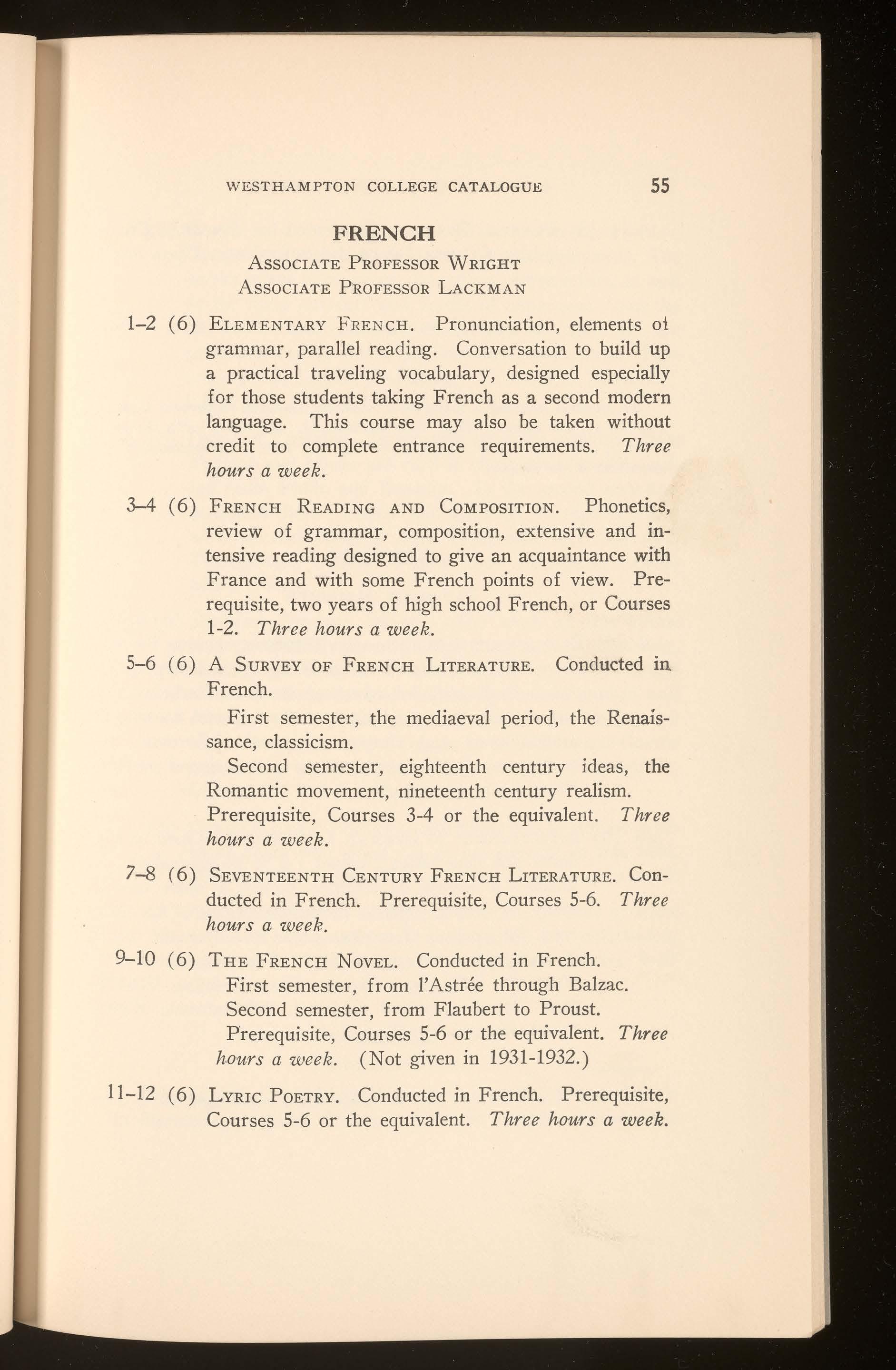
ASSOCIATEPROFESSORWRIGHT
ASSOCIATEPROFESSORLACKMAN
1-2 (6) ELEMENTARYFRENCH. Pronunciation, elements oi grammar, parallel reading. Conversation to build up a practical traveling vocabulary, designed especially for those students taking French as a second modern language. This course may also be taken without credit to complete entrance requirements. Three hours a week.
3-4 (6) FRENCH READING AND CoMPOSITION. Phonetics, review of grammar, composition, extensive and intensive reading designed to give an acquaintance with France and with some French points of view. Prerequisite, two years of high school French, or Courses l-2. Three hours a week.
5-6 (6) A SURVEYOF FRENCH LITERATURE. Conducted in French.
First semester, the mediaeval period, the Renaissance, classicism.
Second semester, eighteenth century ideas, the Romantic movement, nineteenth century realism. Prerequisite, Courses 3-4 or the equivalent. Three hours a week.
7-8 (6) SEVENTEENTHCENTURYFRENCH LITERATURE.Conducted in French. Prerequisite, Courses 5-6. Three hours a week.
9-10 (6) THE FRENCH NOVEL. Conducted in French.
First semester, from 1'Astree through Balzac. Second semester, from Flaubert to Proust. Prerequisite, Courses 5-6 or the equivalent. Three hours a week. (Not given in 1931-1932.)
11-12 (6) LYRIC POETRY. Conducted in French. Prerequisite, Courses 5-6 or the equivalent. Three hours a week.
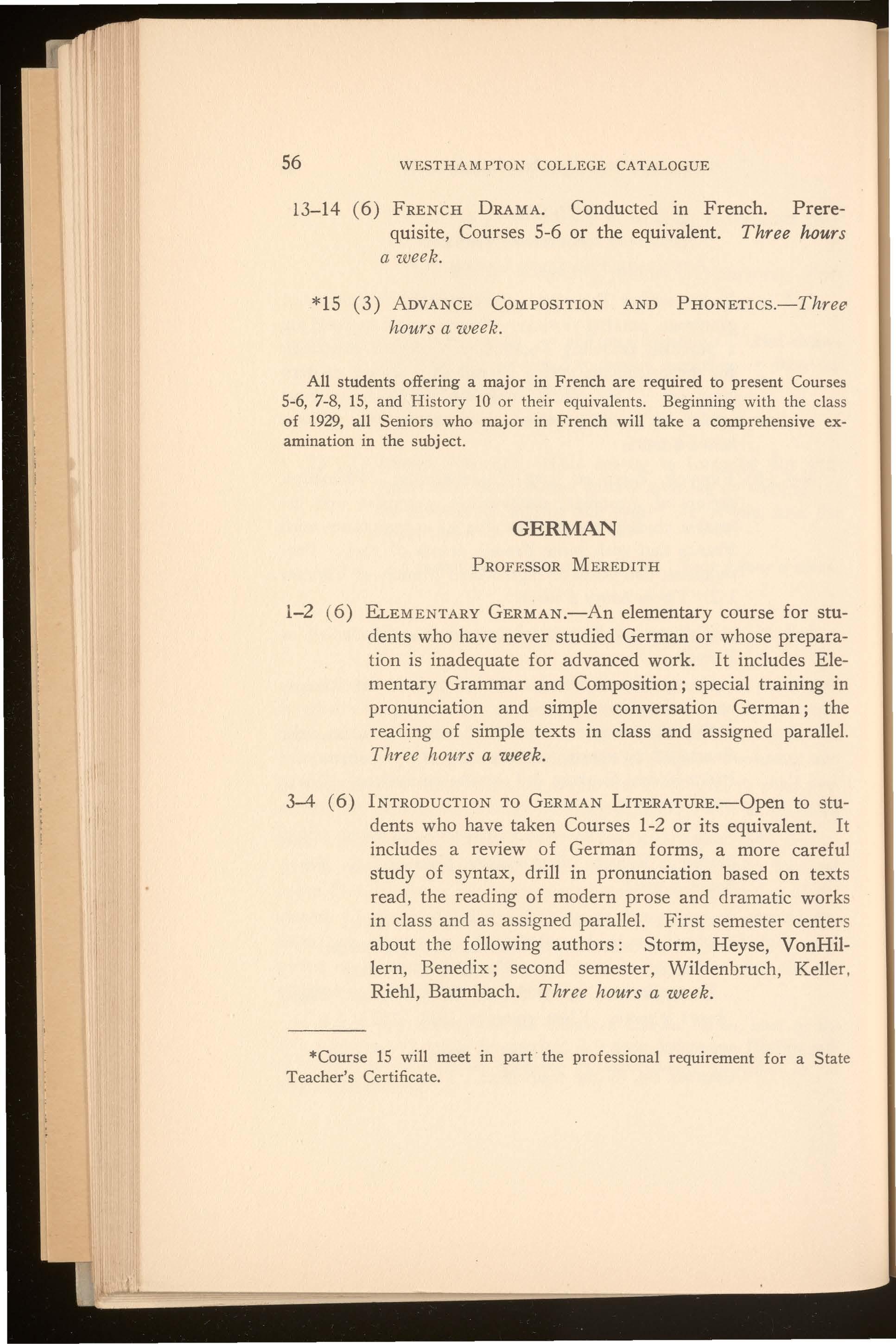
13-14 (6) FRENCH DRAMA. Conducted in French. Prerequisite, Courses 5-6 or the equivalent. Three hours a week.
*15 (3) ADVANCE COMPOSITION AND PHONETics.-Three hours a wee!?.
All students offering a major in French are required to present Courses 5-6, 7-8, 15, and History 10 or their equivalents. Beginning with the class of 1929, all Seniors who major in French will take a comprehensive examination in the subject.
1-2 ( 6) ELEMENTARYGERMAN.-An elementary course for students who have never studied German or whose preparation is inadequate for advanced work. It includes Elementary Grammar and Composition; special training in pronunciation and simple conversation German; the reading of simple texts in class and assigned parallel. Three hours a week.
3-4 (6) INTRODUCTIONTO GERMAN LrTERATURE.-Open to students who have taken Courses 1-2 or its equivalent. It includes a review of German forms, a more careful study of syntax, drill in pronunciation based on texts read, the reading of modern prose and dramatic works in class and as assigned parallel. First semester center s about the following authors : Storm, Heyse, VonHillern, Benedix; second semester, Wildenbruch, Keller , Riehl, Baumbach. Three hours a week.
*Course 15 will meet in part · the professional requirement for a State Teacher's Certificate.
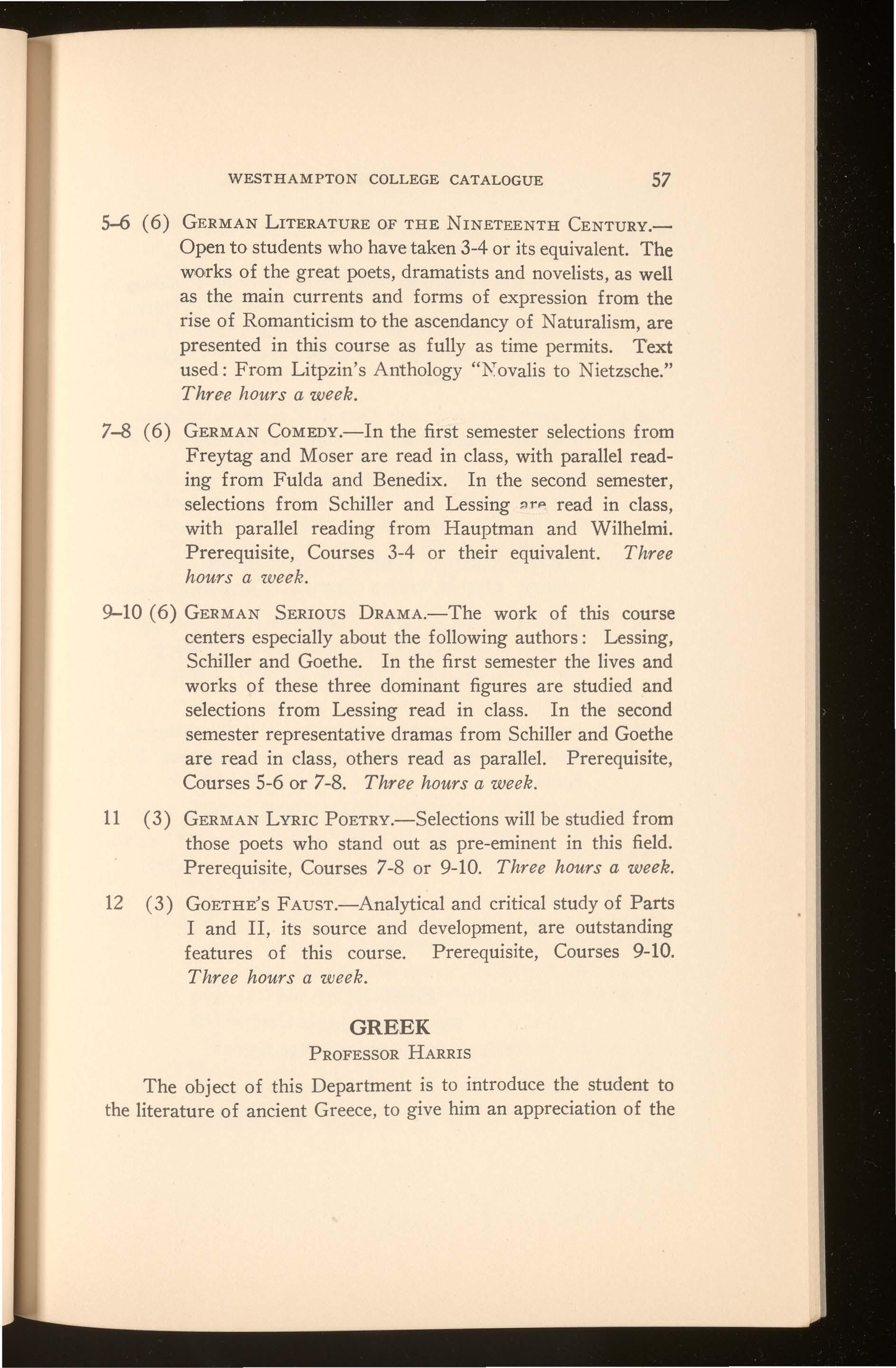
5-6 (6) GERMANLITERATUREOF THE NINETEENTHCENTURY.-
Open to students who have taken 3-4 or its equivalent. The works of the great poets, dramatists and novelists, as well as the main currents and forms of expression from the rise of Romanticism to the ascendancy of Naturalism, are presented in this course as fully as time permits. Text used: From Litpzin's Anthology ":f:\~ovalisto Nietzsche." Three hours a week.
7-8 (6) GERMANCoMEDY.-In the first semester selections from Freytag and Moser are read in class, with parallel reading from Fulda and Benedix. In the second semester, selections from Schiller and Lessing ::ir., read in class, with parallel reading from Hauptman and Wilhelmi. Prerequisite, Courses 3-4 or their equivalent. Three hours a week.
9-10 (6) GERMAN SERIOUS DRAMA.-The work of this course centers especially about the following authors: Lessing, Schiller and Goethe. In the first semester the lives and works of these three dominant figures are studied and selections from Lessing read in class. In the second semester representative dramas from Schiller and Goethe are read in class, others read as parallel. Prerequisite, Courses 5-6 or 7-8. Three hours a week.
11 (3) GERMANLYRICPoETRY.-Selections will be studied from those poets who stand out as pre-eminent in this field. Prerequisite, Courses 7-8 or 9-10. Three hours a week.
12 (3) GoETHE's FAUST.-Analytical and critical study of Parts I and II, its source and development, are outstanding features of this course. Prerequisite, Courses 9-10. Three hours a week.
The object of this Department is to introduce the student to the literature of ancient Greece , to give him an appreciation of the

precision of the language, and a consciousness of the Greek love for artistic beauty and proportion.
1-2 (6) ELEMENTARYGREEK.-Beginning with the alphabet, the class is occupied in securing a knowledge of forms, a working vocabulary and fundamental points of syntax. Parts of Xenophon's Anabasis read. Composition. Three hours a week.
3 (3) PLATO'S APOLOGYAND CRITo.-Grammar reviewed and extended. Composition. Three hours a week.
4 (3) HoMER.-Reading of selected portions of Iliad and Odyssey. Study of Homeric forms and inflections . Conferences on mythology. Three hours a week.
5 (3) LvsIAs.-Selected orations. Introduction to Greek oratory. Oral or written exercises. Three hours a week.
6 (3) HISTORY.-One book of Thucydides read and selected portions of others. Conferences on and readings from Herodotus and other historical writers. Three hours a week.
7 (3) ORATORY.-Demosthenes' De Corona. Conferences on Greek oratory or orators Lectures on grammar. Three hours a week.
8 ( 3) DRAMA-A play of Sophocles or Euripides read. Study of the development of the drama. Parallel reading. Lectures on Greek literature. Three hours a week.
N. B. : Students who major in Greek and Latin may substitute 6 hours of Antiquities (see Latin, Courses 13, 14, 15, 16), for six hours of the 24 hours of Greek required for the major.
PROFESSORLOUGH ASSOCIATEPROFESSORWOODFIN
1-2 (6) SURVEYOF THE RISE AND DEVELOPMENTOF CIVILIZATION FROMPREHISTORICTIMES TO 1300 A. D.
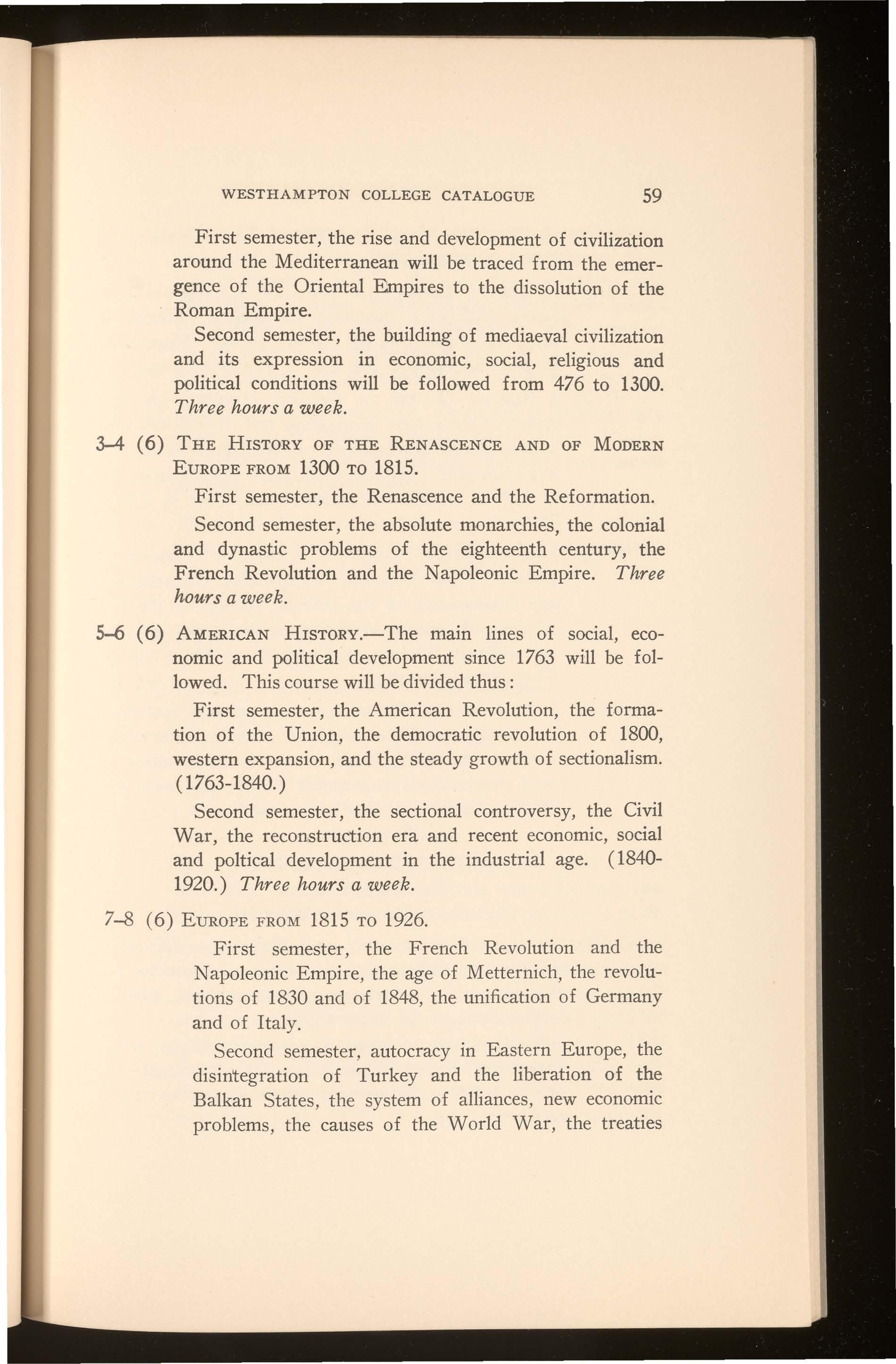
First semester, the rise and development of civilization around the Mediterranean will be traced from the emergence of the Oriental Empires to the dissolution of the Roman Empire.
Second semester, the building of mediaeval civilization and its expression in economic, social, religious and political conditions will be followed from 476 to 1300. Three hours a week.
3-4 (6) THE HISTORY OF THE RENASCENCEAND OF MODERN EUROPEFROM1300 TO 1815.
First semester, the Renascence and the Reformation. Second semester, the absolute monarchies, the colonial and dynastic problems of the eighteenth century, the French Revolution and the Napoleonic Empire. Three hours a week.
5-6 (6) AMERICAN HISTORY.-The main lines of social, economic and political development since 1763 will be followed. This course will be divided thus :
First semester, the American Revolution, the formation of the Union, the democratic revolution of 1800, western expansion, and the steady growth of sectionalism. ( 1763-1840.)
Second semester, the sectional controversy, the Civil War, the reconstruction era and recent economic, social and poltical development in the industrial age. ( 18401920.) Three hours a week.
7-8 (6) EUROPEFROM1815 TO 1926.
First semester, the French Revolution and the Napoleonic Empire, the age of Metternich, the revolutions of 1830 and of 1848, the unification of Germany and of Italy.
Second semester, autocracy in Eastern Europe, the disintegration of Turkey and the liberation of the Balkan States , the system of alliances, new economic problems, the causes of the World War, the treaties
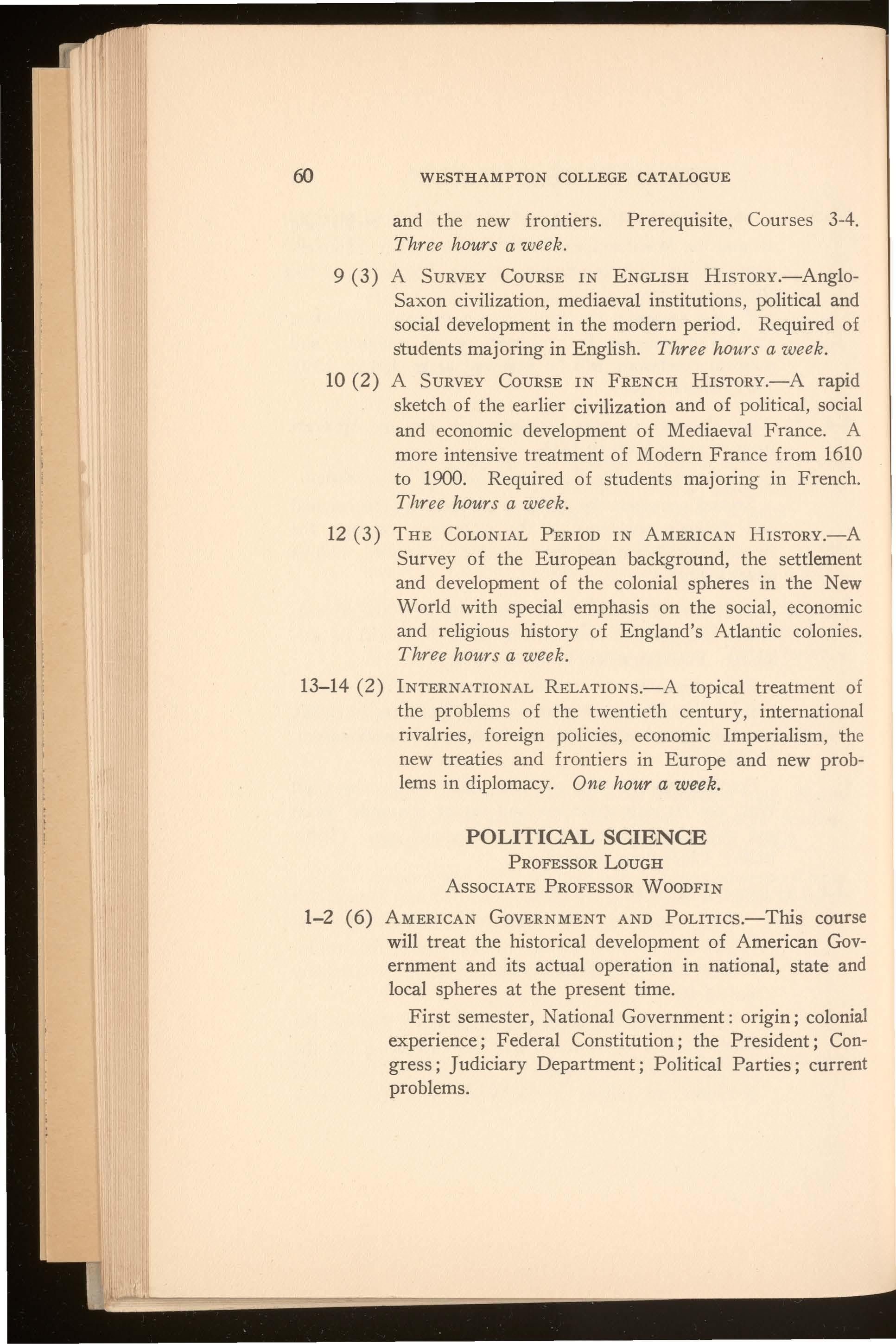
and the new frontiers. Prerequisite, Courses 3-4. Three hours a week.
9 (3) A SURVEY CouRSE IN ENGLISH H1sTORY.-AngloSaxon civilization, mediaeval institutions, political and social development in the modern period. Required of students majoring in English. Three hours a week.
10 (2) A SURVEY COURSEIN FRENCH HISTORY.-A rapid sketch of the earlier civilization and of political, social and economic development of Mediaeval France. A more intensive treatment of Modern France from 1610 to 1900. Required of students majoring in French. Three hours a week.
12 (3) THE COLONIALPERIOD IN AMERICAN HISTORY-A Survey of the European background, the settlement and development of the colonial spheres in the New World with special emphasis on the social, economic and religious history of England's Atlantic colonies. Three hours a week.
13-14 (2) INTERNATIONALRELATIONs.-A topical treatment of the problems of the twentieth century, international rivalries, foreign policies, economic Imperialism, the new treaties and frontiers in Europe and new problems in diplomacy. One hour a week.
POLITICAL SCIENCE
PROFESSORLOUGH
ASSOCIATEPROFESSORWOODFIN
1-2 (6) AMERICAN GovERNMENT AND Pouncs.-This course will treat the historical development of American Government and its actual operation in national, state and local spheres at the present time.
First semester, National Government: origin; colonial experience; Federal Constitution; the President; Congress ; Judiciary Department ; Political Parties ; current problems.

Second semester, State Government: Constitutional basis ; the Executive ; the Legislative ; the Courts. Particular attention will be given to the institutions and problems in Virginia. Municipal and Rural Government: the ·American city, history, 01:ganization, reform movements, such as the Commission and the City Manager plans; the town, county, village. Three hours a week.
3 (3) COMPARATIVEGovERNMENT.-A su1:veyof contempora1:y governments of Europe, including Great Britain, France, the new republics in central Europe, the Soviet and Fascisti systems. Three hours a week.
4 ( 3) POLITICALTHEORY.-In this course a study of political theory will be made from the classical period to the present, with particular emphasis on the nineteenth century Three hours a week.
5 (3) INTERNATIONALLAW.-
Three hours a w eek.
6 (3) FOREIGNPOLICYOF THE UNITED STATES.-
Three hours a week.
PROFESSORBEGGS
ASSOCIATEPROFESSORTURNBULL
ASSISTANTWILLIS
"O" CICERO: Six orations. Prose composition based on the text read. Required of all students who offer only two entrance credits in Latin . No credit. Thr ee hours a week.
"A" (6) VERGIL: Selections from the twelve books.-In the first semester emphasis is laid on the Latin, with study of Latin hexameter and some metrical composition; in the second semester emphasis is laid on rapid reading and study of archaeological discoveries at Rome, Carthage and other Vergilian sites Required of all students who offer only three entrance credits in Latin and of students who have completed Latin "O"; accepted ( when done at West-
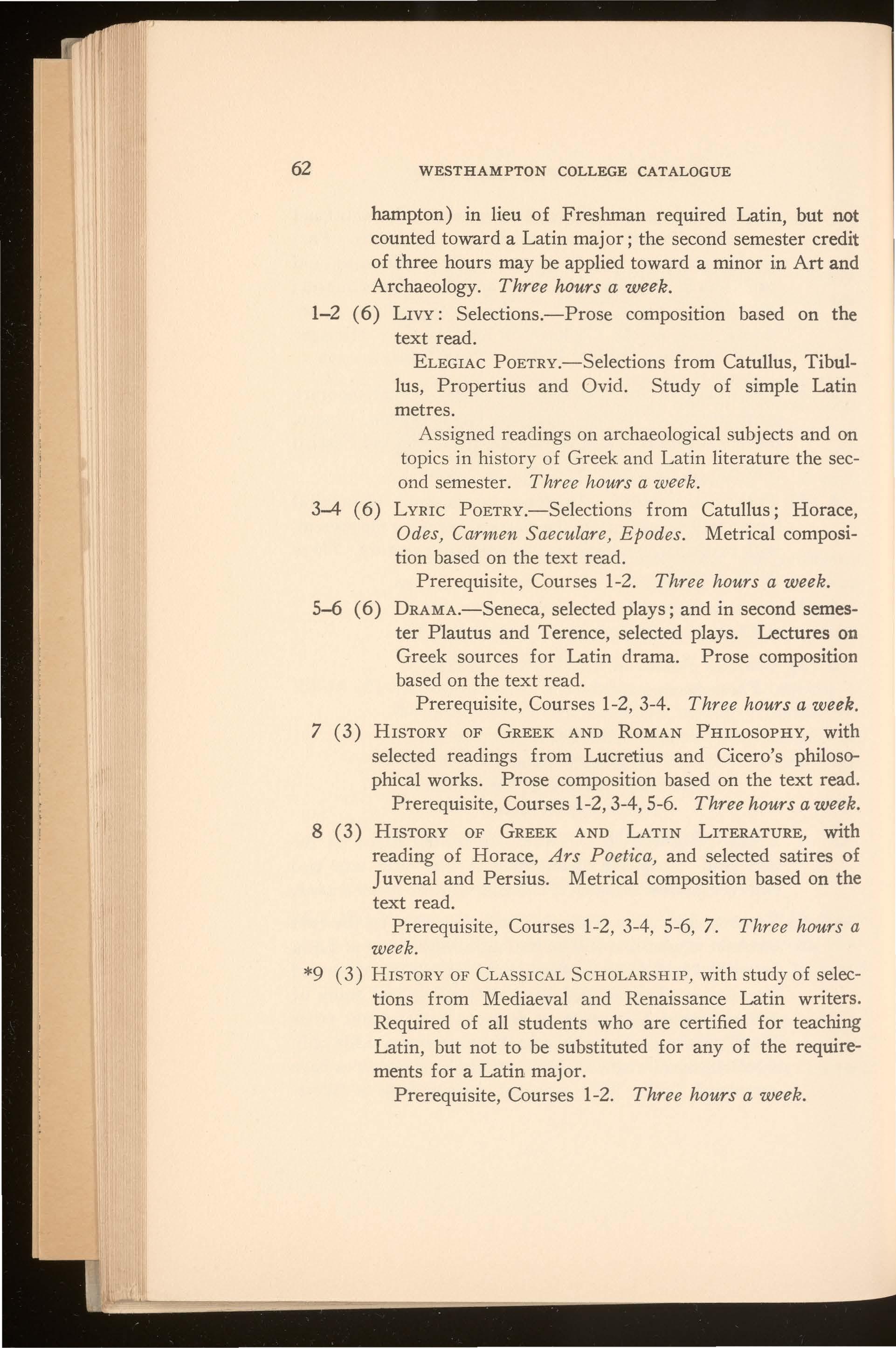
hampton) in lieu of Freshman required Latin, but not counted toward a Latin major; the second semester credit of three hours may be applied toward a minor in Art and Archaeology. Three hours a week.
1-2 (6) LIVY: Selections.-Prose composition based on the text read.
ELEGIACPoETRY.-Selections from Catullus, Tibullus, Propertius and Ovid. Study of simple Latin metres.
Assigned readings on archaeological subjects and on topics in history of Greek and Latin literature the second semester. Three hours a week.
3-4 (6) LYRIC PoETRY.-Selections from Catullus; Horace, Odes, Carmen Saeculare, Epodes. Metrical composition based on the text read.
Prerequisite, Courses 1-2. Three hours a week.
5-6 (6) DRAMA.-Seneca, selected plays; and in second semester Plautus and Terence, selected plays. Lectures on Greek sources for Latin drama. Prose composition based on the text read.
Prerequisite, Courses 1-2, 3-4. Three hours a week.
7 ( 3) HISTORY OF GREEK AND ROMAN PHILOSOPHY, with selected readings from Lucretius and Cicero's philosophical works. Prose composition based on the text read. Prerequisite, Courses 1-2, 3-4, 5-6. Three hours a week.
8 (3) HISTORY OF GREEK AND LATIN LITERATURE,with reading of Horace, Ars Poetica, and selected satires of Juvenal and Persius. Metrical composition based on the text read.
Prerequisite, Courses 1-2, 3-4, 5-6, 7. Three hours a week.
*9 ( 3) HISTORYOF CLASSICALSCHOLARSHIP,with study of selections from Mediaeval and Renaissance Latin writers. Required of all students who are certified for teaching Latin, but not to be substituted for any of the requirements for a Latin major.
Prerequisite, Courses 1-2. Three hours a week.
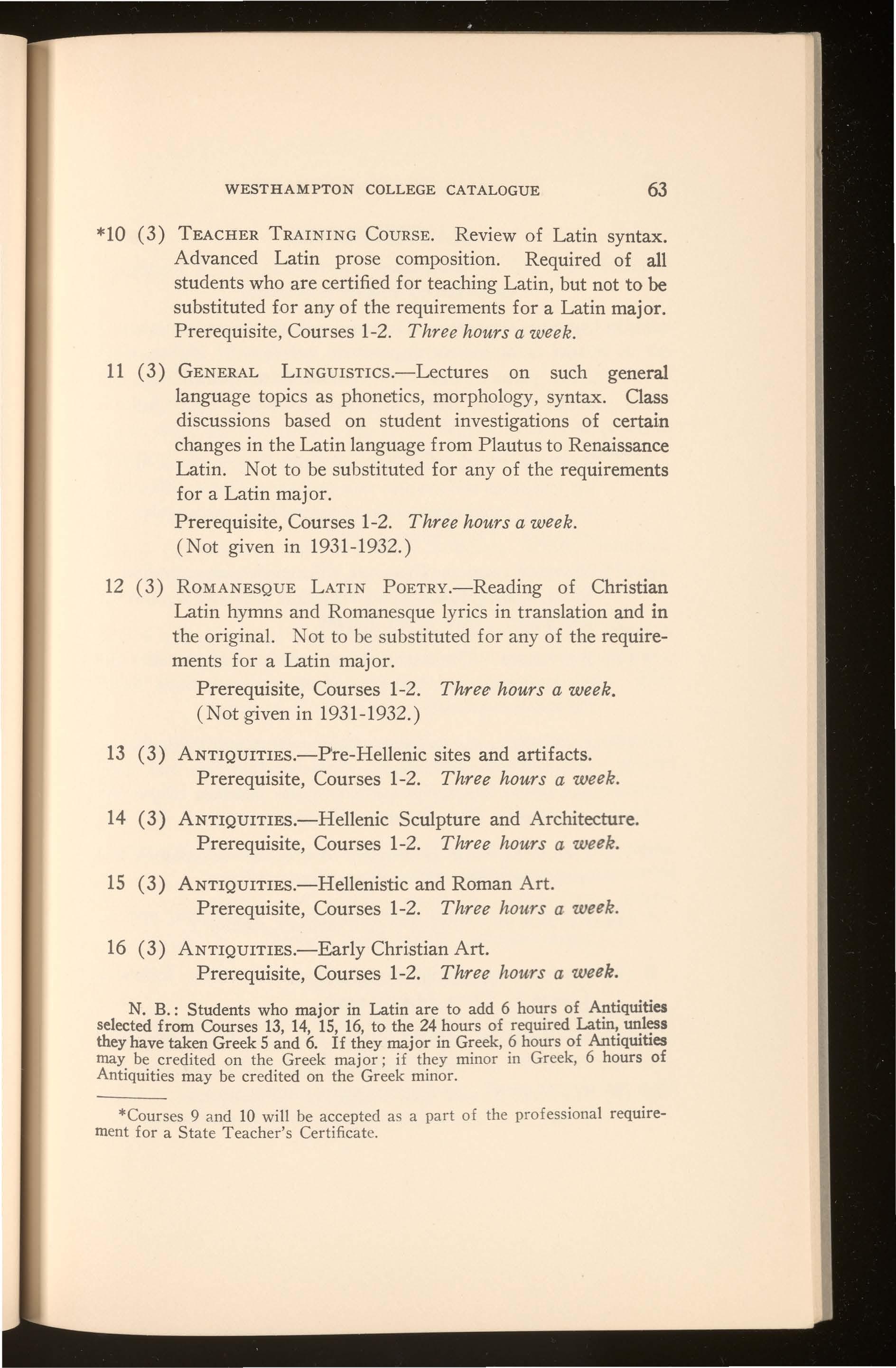
*10 (3) TEACHER TRAINING COURSE. Review of Latin syntax. Advanced Latin prose composition. Required of all students who are certified for teaching Latin, but not to be substituted for any of the requirements for a Latin major. Prerequisite, Courses 1-2. Three hours a week.
11 ( 3) GENERAL LINGUISTICS.-Lectures on such general language topics as phonetics, morphology, syntax. Oass discussions based on student investigations of certain changes in the Latin language from Plautus to Renaissance Latin. Not to be substituted for any of the requirements for a Latin major.
Prerequisite, Courses 1-2. Three hours a week. (Not given in 1931-1932.)
12 (3) ROMANESQUELATIN PoETRY.-Reading of Christian Latin hymns and Romanesque lyrics in translation and in the original. Not to be substituted for any of the requirements for a Latin major.
Prerequisite, Courses 1-2. Three hours a week. (Not given in 1931-1932.)
13 ( 3) ANTIQUITIES.-Pre-Hellenic sites and artifacts.
Prerequisite, Courses 1-2. Three hours a week.
14 (3) ANTIQUITIEs.-Hellenic Sculpture and Architecture.
Prerequisite, Courses 1-2. Three hours a week.
15 (3) ANTIQUITIEs.-Hellenistic and Roman Art.
Prerequisite, Courses 1-2. Three hours a week.
16 (3) ANTIQUITIES.-Early Christian Art.
Prerequisite, Courses 1-2. Three hours a week.
N. B.: Students who major in Latin are to add 6 hours of Antiquities selected from Courses 13, 14, 15, 16, to the 24 hours of required Latin,. u~l~s they have taken Greek 5 and 6. If they major in Greek, 6 hours of Anttqwties may be credited on the Greek major; if they minor in Greek, 6 hours of Antiquities may be credited on the Greek minor.
*Courses 9 and 10 will be accepted as a part of the professional requirement for a State Teacher's Certificat e .
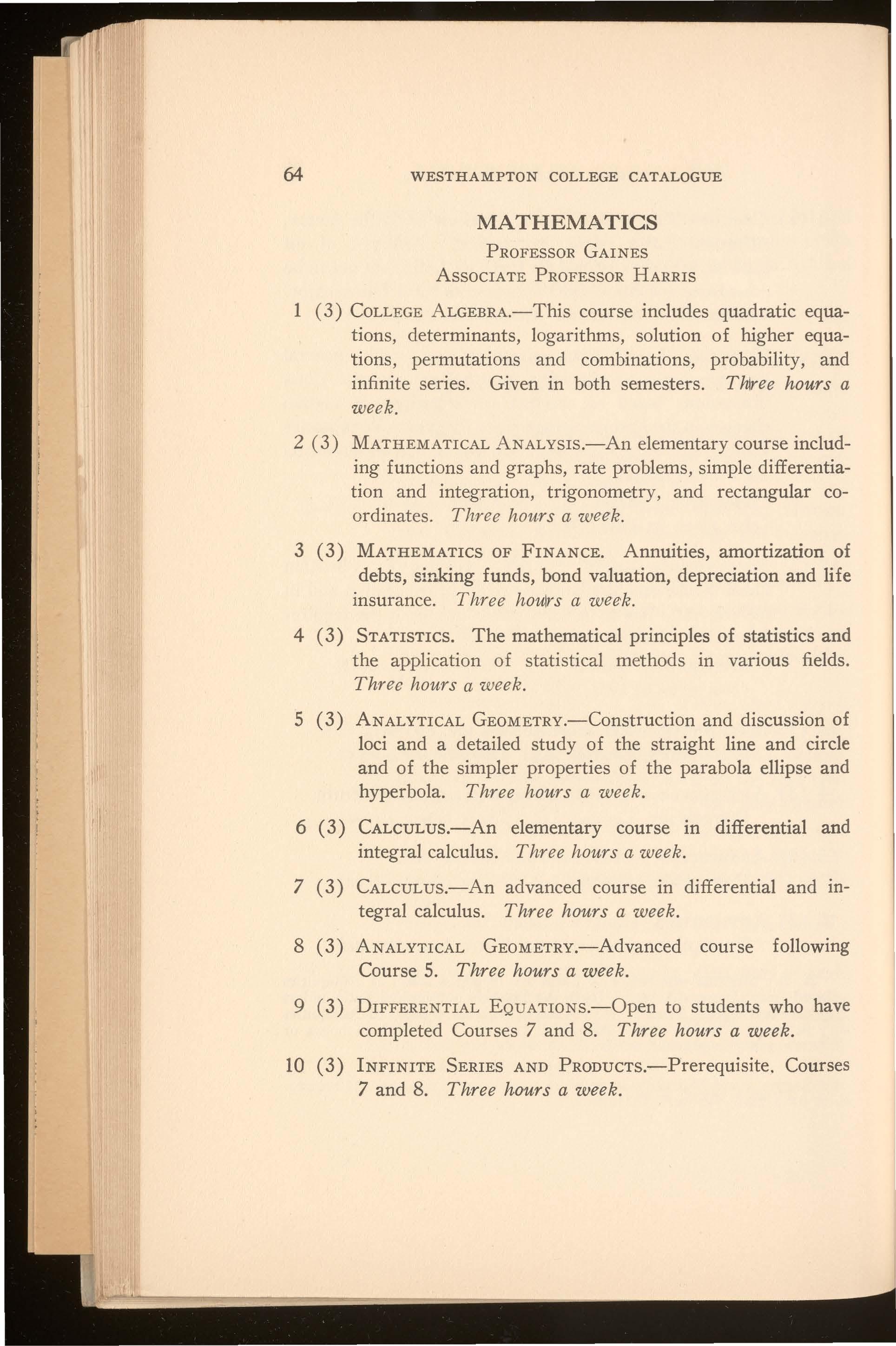
MATHEMATICS
PROFESSORGAINES
AssoCIATE PROFESSORHARRIS
1 ( 3) COLLEGEALGEBRA.-This course includes quadratic equations, determinants, logarithms, solution of higher equations, permutations and combinations, probability, and infinite series. Given in both semesters. Thlree hours a week.
2 (3) MATHEMATICALANALYSIS.-An elementary course including functions and graphs, rate problems, simple differentiation and integration, trigonometry, and rectangular coordinates. Three hours a week.
3 (3) MATHEMATICSOF FINANCE. Annuities, amortization of debts, sinking funds, bond valuation, depreciation and life insurance. Three howrs a week.
4 (3) STATISTICS. The mathematical principles of statistics and the application of statistical methods in various fields. Three hours a week.
5 (3) ANALYTICALGEOMETRY.-Construction and discussion of loci and a detailed study of the straight line and circle and of the simpler properties of the parabola ellipse and hyperbola. Three hours a week.
6 (3) CALCULus.-An elementary course in differential and integral calculus. Three hours a week.
7 (3) CALCULUs.-An advanced course in differential and mtegral calculus. Three hours a week.
8 (3) ANALYTICAL GEOMETRY.-Advanced course following Course 5. Three hours a week.
9 (3) DIFFERENTIALEQUATIONs.-Open to students who have completed Courses 7 and 8. Three hours a week.
10 (3) INFINITE SERIES AND PRODUCTs.-Prerequisite. Courses 7 and 8. Three hours a week.
PROFESSOR F. F. HARKER
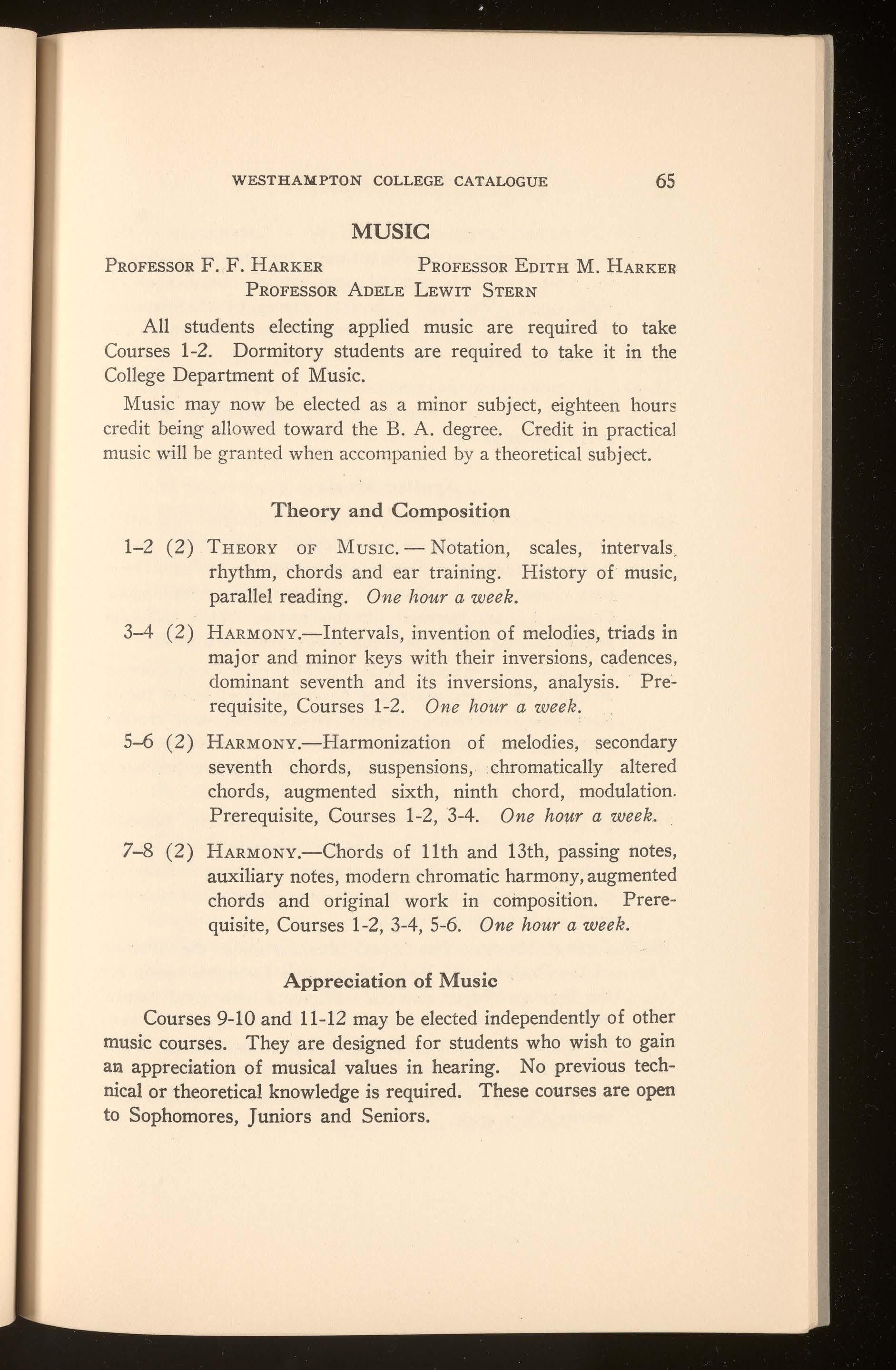
PROFESSOREDITH M. HARKER
PROFESSORADELE LEWIT
STERN
All students electing applied music are required to take Courses 1-2. Dormitory students are required to take it in the College Department of Music.
Music may now be elected as a minor subject, eighteen hours credit being allowed toward the B. A. degree. Credit in practical music will be granted when accompanied by a theoretical subject.
1-2 (2) THEORY OF Musrc. - Notation, scales, intervals rhythm, chords and ear training. History of music, parallel reading. One hour a week.
3-4 (2) HARMONY.-Intervals, invention of melodies, triads in major and minor keys with their inversions, cadences, dominant seventh and its inversions, analysis. Pre~ requisite, Courses 1-2. One hour a week.
5-6 (2) HARMONY.-Harmonization of melodies, secondary seventh chords, suspensions, chromatically altered chords, augmented sixth, ninth chord, modulation. Prerequisite, Courses 1-2, 3-4. One hour a week.
7-8 (2) HARMONY.-Chords of 11th and 13th, passing notes, auxiliary notes, modern chromatic harmony, augmented chords and original work in composition. Prerequisite, Courses 1-2, 3-4, 5-6. One hour a week.
Courses 9-10 and 11-12 may be elected independently of other music courses. They are designed for students who wish to gain aia appreciation of musical values in hearing. No previous technical or theoretical knowledge is required. These courses are open to Sophomores, Juniors and Seniors.

9-10 (2) APPRECIATIONOF Musrc AS A LITERATURE.-This course furnishes an intelligent basis for the appreciation of the masterpieces of musical composition. Studies of the Folk-songs, form, and a general survey of the historical development of music. Lectures, musical illustrations and collateral readings. One hour a week.
11-12 (2) OPERA AND ORATORIO.-History and development of dramatic music. Lectures, musical illustrations and collateral readings. One hour a week.
13-14 (2) PrANOFORTE.-General course in technique and interpretation. Individual lessons adapted to the ability of the student. Studies in Czerny, Cramer, Bach's two and threepart Inventions : Sonatas and modern compositions. Courses 1-2 are required for this course. Two half-hour private lessons and at least six hours practice a week.
15-16 (2) SINGIKG.-Fundamental principles of voice production. Breath control, resonance and development of vowel forms. Elementary vocalises. Songs from classic and modern literature. Courses 1-2 are required for this course. Two half-hour private lessons and at least six hours practice a week.
17-18 (2) VIOLIN.-Comprehensive course including standard studies, sonatinas and pieces in positions suitable to the advancement of the individual student. Courses 1-2 are required for this course. Two half-hour private lessons and at least six hours practice a week.
19-20 CHORALM us1c.-The Choral Music is under the direction of the Professor of Vocal Music, and furnishes music for the Sunday Vesper services. Students with good natural voices are eligible for membership. Particular care is taken that the music and the training shall be of permanent educational value. One semester hour will be granted each year upon recommendation of the Music Department for University Choir work.
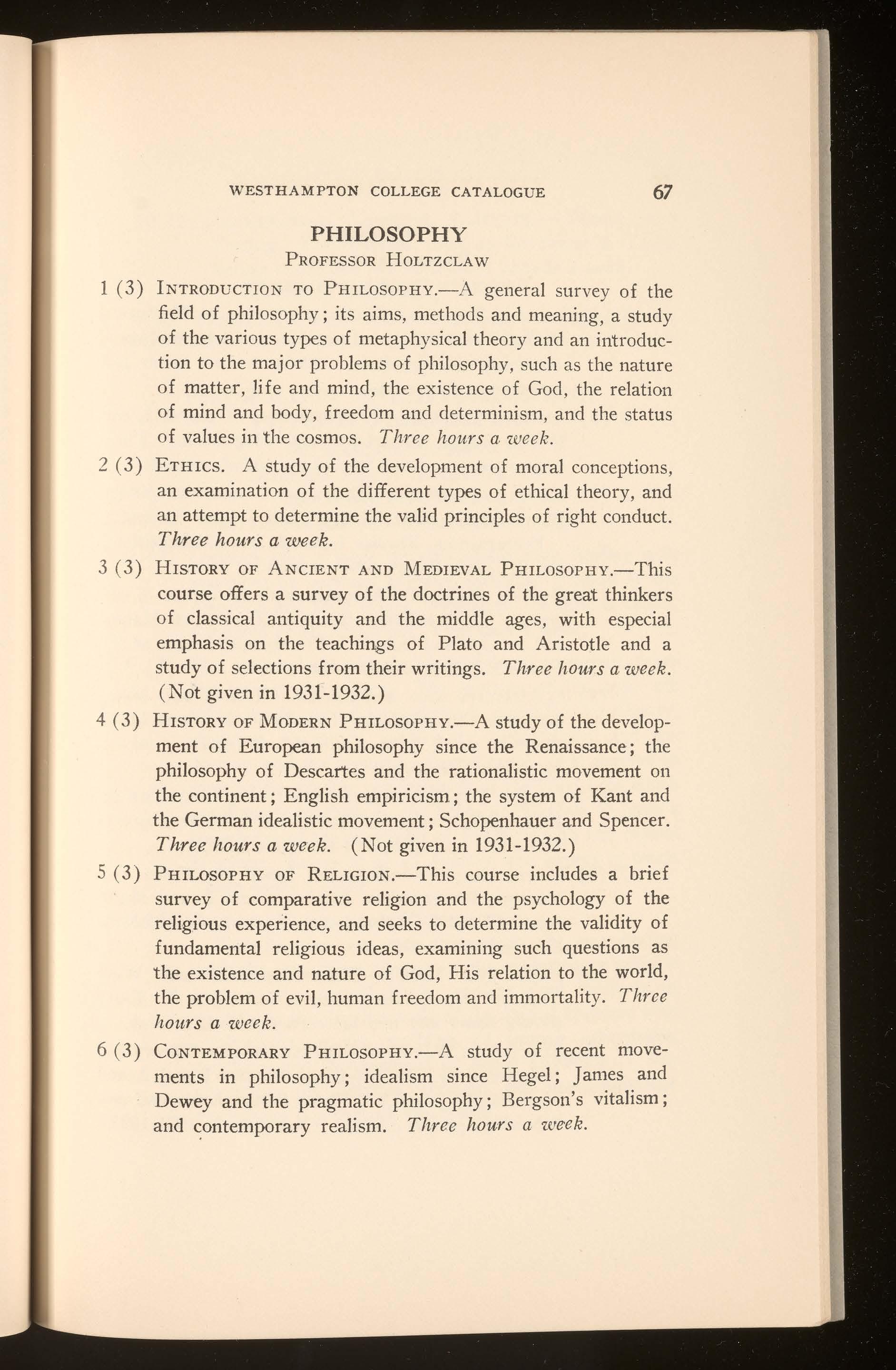
PHILOSOPHY
1 ( 3) INTRODUCTIONTO PHILOSOPHY . - A general surve y of the field of philosophy; its aims, methods and meaning, a study of the various types of metaphysical theory and an introduction to the major problems of philosophy, such a s the nature of matter, life and mind , the existence of Goel, the relation of mind and body, freedom and determinism, and the status of values in the cosmos. Three hours a 1ueek.
2 ( 3) ETHICS. A study of the development of moral conceptions, an examination of the different types of ethical theory , and an attempt to determine the valid principles of right conduct Three hours a week.
3 ( 3) HISTORYOF ANCIENT AND MEDIEVALPHILOSOPHY.-This course offers a survey of the doctrines of the great thinkers of classical antiquity and the middle ages, with especial emphasis on the teachings of Plato and Aristotle and a study of selections from their writings Three hours a we ek. (Not given in 1931-1932.)
4 ( 3) HISTORYOF MODERNPHILOSOPHY.-A study of the development of European philosophy since the Renaissance; the philosophy of Descartes and the rationalistic movement on the continent; English empiricism; the system of Kant and the German idealistic movement; Schopenhauer and Spencer. Three hours a week. (Not given in 1931-1932.)
5 ( 3) PHILOSOPHY OF RELIGION.-This course includes a brief survey of comparative religion and the psychology of the religious experience, and seeks to determine the validity of fundamental religious ideas, examining such questions as the existence and nature of God, His relation to the world, the problem of evil, human freedom and immortality. Three hours a week.
6 ( 3) CONTEMPORARYPHILOSOPHY.-A study of recent movements in philosophy; idealism since Hegel; James and Dewey and the pragmatic philosophy; Bergson's vitalism; and contemporary realism. Three hours a week.
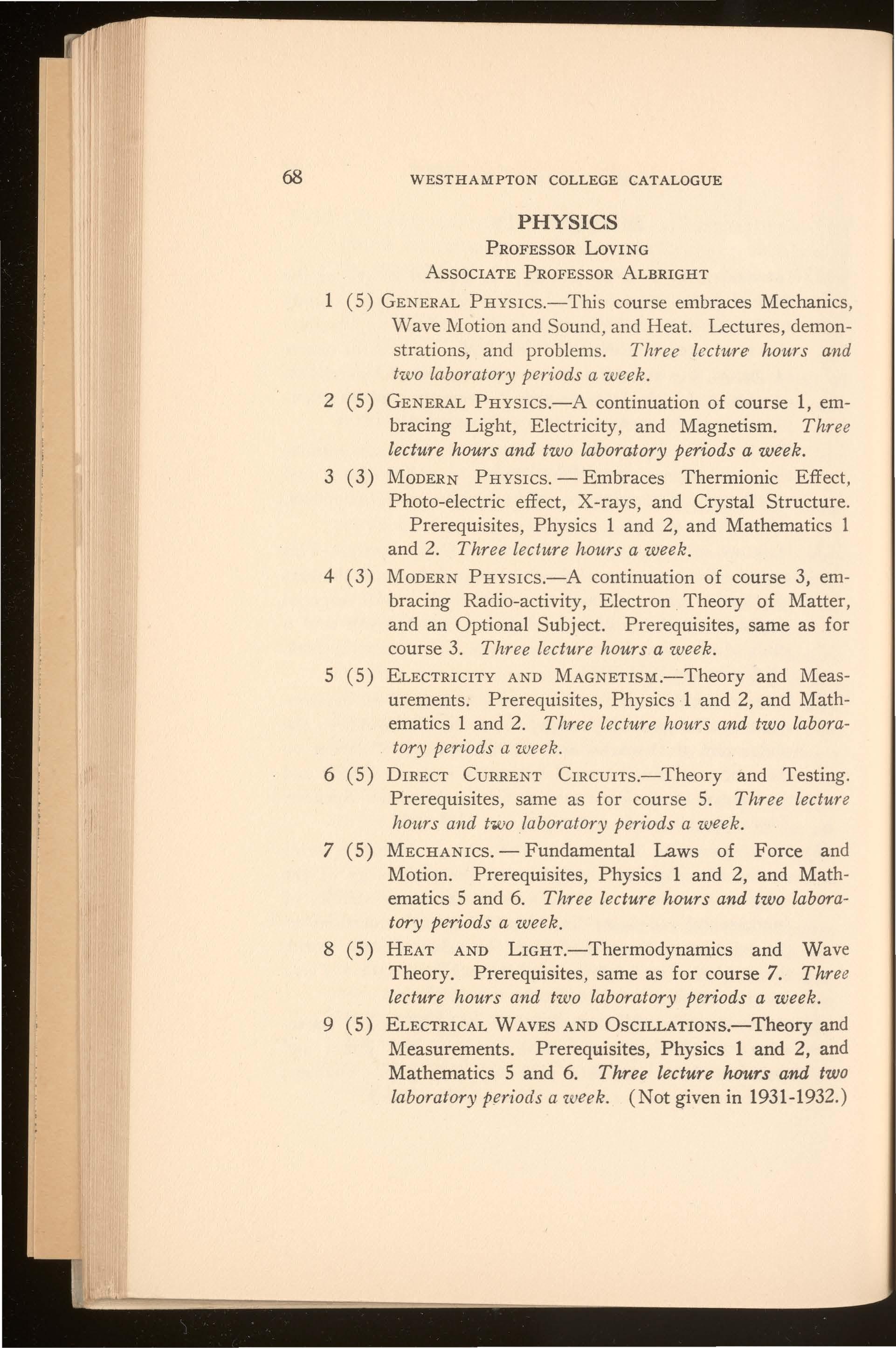
PHYSICS
PROFESSORLOVING
ASSOCIATEPROFESSORALBRIGHT
1 (5) GENERALPHYsrcs.-This course embraces Mechanics , Wave Motion and Sound, and Heat. Lectures, demonstrations, and problems. Thre e lecture hours and two laboratory periods a w eek
2 ( 5) GENERALPHYSics.-A continuation of course 1, embracing Light, Electricity, and Magnetism. Thre e lecture hours and two laboratory periods a week.
3 ( 3) MODERN PHYSICS.- Embraces Thermionic Effect, Photo-electric effect, X-rays, and Crystal Structure . Prerequisites, Physics 1 and 2, and Mathematics 1 and 2. Three lecture hours a week.
4 (3) MODERNPHYsrcs.-A continuation of course 3, embracing Radio-activity, Electron Theory of Matter , and an Optional Subject. Prerequisites, same as for course 3. Three lecture hours a week.
5 ( 5) ELECTRICITYAND MAGNETISM.-Theory and Measurements. Prerequisites, Physics 1 and 2, and Mathematics 1 and 2. Three lecture hours and two laboratory periods a week.
6 ( 5) DIRECT CuRRENT CrncuITs -Theory and Testing Prerequisites, same as for course 5. Three lectur e hours and two laboratory periods a week.
7 ( 5) MECHANICS.- Fundamental Laws of Force and Motion. Prerequisites, Physics 1 and 2, and Mathematics 5 and 6. Three lecture hours and two laboratory periods a week.
8 (5) HEAT AND LIGHT.-Thermodynamics and Wave Theory. Prerequisites, same as for course 7. Thre e lecture hours and two laboratory periods a week.
9 ( 5) ELECTRICALWAVESAND OscILLATIONs.-Theory and Measurements. Prerequisites, Physics 1 and 2, and Mathematics 5 and 6. Three lecture hours and two laboratory pm·ods a week (Not given in 1931-1932.)
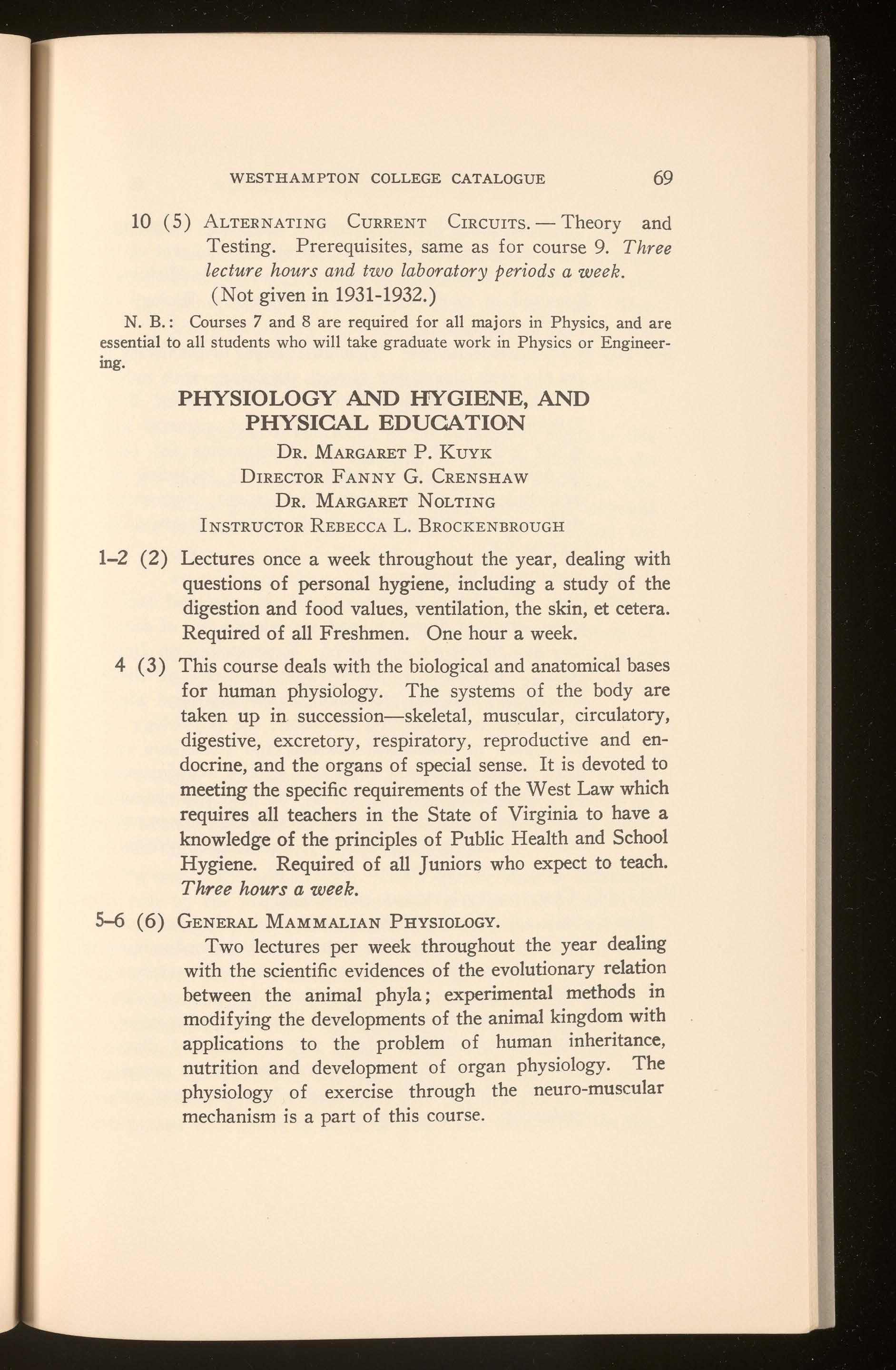
10 (5) ALTERNATING CURRENT CIRCUITS.-Theory and Testing. Prerequisites, same as for course 9. Three lecture hours and two laboratory periods a week. (Not given in 1931-1932.)
N. B.: Courses 7 and 8 are required for all majors in Physics, and are essential to all students who will take graduate work in Physics or Engineering.
DR. MARGARETP. KuYK
DIRECTORFANNY G. CRENSHAW
DR. MARGARETNOLTING
INSTRUCTORREBECCAL. BROCKENBROUGH
1-2 (2) Lectures once a week throughout the year, dealing with questions of personal hygiene, including a study of the digestion and food values, ventilation, the skin, et cetera. Required of all Freshmen. One hour a week.
4 ( 3) This course deals with the biological and anatomical bases for human physiology. The systems of the body are taken up in succession-skeletal, muscular, circulatory, digestive, excretory, respiratory, reproductive and endocrine, and the organs of special sense. It is devoted to meeting the specific requirements of the West Law which requires all teachers in the State of Virginia to have a knowledge of the principles of Public Health and School Hygiene. Required of all Juniors who expect to teach. Three hours a week.
5-6 (6) GENERALMAMMALIANPHYSIOLOGY.
Two lectures per week throughout the year dealing with the scientific evidences of the evolutionary relation between the animal phyla; experimental methods in modifying the developments of the animal kingdom with applications to the problem of human inheritance, nutrition and development of organ physiology. The physiology of exercise through the neuro-muscular mechanism is a part of this course.
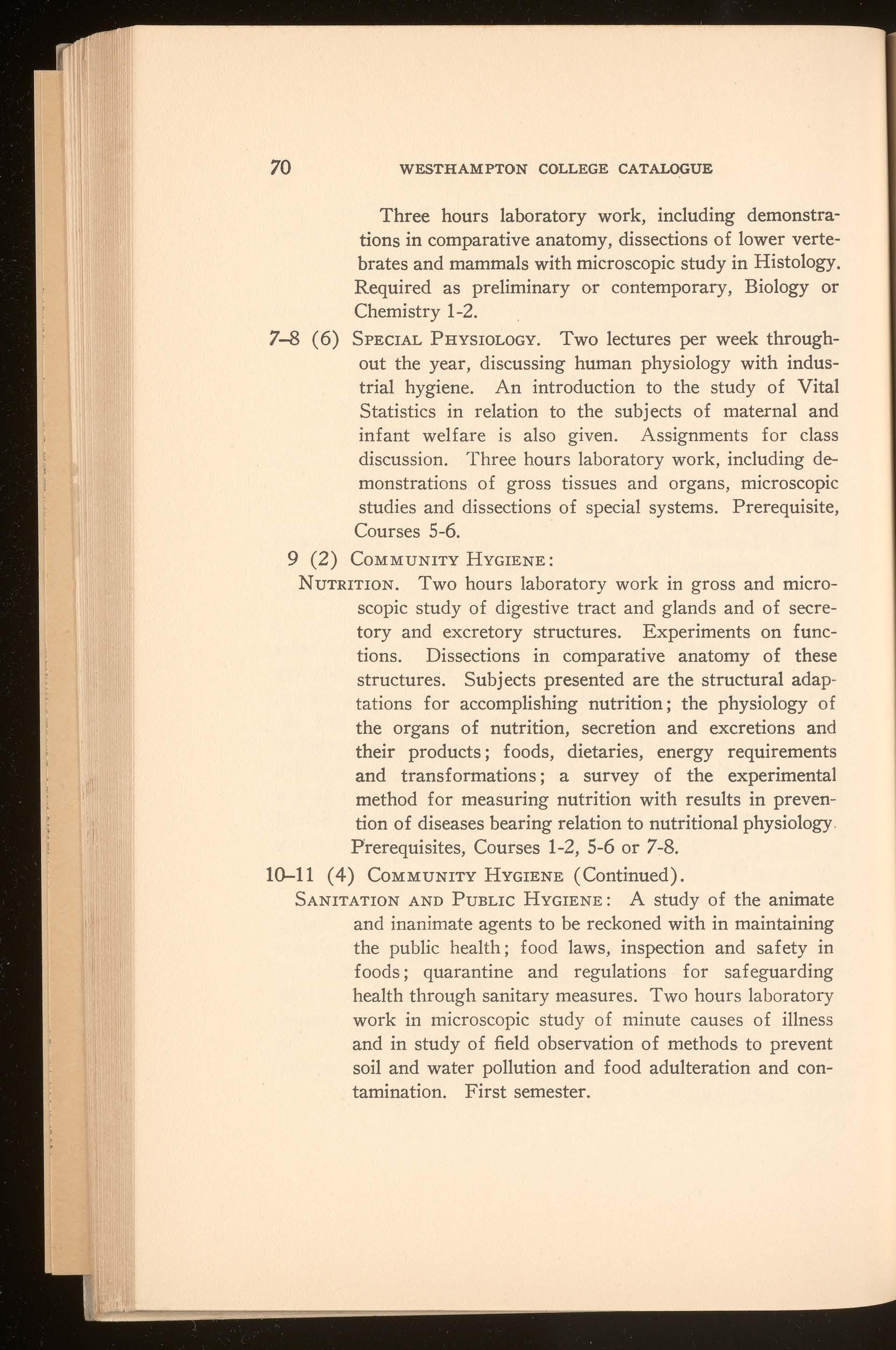
Three hours laboratory work, including demonstrations in comparative anatomy, dissections of lower vertebrates and mammals with microscopic study in Histology. Required as preliminary or contemporary, Biology or Chemistry 1-2.
7-8 (6) SPECIALPHYSIOLOGY.Two lectures per week throughout the year, discussing human physiology with industrial hygiene. An introduction to the study of Vital Statistics in relation to the subjects of maternal and infant welfare is also given. Assignments for class discussion. Three hours laboratory work, including demonstrations of gross tissues and organs, microscopic studies and dissections of special systems. Prerequisite, Courses 5-6.
9 (2) COMMUNITYHYGIENE:
NUTRITION. Two hours laboratory work in gross and microscopic study of digestive tract and glands and of secretory and excretory structures. Experiments on functions. Dissections in comparative anatomy of these structures. Subjects presented are the structural adaptations for accomplishing nutrition; the physiology of the organs of nutrition, secretion and excretions and their products; foods, dietaries, energy requirements and transformations; a survey of the experimental method for measuring nutrition with results in prevention of diseases bearing relation to nutritional physiology Prerequisites, Courses 1-2, 5-6 or 7-8.
10-11 (4) COMMUNITYHYGIENE (Continued).
SANITATIONAND PuBLIC HYGIENE: A study of the animate and inanimate agents to be reckoned with in maintaining the public health; food laws, inspection and safety in foods; quarantine and regulations for safeguarding health through sanitary measures. Two hours laboratory work in microscopic study of minute causes of illness and in study of field observation of methods to prevent soil and water pollution and food adulteration and contamination. First semester.
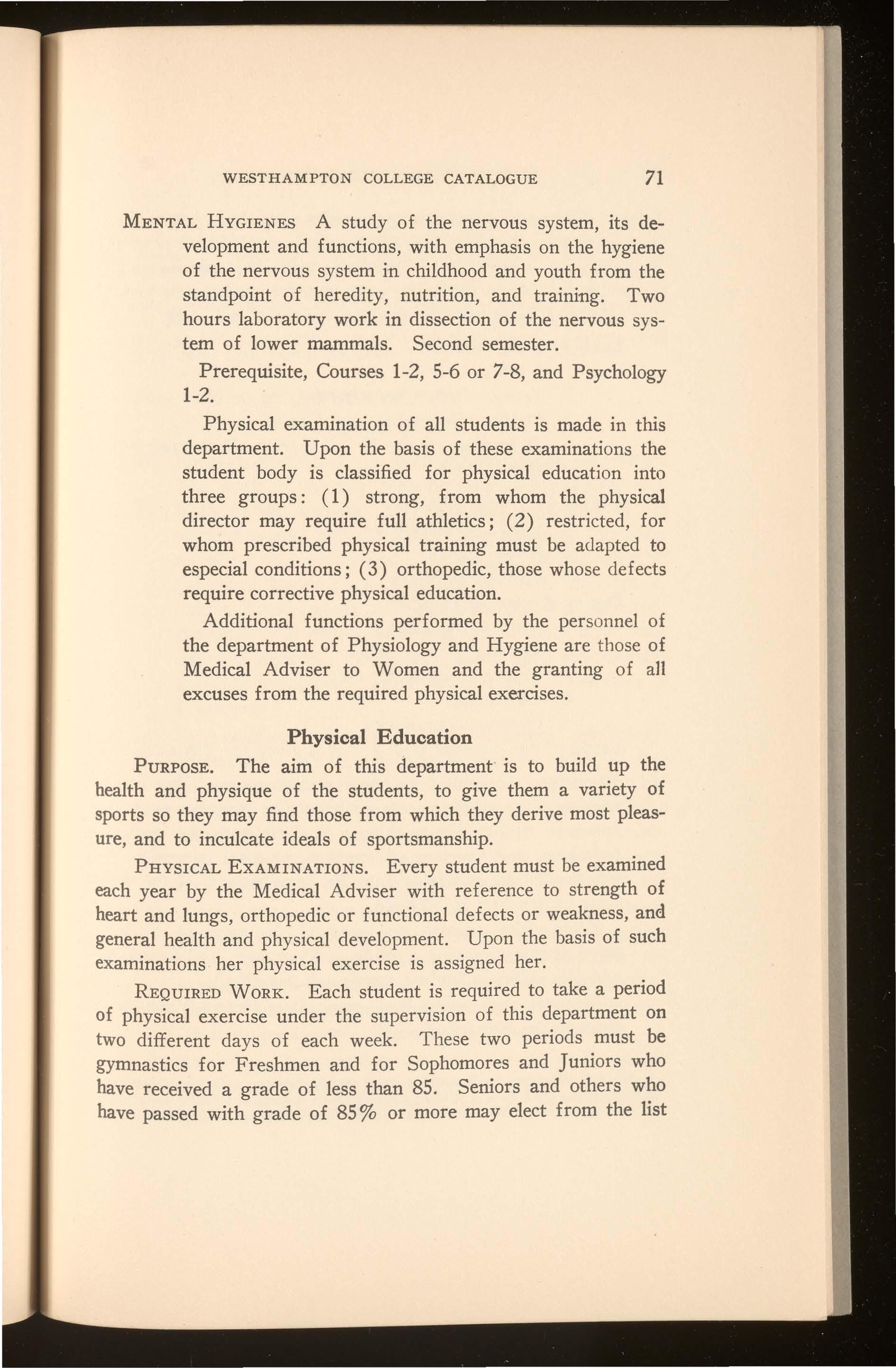
MENTAL HYGIENES A study of the nervous system, its development and functions, with emphasis on the hygiene of the nervous system in childhood and youth from the standpoint of heredity, nutrition, and training. Two hours laboratory work in dissection of the nervous system of lower mammals. Second semester.
Prerequisite, Courses 1-2, 5-6 or 7-8, and Psychology 1-2.
Physical examination of all students is made in this department. Upon the basis of these examinations the student body is classified for physical education into three groups : ( 1) strong, from whom the physical director may require full athletics; (2) restricted, for whom prescribed physical training must be adapted to especial conditions; ( 3) orthopedic, those whose defects require corrective physical education.
Additional functions performed by the pers onnel of the department of Physiology and Hygiene are those of Medical Adviser to Women and the granting of all excuses from the required physical exercises.
PURPOSE. The aim of this department is to build up the health and physique of the students, to give them a variety of sports so they may find those from which they derive most pleasure, and to inculcate ideals of sportsmanship.
PHYSICALEXAMINATIONS. Every student must be examined each year by the Medical Adviser with reference to strength of heart and lungs, orthopedic or functional defects or weakness, and general health and physical development. Upon the basis of such examinations her physical exercise is assigned her.
REQUIREDWORK. Each student is required to take a period of physical exercise under the supervision of this department on two different days of each week. These two periods must be gymnastics for Freshmen and for Sophomores and Juniors who have received a grade of less than 85. Seniors and others who have passed with grade of 85% or more may elect from the list

below. Those taking required gymnastics may elect sports. Resident students must take two additional periods which need not be under this supervision. Physically unfit students, when excused by the college physician, must observe special rest periods and substitute four additional semester hours for this work.
During the fall months :
1. Field Hockey.
2. Tennis-limited to those playing on class teams.
3. Outdoor Gymnastics and Games.
4. Swimming (at the Y. W. C. A. in Richmond with a special fee.)
During the winter months :
1. Indoor Gymnastics
2. Basketball.
3. Folk Dancing.
During the spring months :
1. Outdoor Basketball.
2. Track.
3. Tennis (class teams only).
4. Swimming.
5. Outdoor Gymnastics.
Credit of one semester hour a year is given for this work.
(2) ELECTIVE: Teaching of Physical Education. This course consists of one hour a week of lecture or practical work and one hour of practice teaching. It deals with the methods, technique, and practice of teaching physical education for school children, satisfying fully the requirements of the West Law for teachers in Virginia.
Prerequisite, passing one year of the required work in physical education with a grade of 85 or over, and knowledge and fair ability in hockey, tennis and basketball.
Students must secure their gymnasium bloomers and shoes through the department.
NoTE TO PARENTSOF STUDENTSON VARSITYSQUADS: Varsity athletics at Westhampton College is a student activity under a student athletic association. Because of the very small athletic fee, team trips are possible only through the
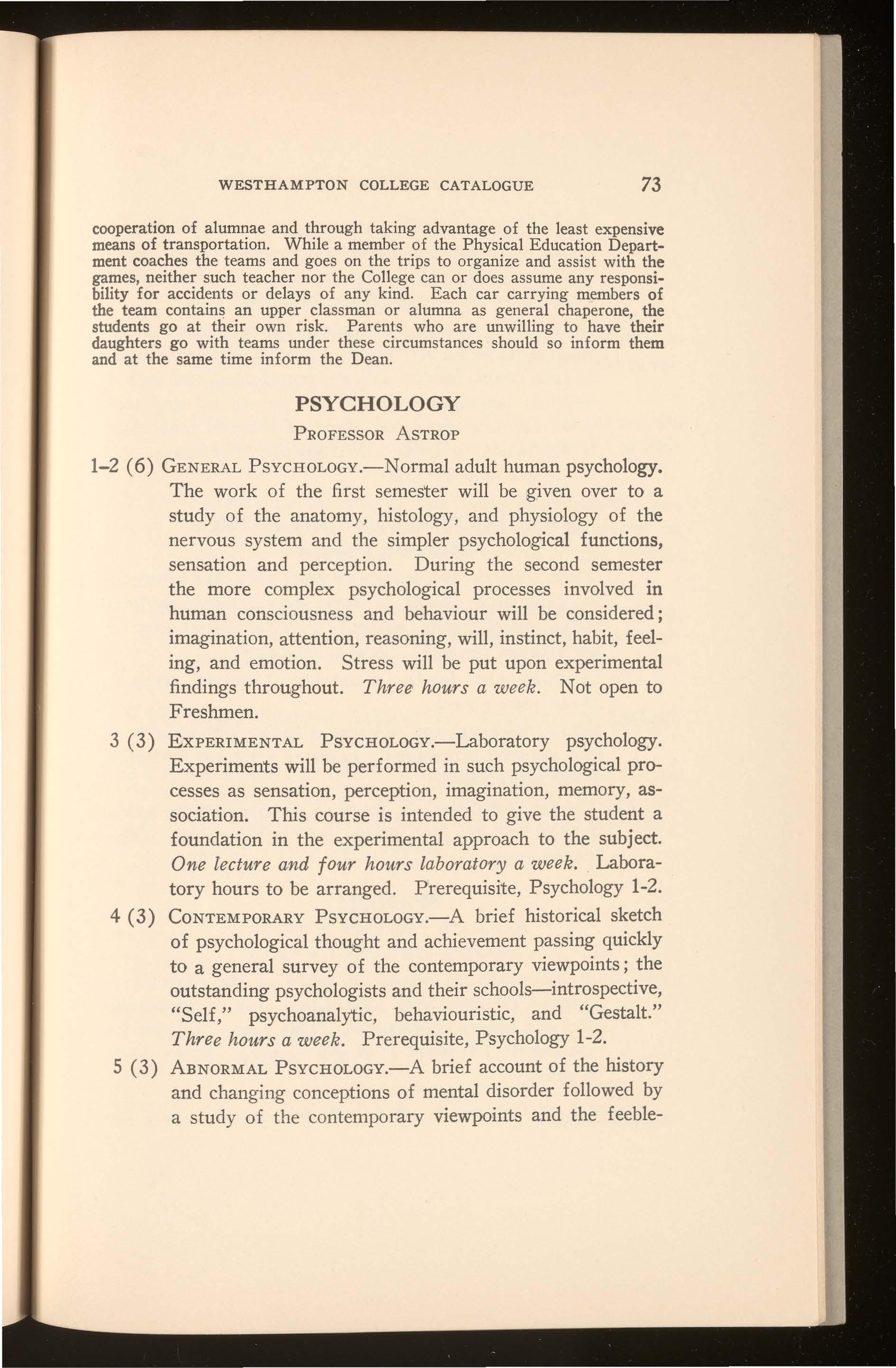
cooperation of alumnae and through taking advantage of the least expensive means of transportation. While a member of the Physical Education Department coaches the teams and goes on the trips to organize and assist with the games, neither such teacher nor the College can or does assume any responsibility for accidents or delays of any kind. Each car carrying members of the team contains an upper classman or alumna as general chaperone, the students go at their own risk. Parents who are unwilling to have their daughters go with teams under these circumstances should so inform them and at the same time inform the Dean.
PROFESSORASTROP
1-2 (6) GENERALPsYCHOLOGY.-Normal adult human psychology. The work of the first semester will be given over to a study of the anatomy, histology, and physiology of the nervous system and the simpler psychological functions, sensation and perception. During the second semester the more complex psychological processes involved in human consciousness and behaviour will be considered ; imagination, attention, reasoning, will, instinct, habit, feeling, and emotion. Stress will be put upon experimental findings throughout. Three hours a week. Not open to Freshmen.
3 ( 3) EXPERIMENTAL PsYCHOLOGY.-Laboratory psychology. Experiments will be performed in such psychological processes as sensation, perception, imagination, memory, associat10n. This course is intended to give the student a foundation in the experimental approach to the subject. One lecture and four hours laboratory a week. Laboratory hours to be arranged. Prerequisite, Psychology 1-2.
4 (3) CONTEMPORARYPsYCHOLOGY.-A brief historical sketch of psychological thought and achievement passing quickly to a general survey of the contemporary viewpoints; the outstanding psychologists and their schools-introspective, "Self," psychoanalytic, behaviouristic, and "Gestalt." Three hours a week. Prerequisite, Psychology 1-2.
5 ( 3) ABNORMALPsYCHOLOGY.-A brief account of the history and changing conceptions of mental disorder followed by a study of the contemporary viewpoints and the feeble-
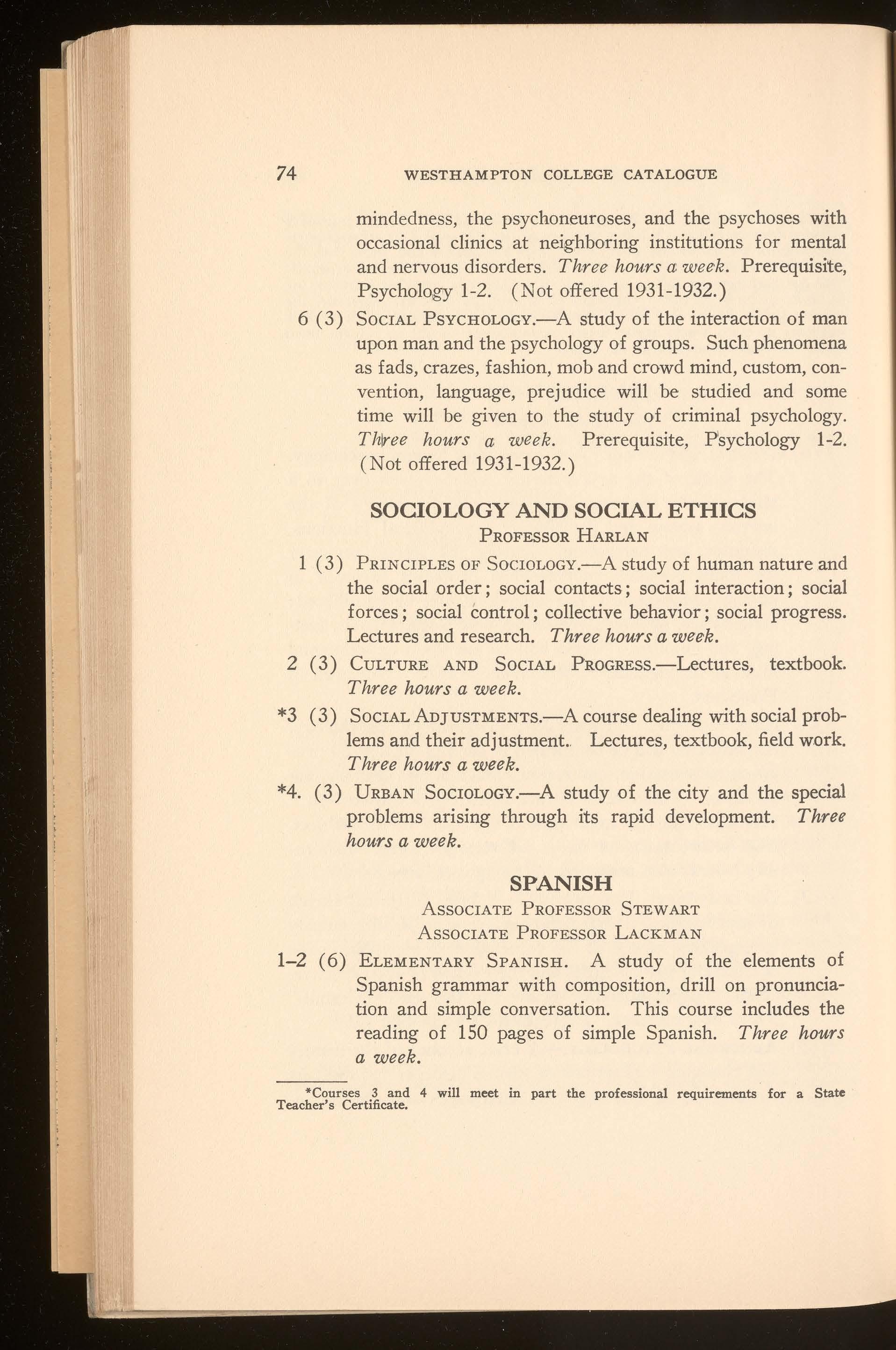
WESTHAMPTONCOLLEGECATALOGUE
mindedness, the psychoneuroses, and the psychoses with occasional clinics at neighboring institutions for mental and nervous disorders. Three hours a week. Prerequisite, Psychology 1-2. (Not offered 1931-1932.)
6 ( 3) SocIAL PsYCHOLOGY.-A study of the interaction of man upon man and the psychology of groups. Such phenomena as fads, crazes, fashion, mob and crowd mind, custom, convention, language, prejudice will be studied and some time will be given to the study of criminal psychology. Th!ree hours a week. Prerequisite, Psychology 1-2. (Not offered 1931-1932.)
PROFESSORHARLAN
1 ( 3) PRINCIPLESOF SocIOLOGY.-A study of human nature and the social order ; social contacts; social interaction; social forces; social control; collective behavior; social progress. Lectures and research. Three hours a week.
2 ( 3) CULTURE AND SocIAL PROGREss.-Lectures, textbook. Three hours a week.
*3 ( 3) SocIAL ADJUSTMENTs.-A course dealing with social problems and their adjustment.. Lectures, textbook, field work. Three hours a week.
*4. (3) URBAN SocroLOGY.-A study of the city and the special problems arising through its rapid development. Three hours a week.
ASSOCIATEPROFESSORSTEWART
ASSOCIATEPROFESSORLACKMAN
1-2 (6) ELEMENTARYSPANISH. A study of the elements of Spanish grammar with composition, drill on pronunciation and simple conversation. This course includes the reading of 150 pages of simple Spanish. Three hours a week.
*Courses 3 and 4 will meet in part the professional requirements for a State Teacher's Certificate.

3-4 (6) SPANISH READING AND CoMPOSITION. This course includes the reading of modern Spanish plays and novels, a thorough grammar review, composition and conversation. Three hours a week.
5 ( 3) DRAMAAND POETRYOF THE GOLDENAGE. Conducted in Spanish. Prerequisites, Courses 3-4 or their equivalent. Three hours a week.
6 (3) CERVANTES. An intensive study of Don Quijote and the Novelas Ejemplares. Prerequisites, Courses 3-4 or their equivalent. Three hours a week.
7 (3) SPANISH LITERATUREOF THE EARLY NINETEENTH CENTURY. Lectures, reading and reports. Conducted in Spanish. Prerequisite, Courses 5 and 6 or their equivalent. Three hours a week.
8 (3) MODERN AND CONTEMPORARYLITERATURE. Reading, lectures and reports. Conducted in Spanish. Prerequisite, Courses 5 and 6 or their equivalent. Three hours a week.
9 (3) EARLY SPANISH LITERATURE. Conducted in Spanish. Prerequisite, Courses 5 and 6 or their equivalent.
10 (3) ADVANCEDSPANISH COMPOSITIONAND PHONETICS. An intensive review of Spanish grammar and pronunciation and a study of the methods of presentation to elementary classes. Three hours a week.
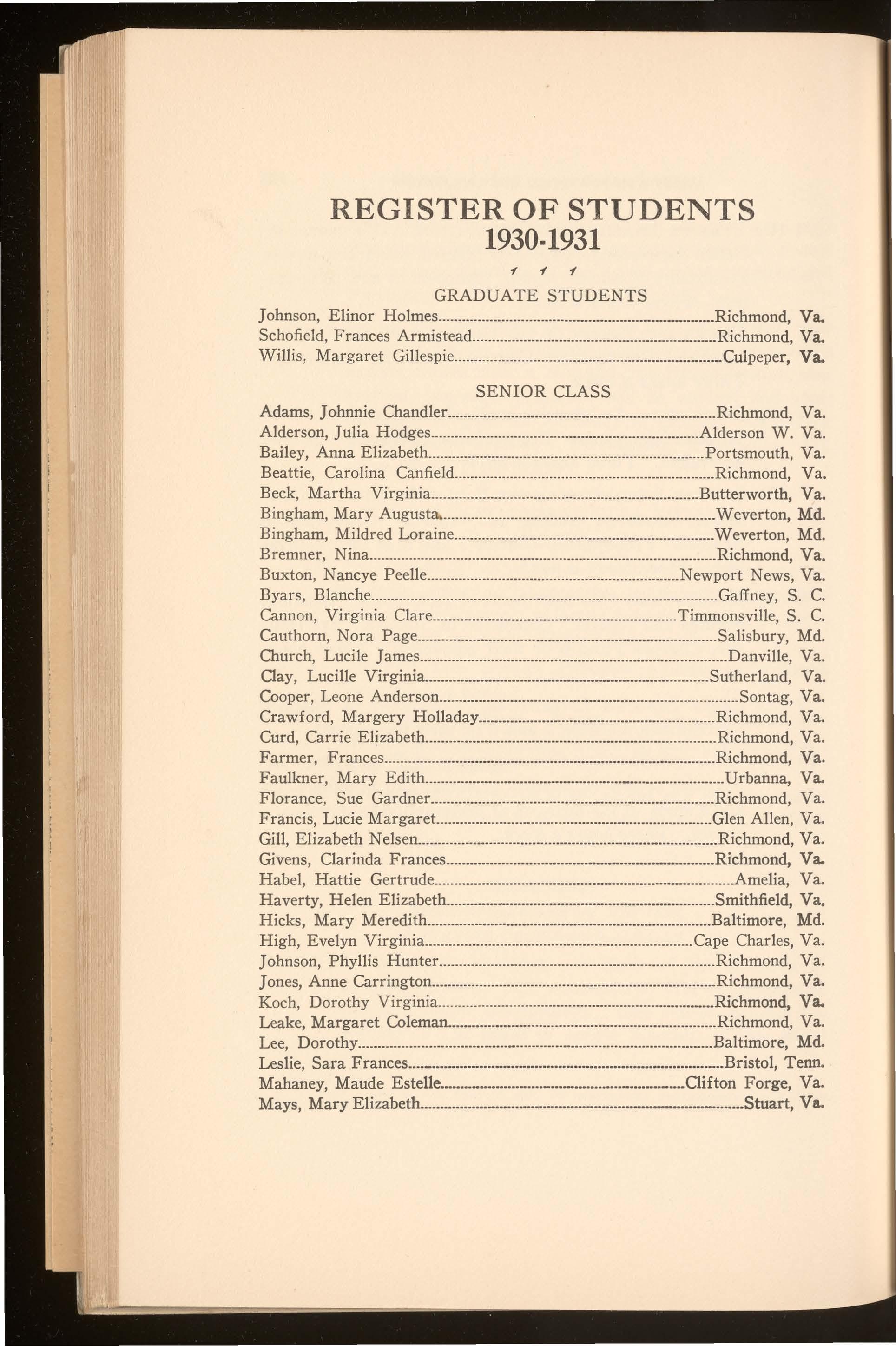
Johnson, Elinor Holmes Richmond, Va. Schofield, Frances Armistead Richmond, Va. Willis, Margaret Gillespie Culpeper, Va.
Adams, Johnnie Chandler Richmond, Va. Alderson, Julia Hodges
W. Va.
Bailey, Anna Elizabeth Portsmouth, Va. Beattie, Carolina Canfield Richmond, Va. Beck, Martha Virginia ....................................................................Butterworth, Va. Bingham, Mary Augusta. Weverton, Md. Bingham, Mildred Loraine Weverton, Md. Bremner, Nina Richmond, Va. Buxton, Nancye Peelle Newport News, Va. Byars, Blanche Gaffney, S. C. Cannon, Virginia Clare Timmonsville, S. C. Cauthorn, Nora Page
Md. Church, Lucile James ..............................................................................Danville, Va. Qay, Lucille Virginia. .......................................................................Sutherland, Va. Cooper, Leone Anderson Sontag, Va. Crawford, Margery Holladay Richmond, Va. Curd, Carrie Elizabeth Richmond, Va. Farmer, Frances Richmond, Va. Faulkner, Mary Edith
Va. Florance, Sue Gardner
Va. Francis, Lucie Margaret ......................................................................Glen Allen, Va. Gill, Elizabeth N elsen ..........................................................·-···············Richmond,Va. Givens, Clarinda Frances
Va. Habel, Hattie Gertrude
Va. Haverty, Helen Elizabeth
Va. Hicks, Mary Meredith
Md. High, Evelyn Virginia ....................................................................Cape Charles, Va. Johnson, Phyllis Hunter ......................................................................Richmond, Va. Jones, Anne Carrington Richmond, Va. Koch, Dorothy Virginia Richmond, Va. Leake, Margaret Coleman Richmond, Va. Lee, Dorothy ......................................................·······························-···Baltimore, Md. Leslie, Sara Frances
Tenn. Mahaney, Maude Estelle
Va.
Forge, Va. Mays, Mary Elizabeth.
McCrackan, Marylee·----···························-··························Richmond, Va.
Nuckols, Annie Ross
Nuckols, Sadie Aileen
Nunnally, J osephine
Osborne, Nancy Fontaine
Peers, Emma Virginia
Pettus, Virginia Rebecca..·-·
Rothschild, Selma Ruth
Royal, Edna May
Sanford, Ann Louise

Va.
Va.
Va.
Va.
Va.
Charleston, W. Va.
Va.
Md.
Schmidt, Louise Anna ----·---------····Richmond, Va.
Scott, Ida Elizabeth'----·······-····-····-------··Pocomoke City, Md.
Seay, Mary Catherine
Tatum, Mary Armstrong
Taylor, Laurretta
Taylor, Lucie May
Thornhill, Laura ...........................
Ullman, Amelia ..........
Bennett, Geneva Harding
Va.
, Va.
Va.
Va.
Va.
Va. SENIOR CLASS , 53
JUNIOR CLASS
Billings, Mary Elizabeth ....................
Va.
Va. Br own, Jodie Anne Richmond, Va. Brugh, Katherine Gray
Burns, Bessie Mae ·-
Campbell, Zephia N aomi......·----···········-······
Capitaine, Elizabeth Forrer Chapman
Richmond, Va.
, Va. Coen, Ruth Dunn
Va. Cole, Alize
Va. Cole, Ruth Cox Chilhowie, Va. Cone, Mary Elizabeth
Va. Coogler, Evelyn Virginia Brooksville, Fla. Davis, Marie Antoinette.
Va. Duncan, Evelyn Fitzgerald W a rrenton, Va. Dunn, Haz el L Burkeville, Va. Easley, Evelyn Oliver.. Bluefield, W. Va. Ferguson, Mildred Anne
ewsoms, Va. Fiske, Ruth Delia
Center , Vt. Flippo, Bertie Elizabeth
Va. Forsyth, Janet Elizabeth
Foskett, Katherine Lauder
Y.
Bridge, Va. Fugate Elizabeth.
Va.
Ga. Gardner, Evelyn Caroline